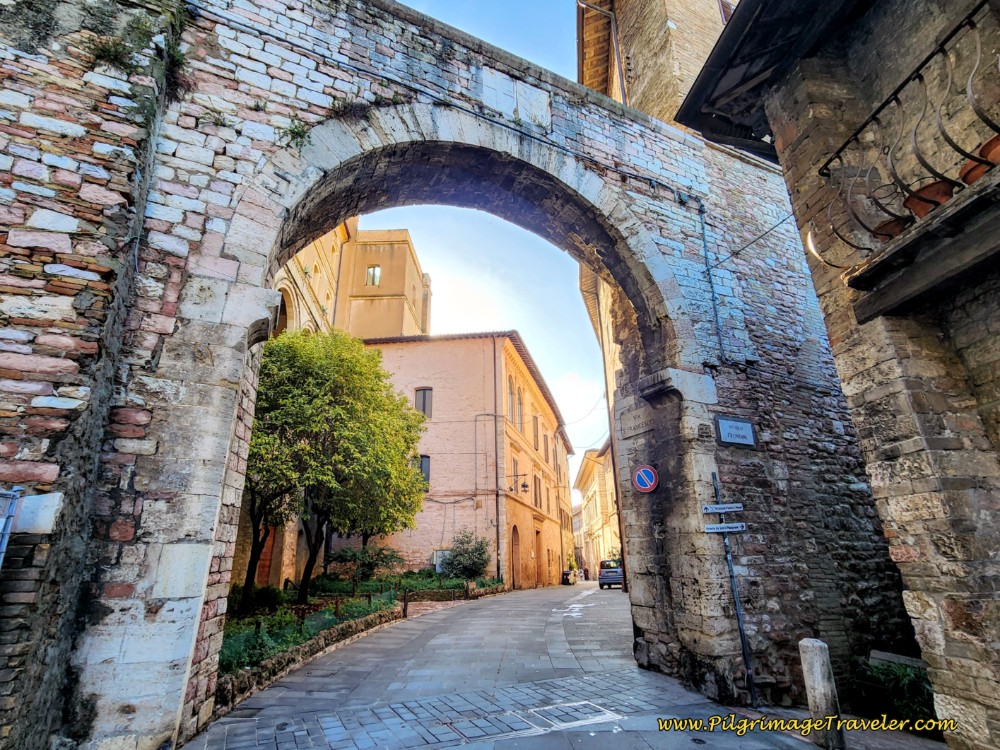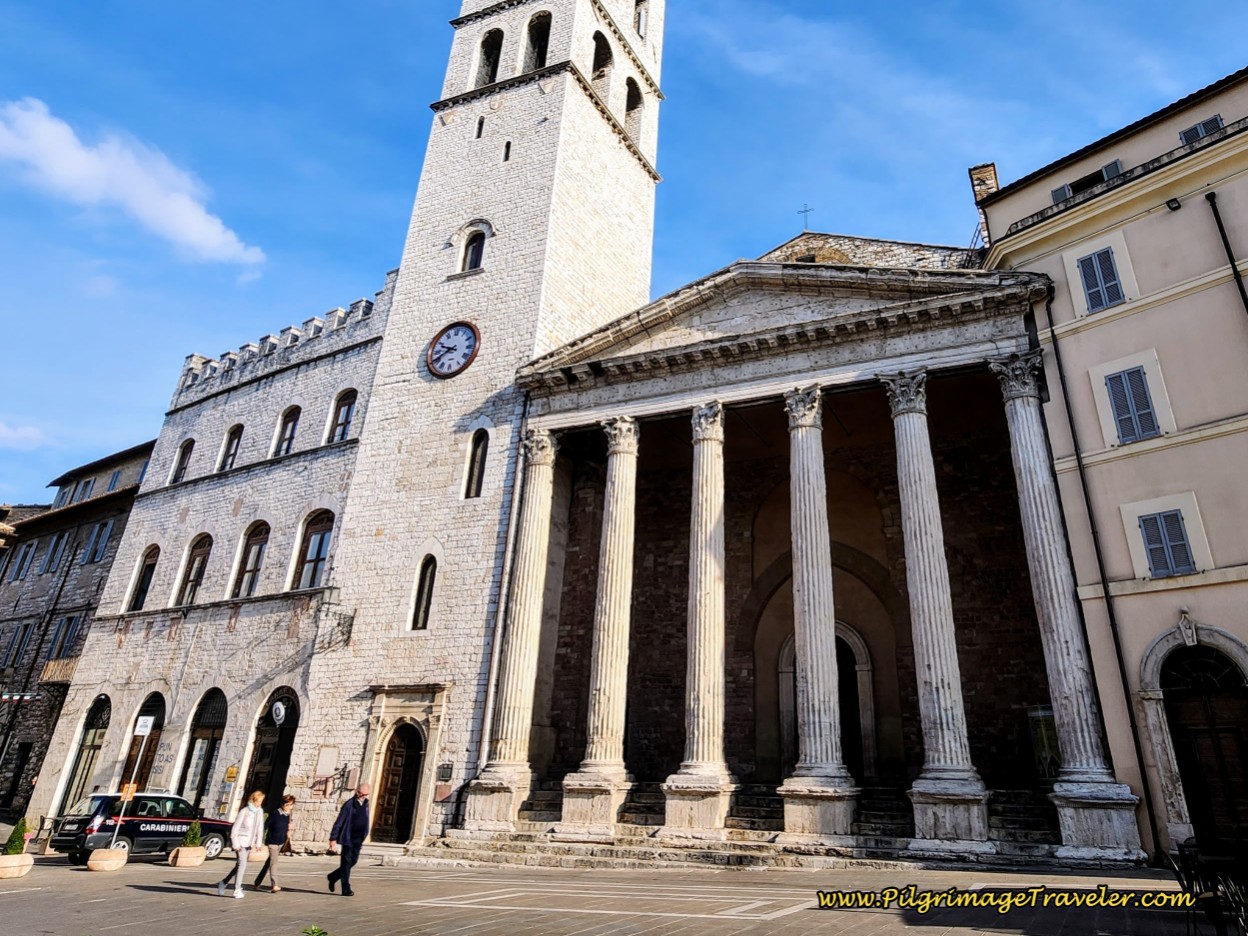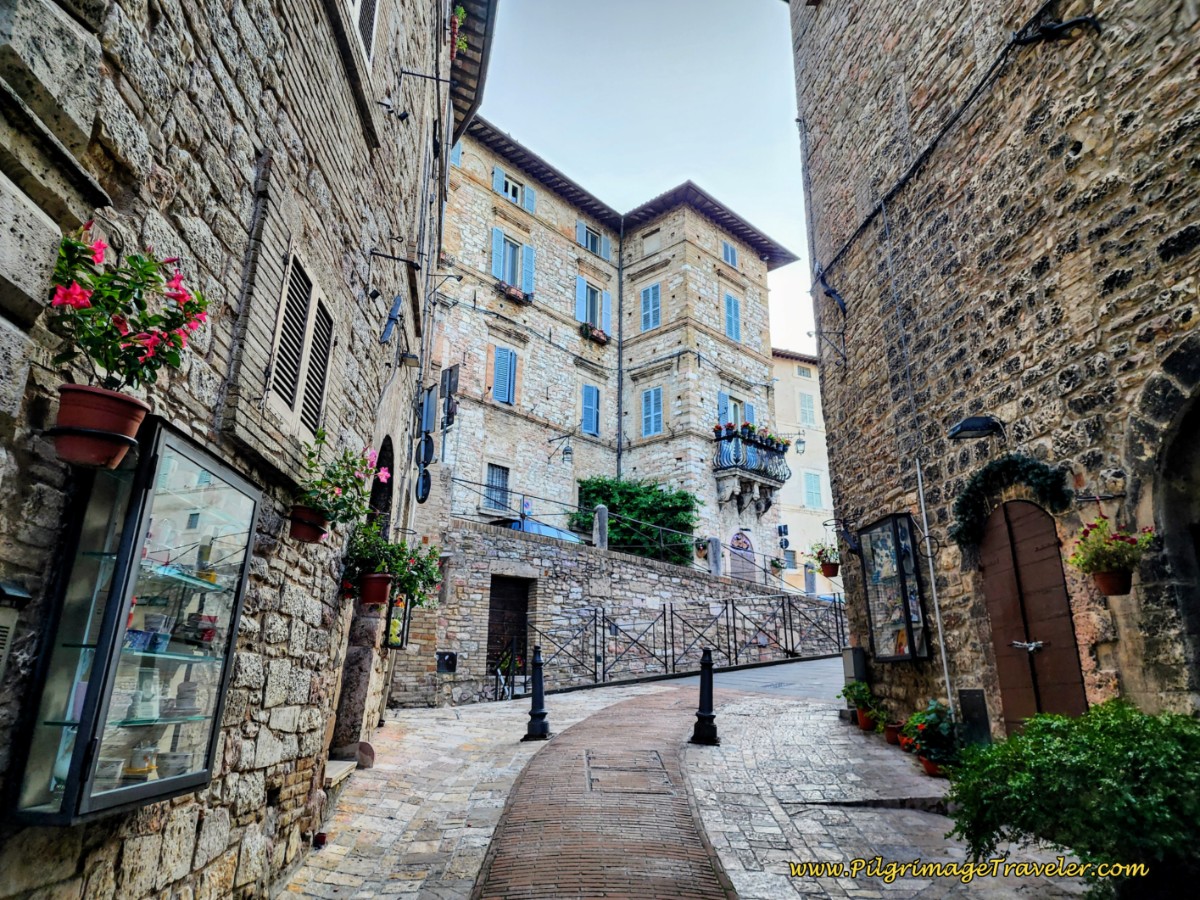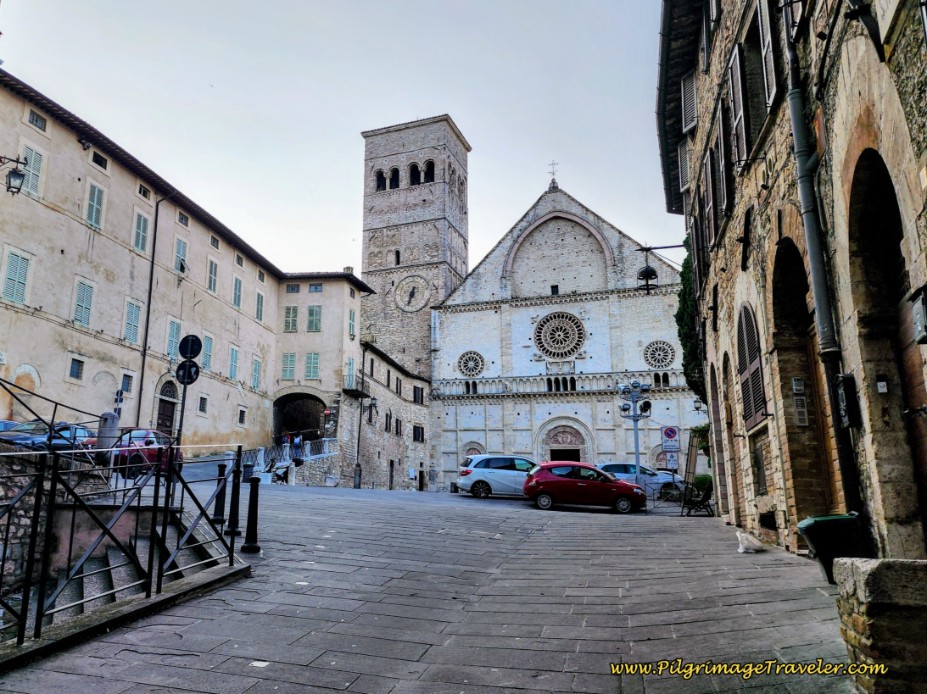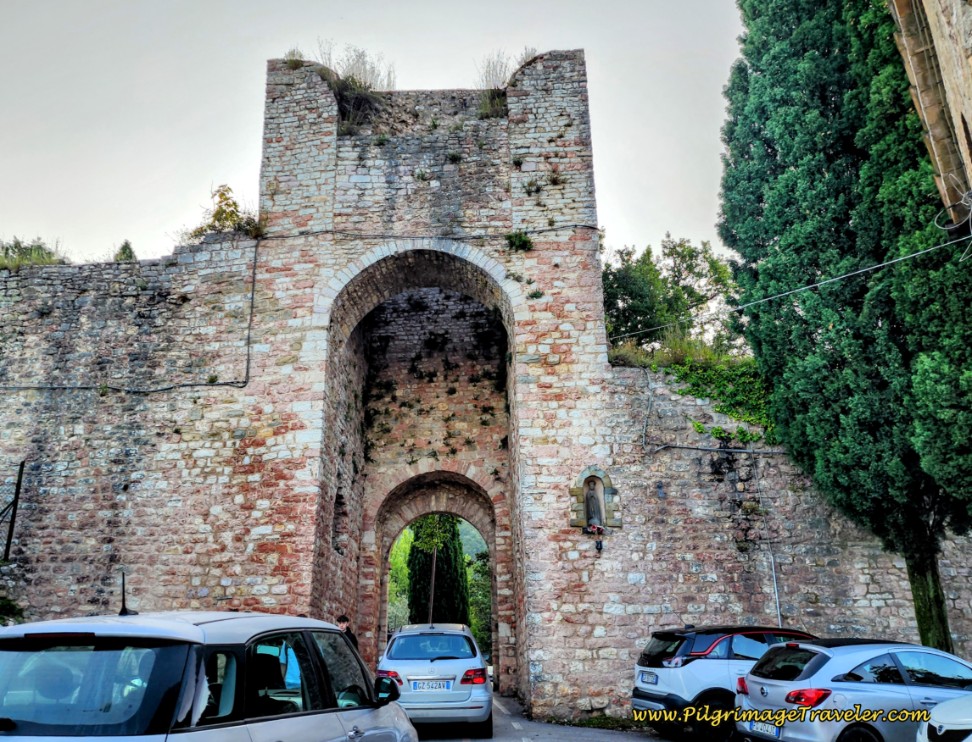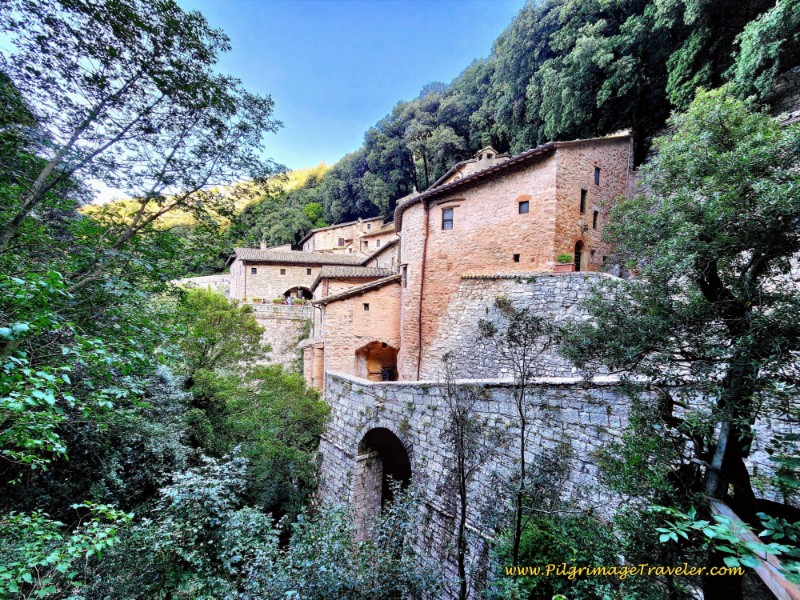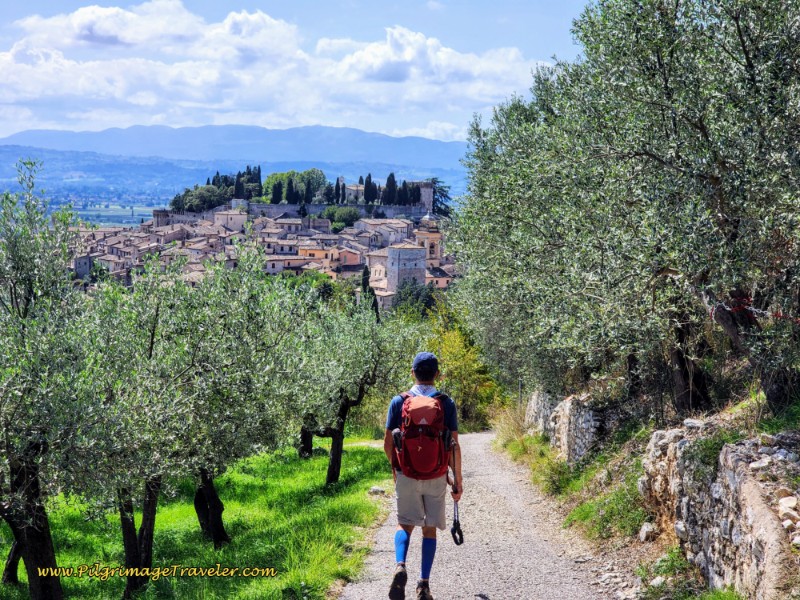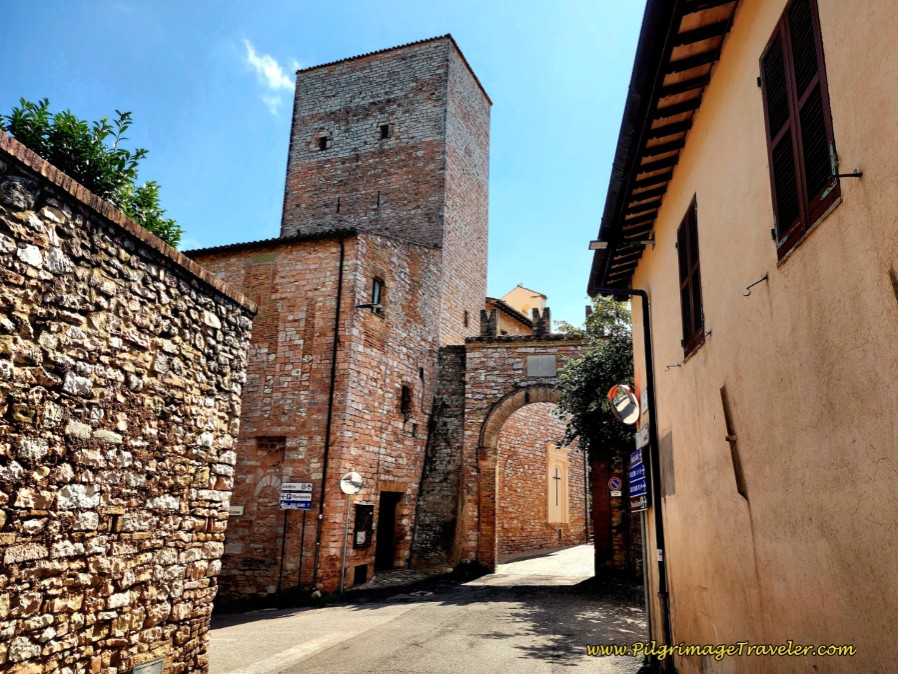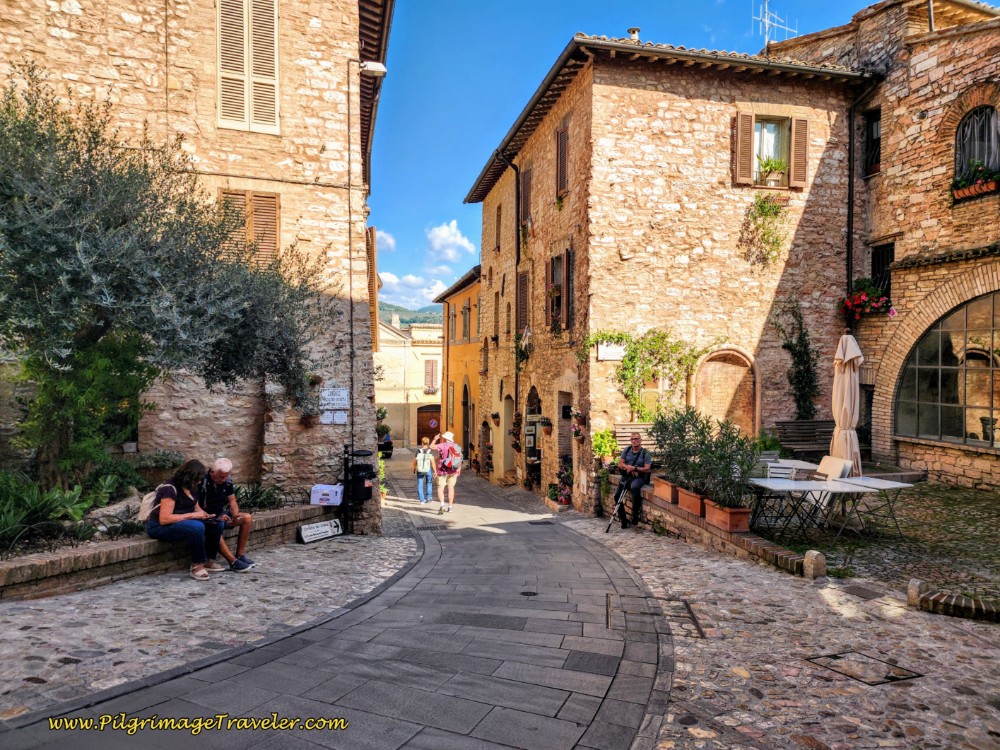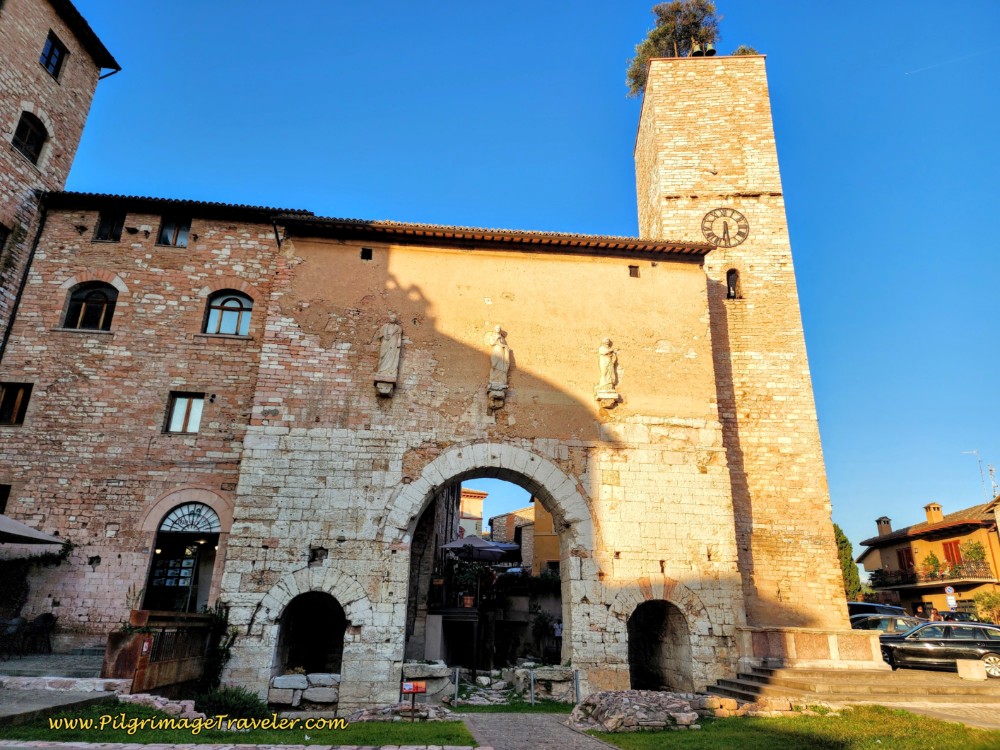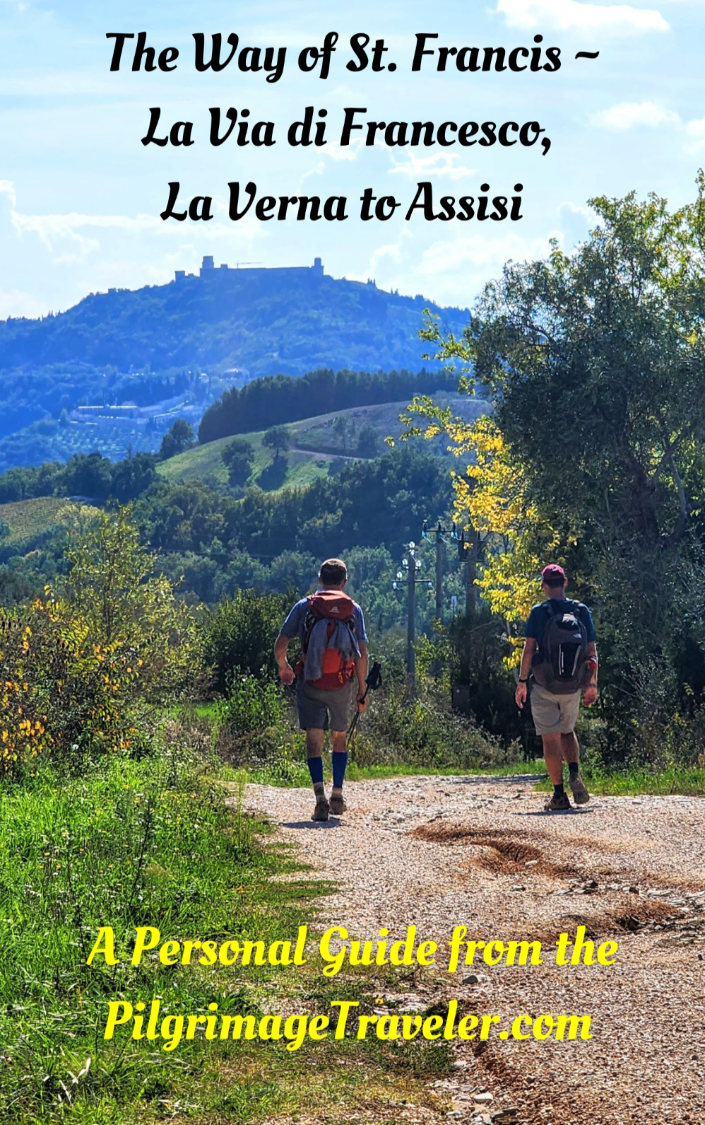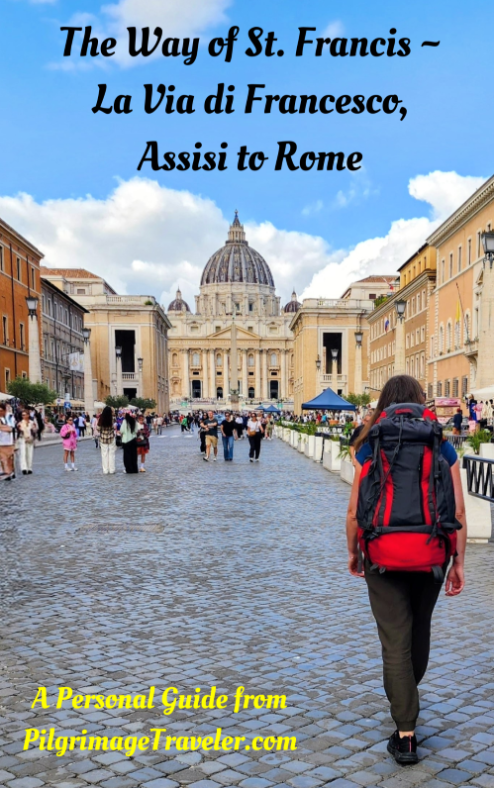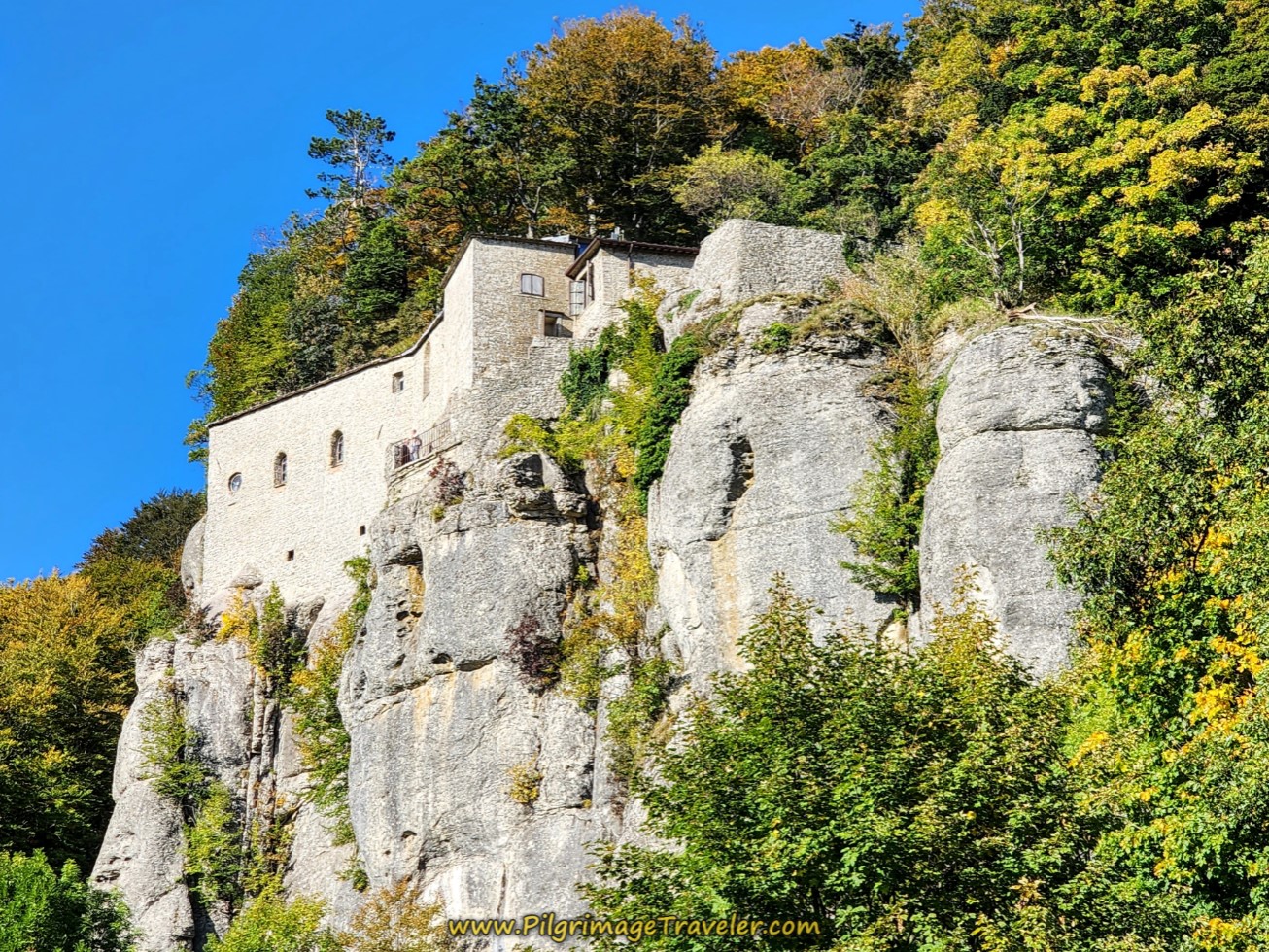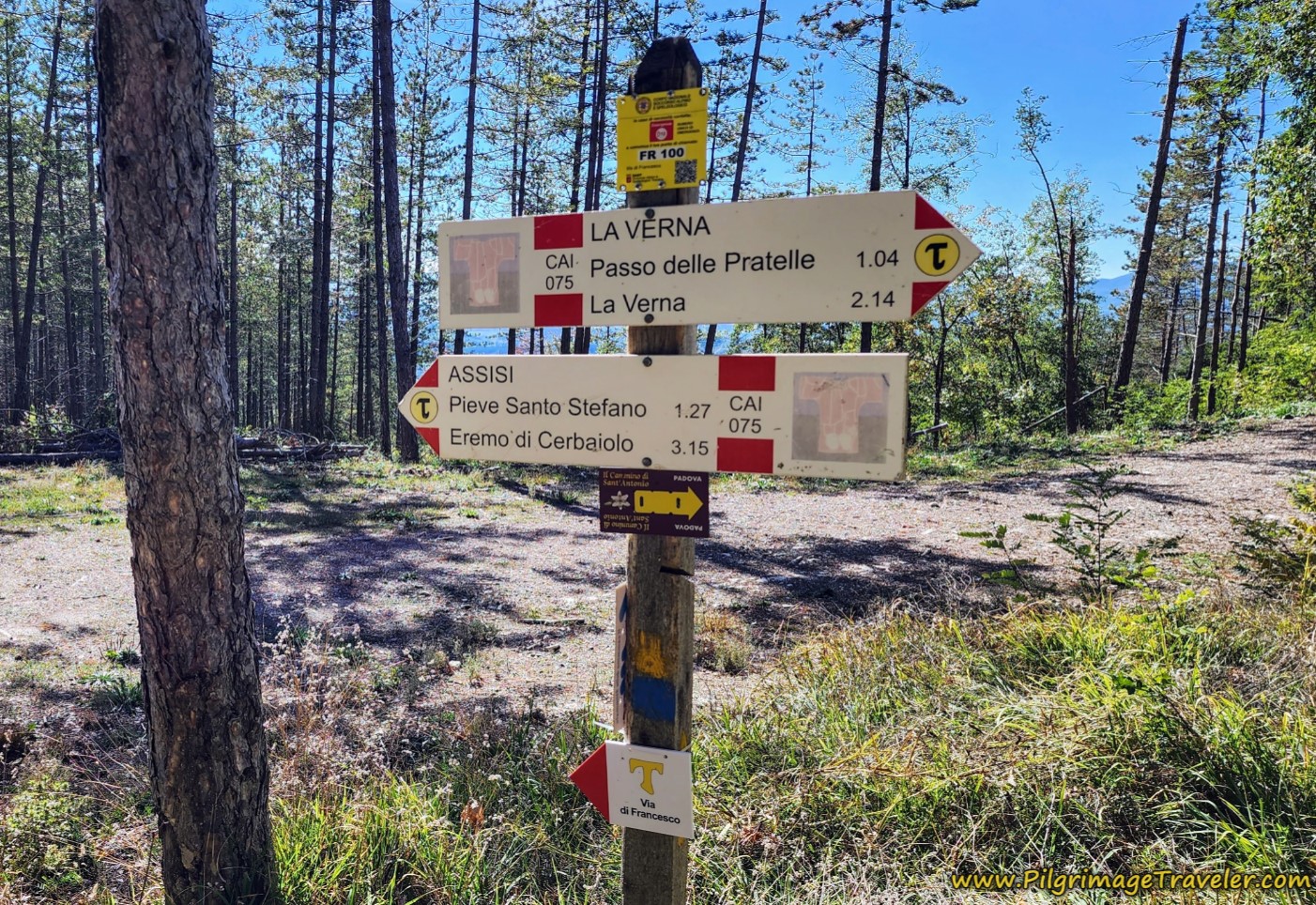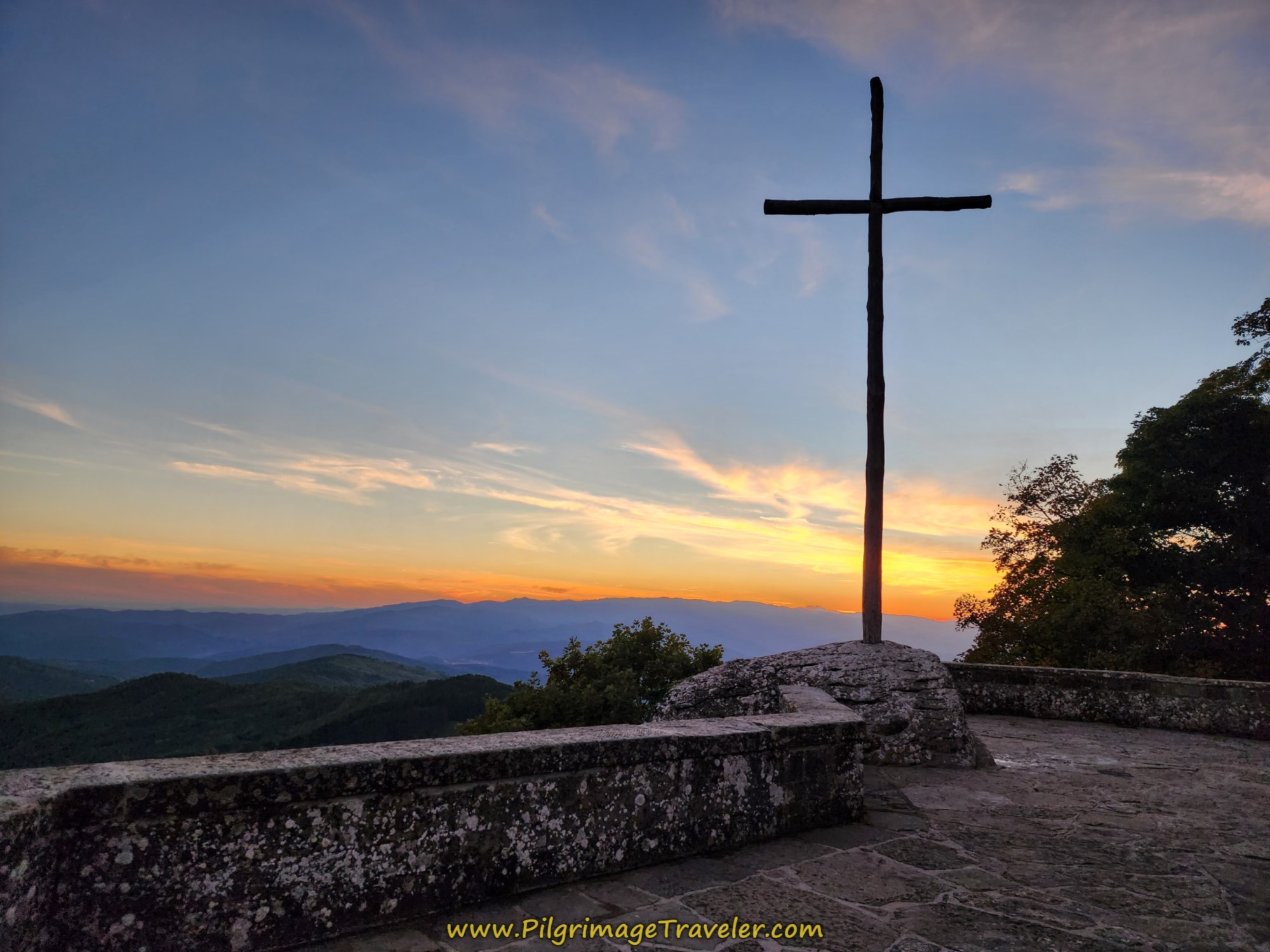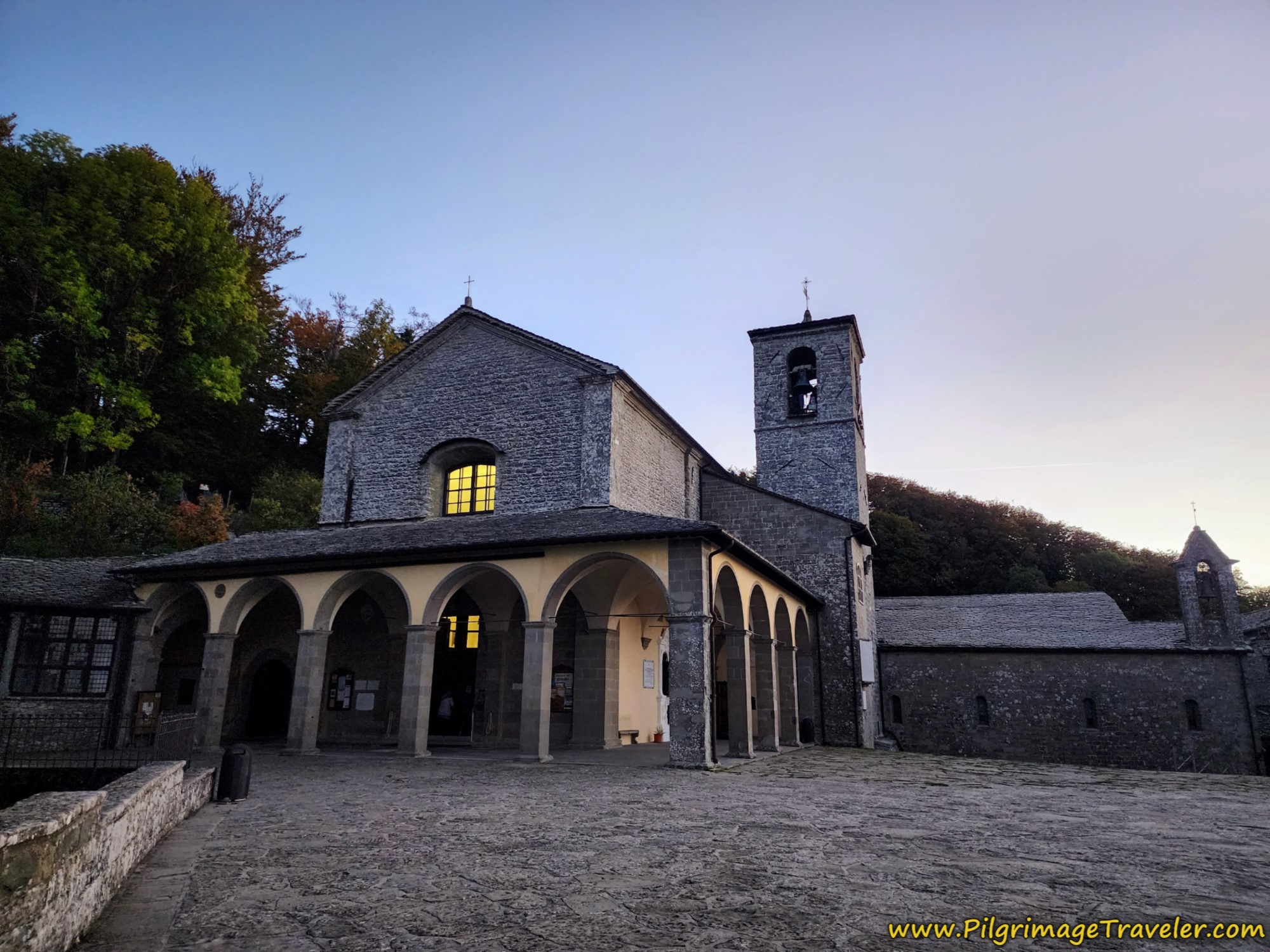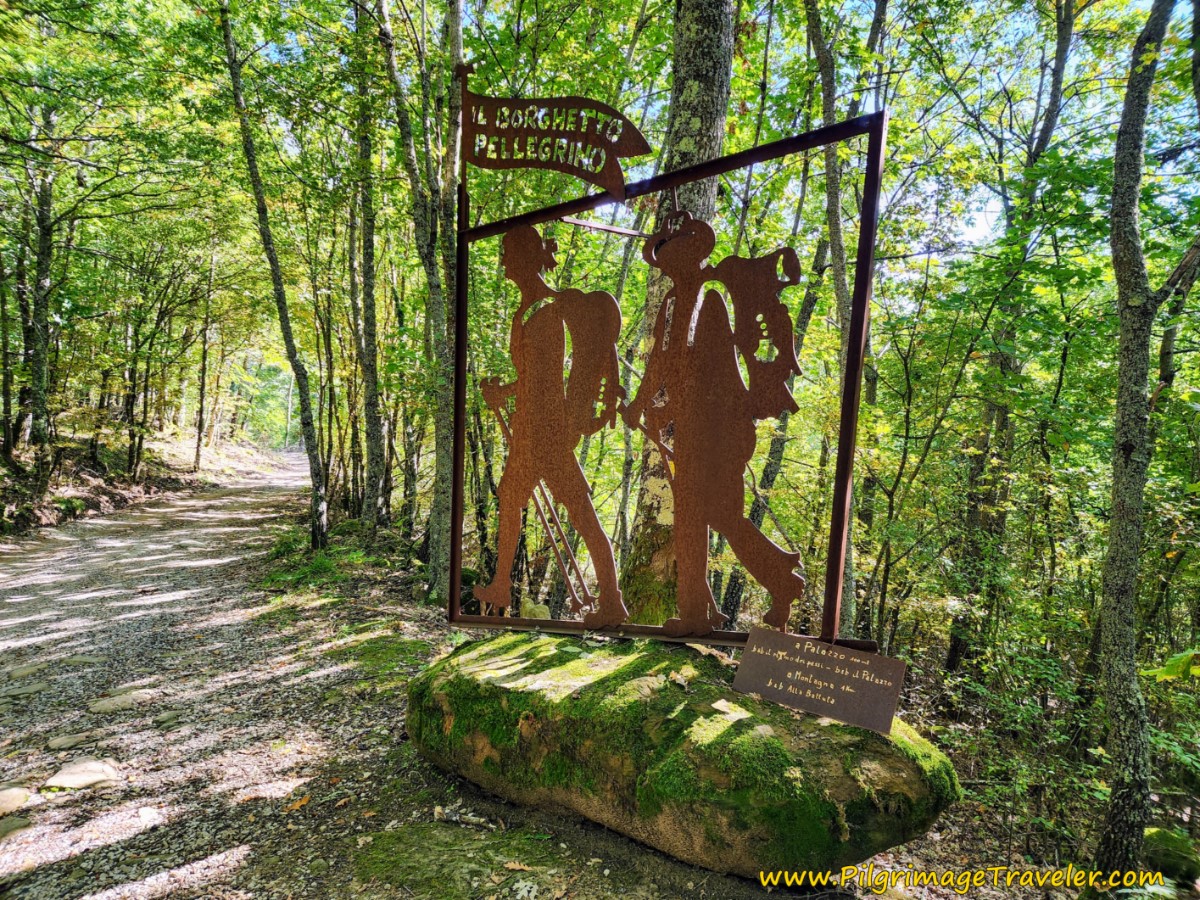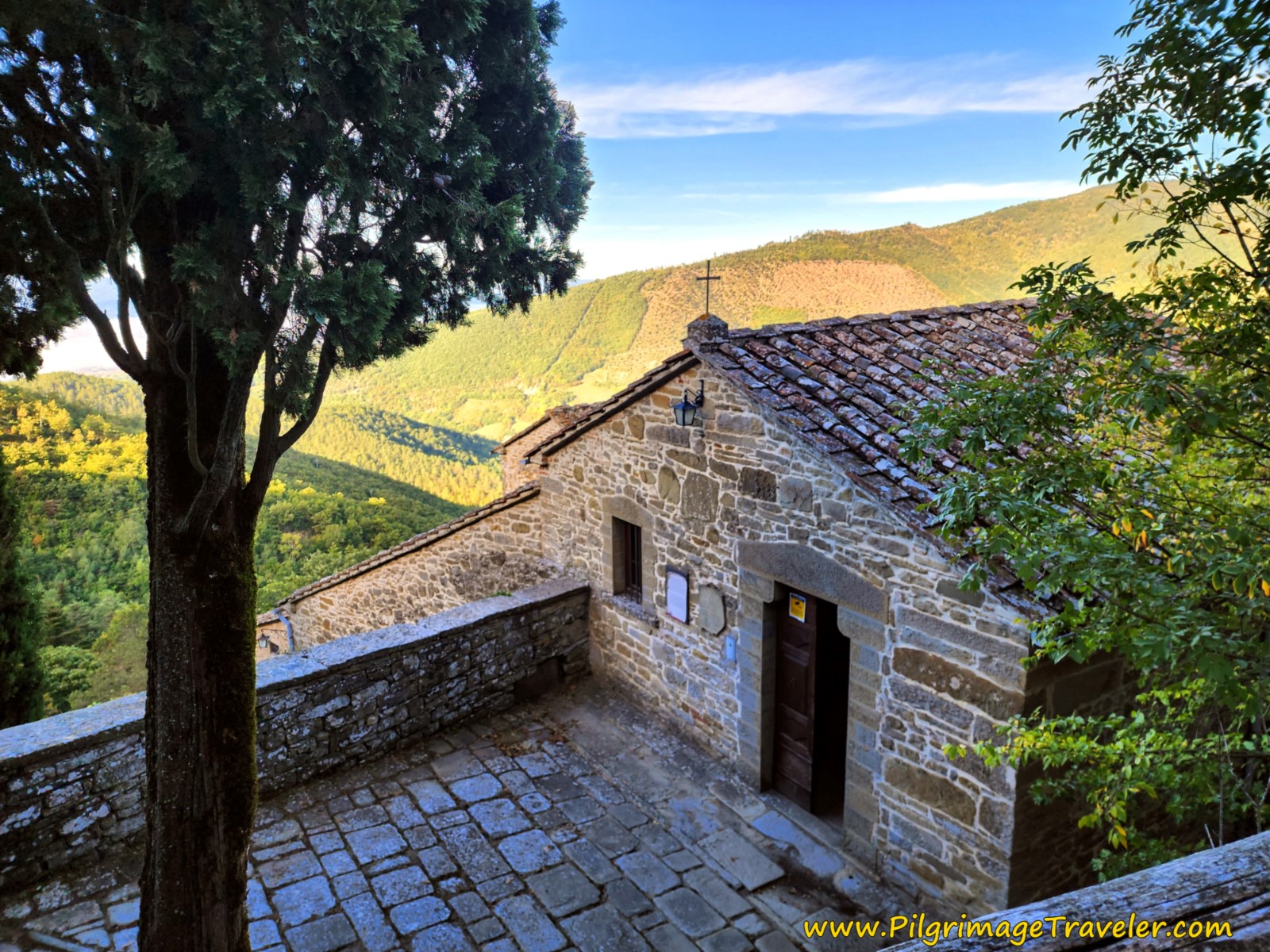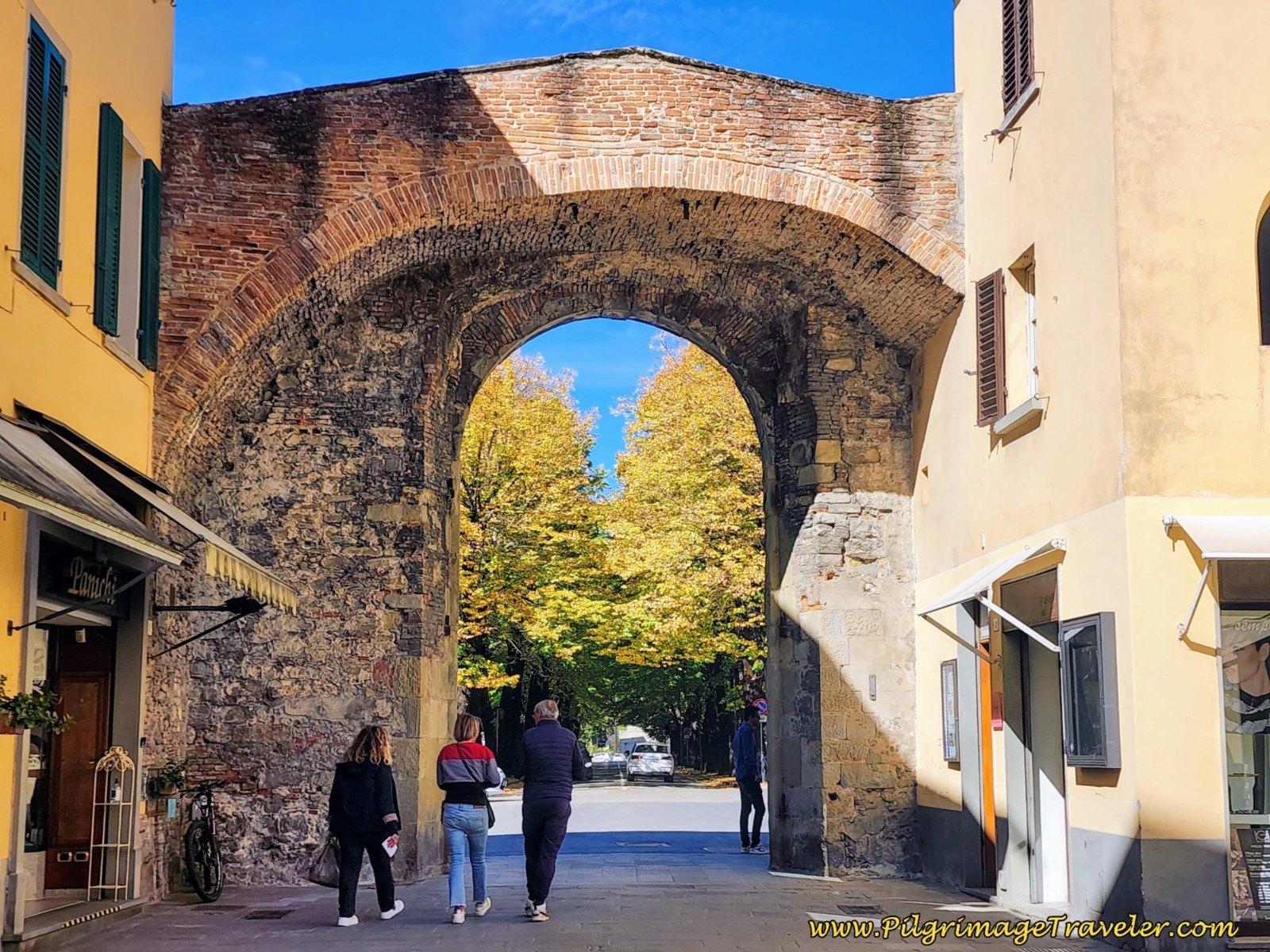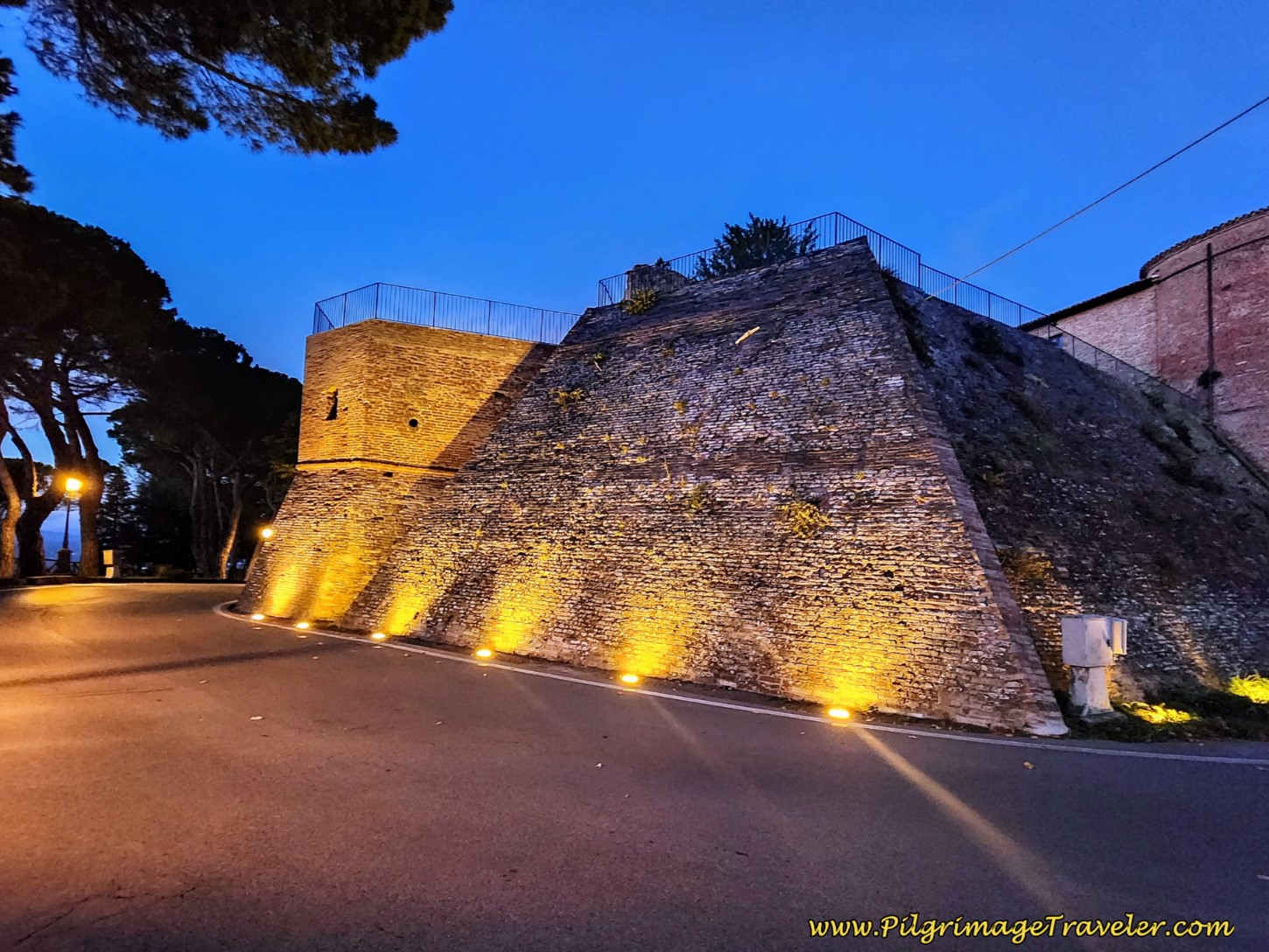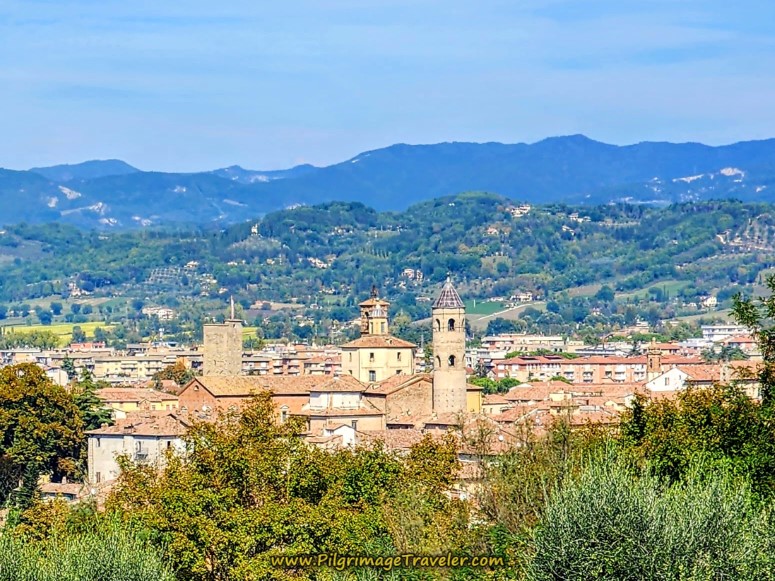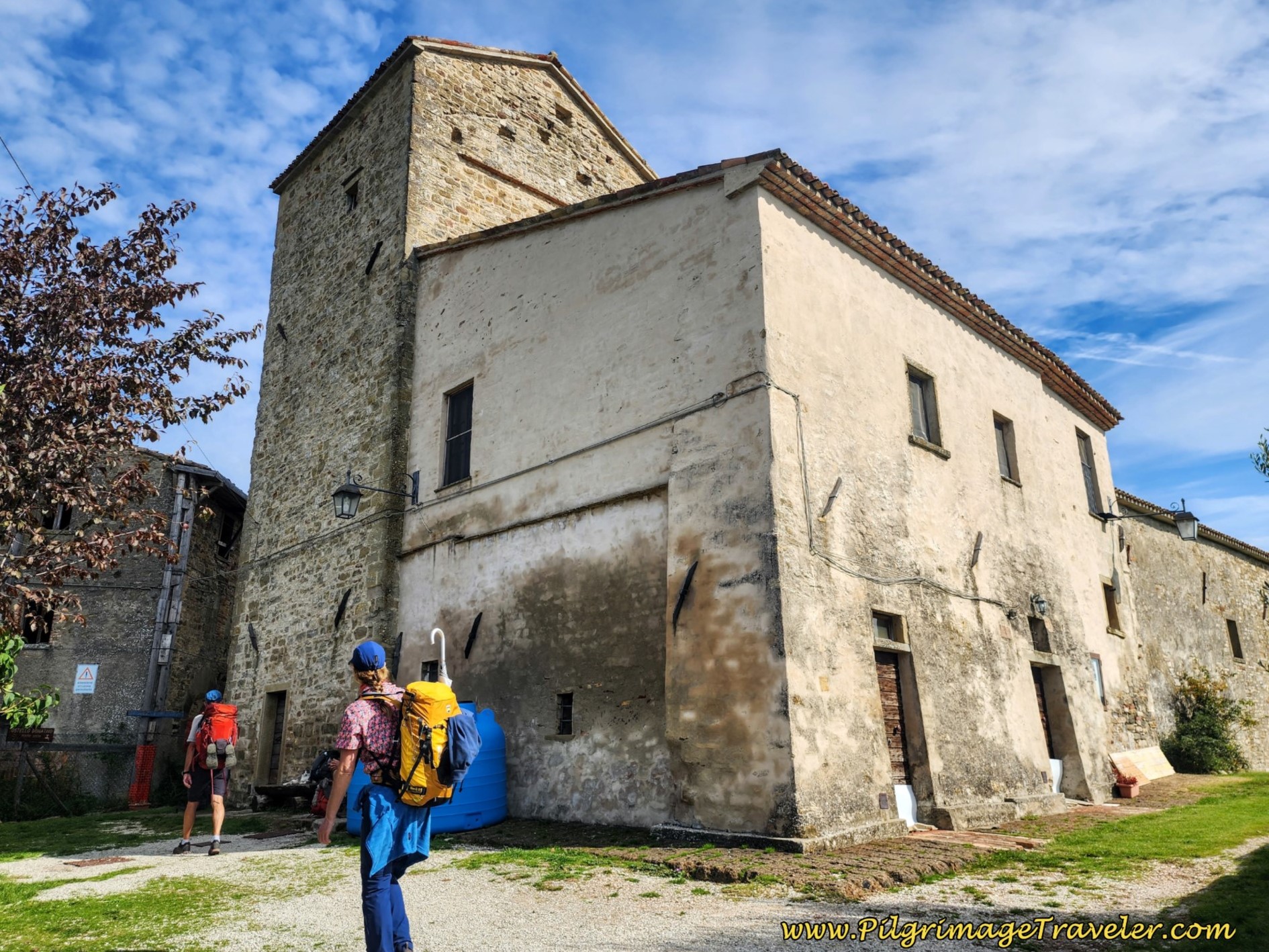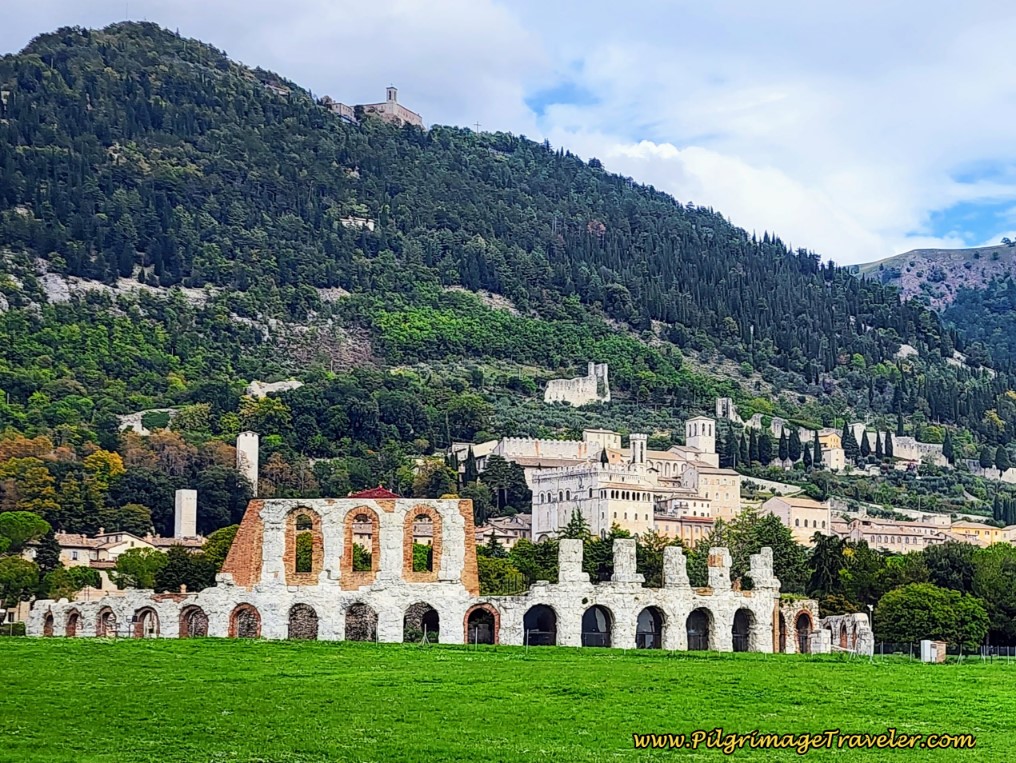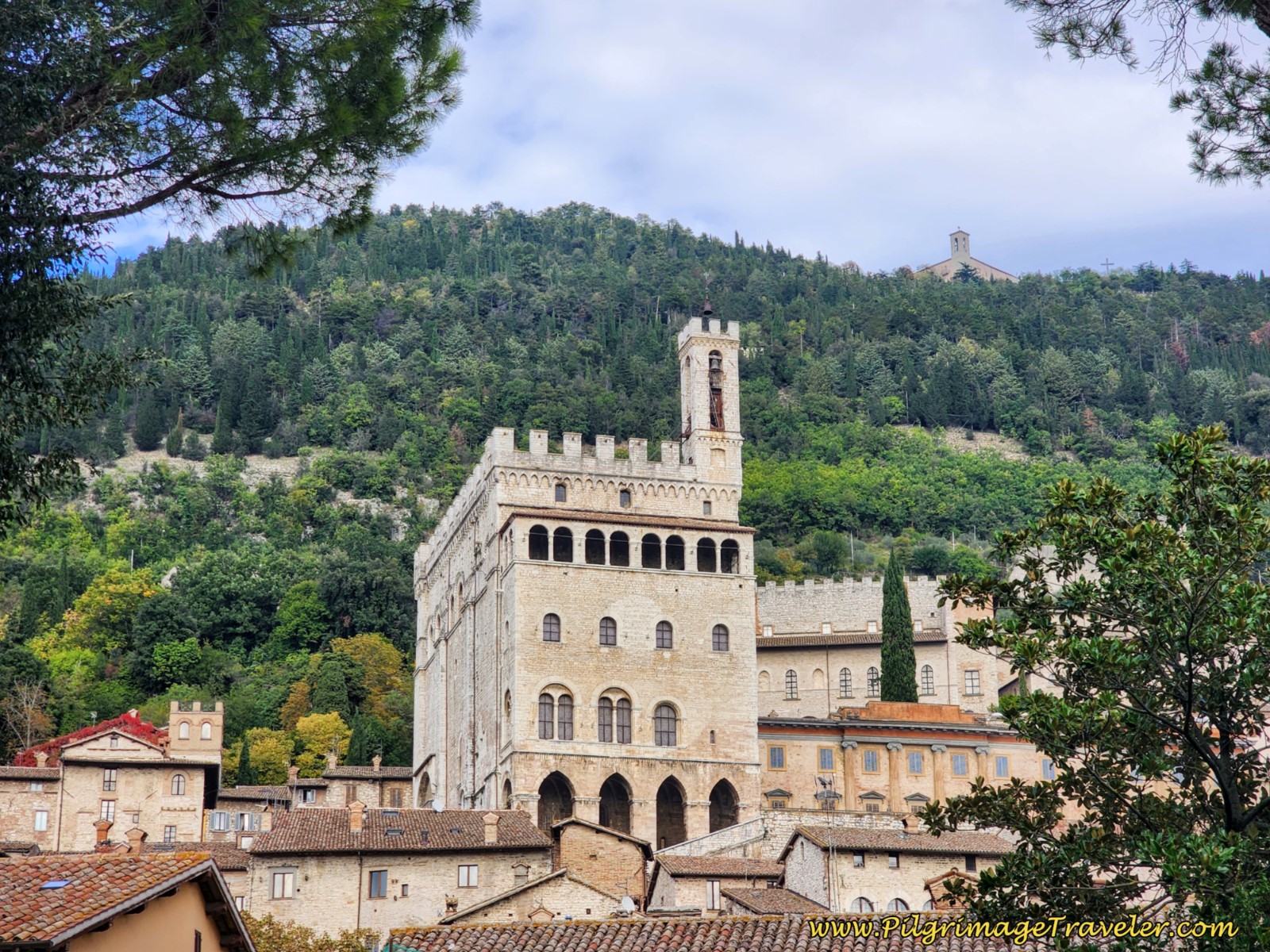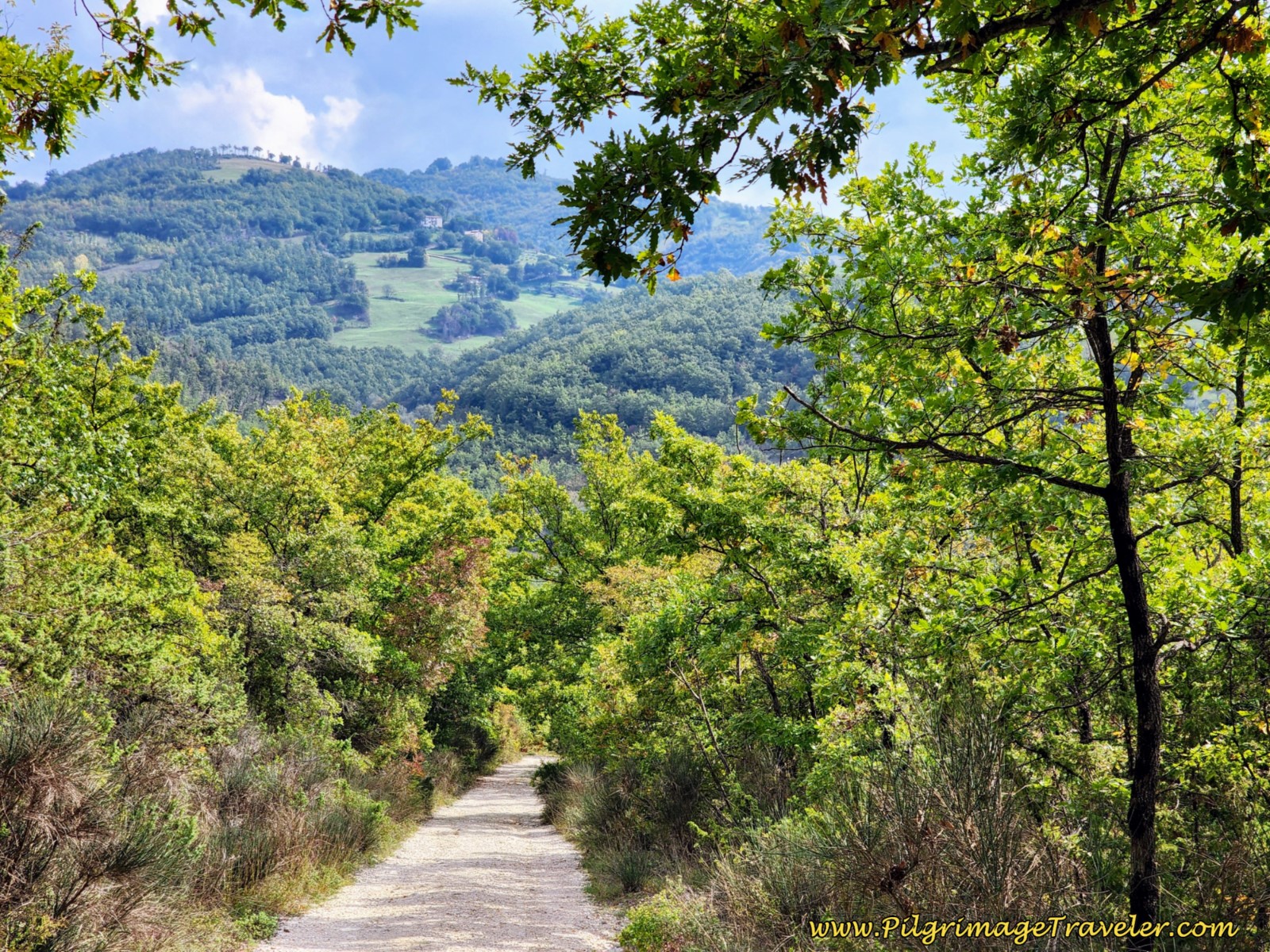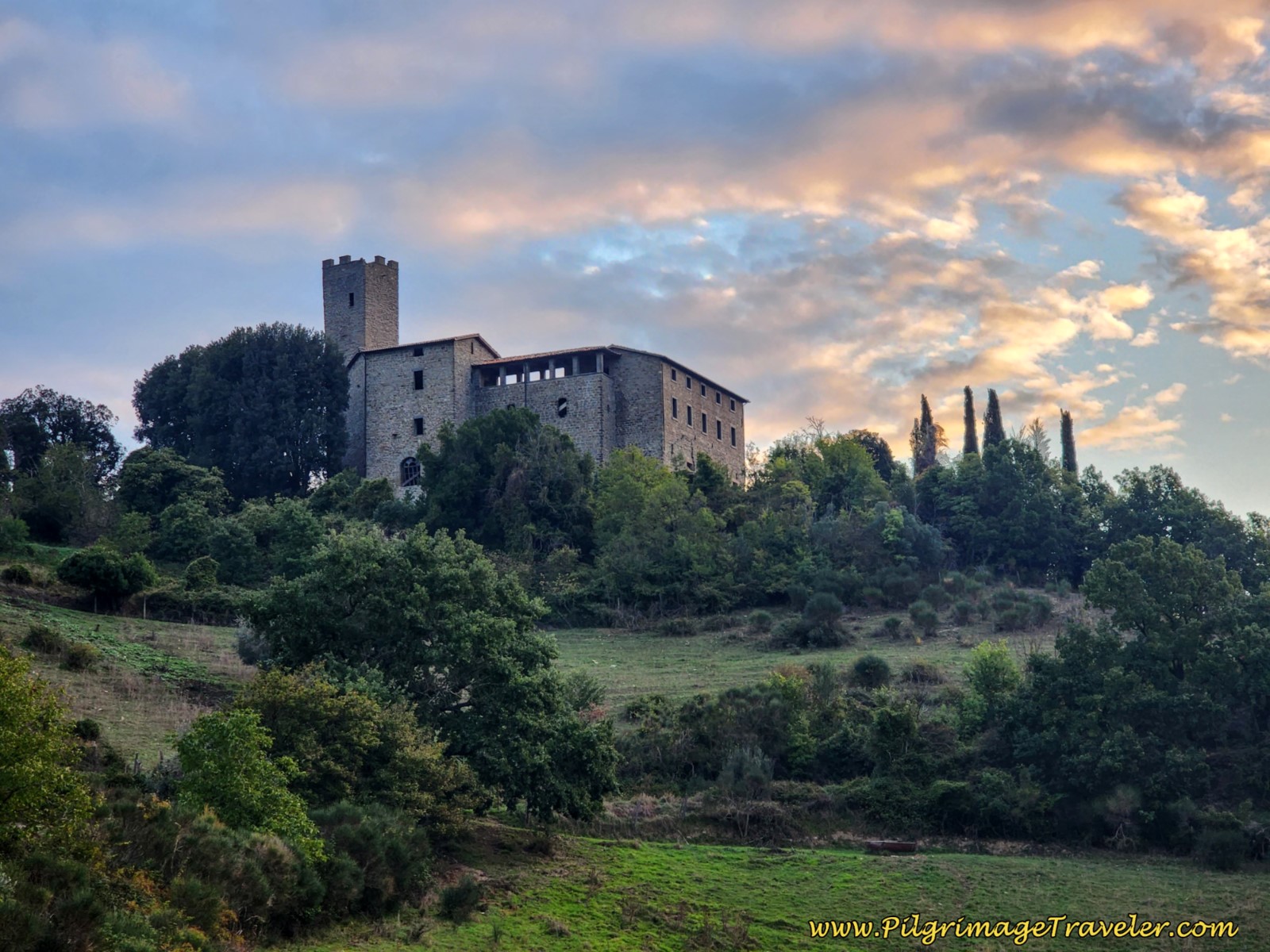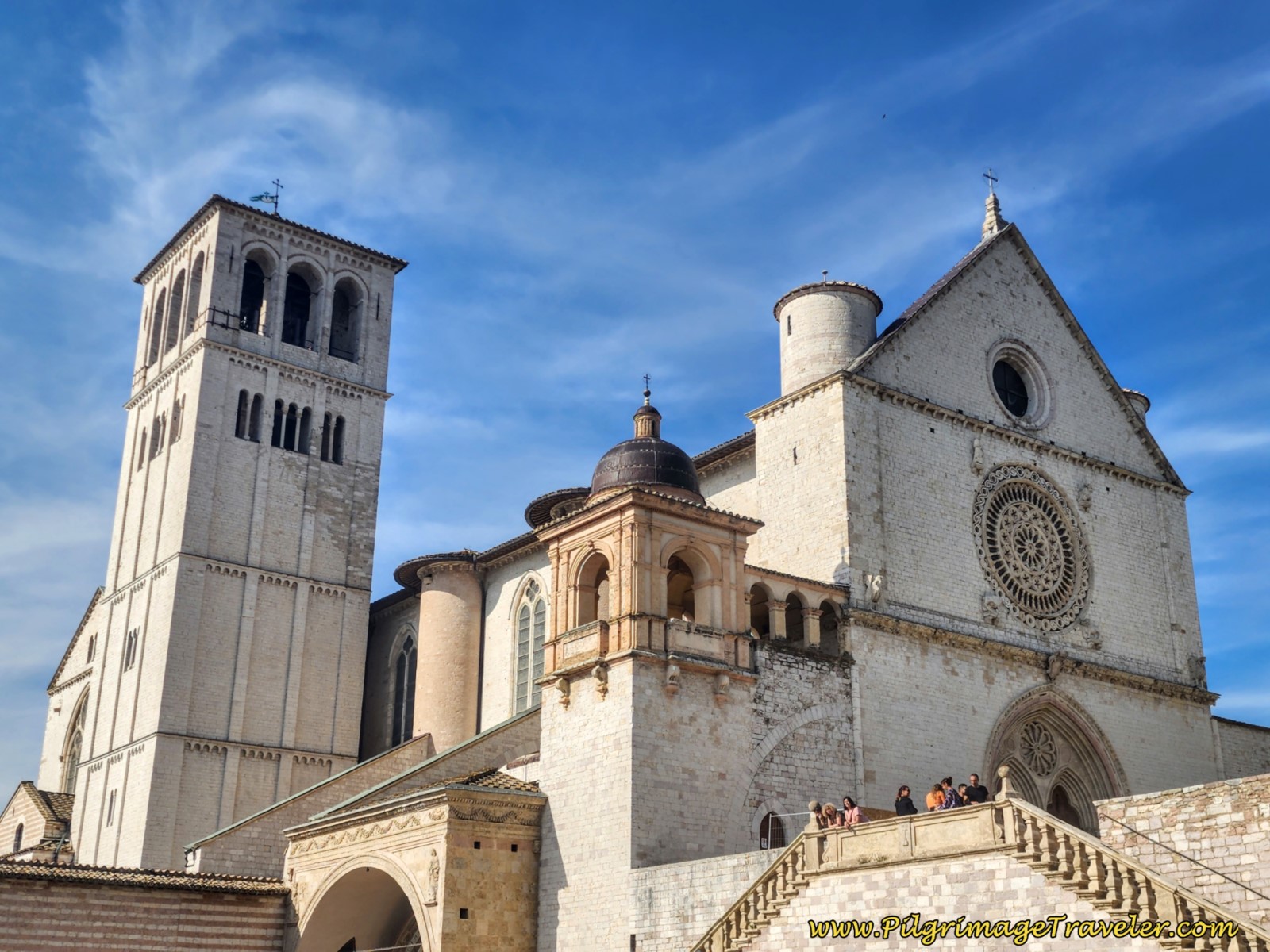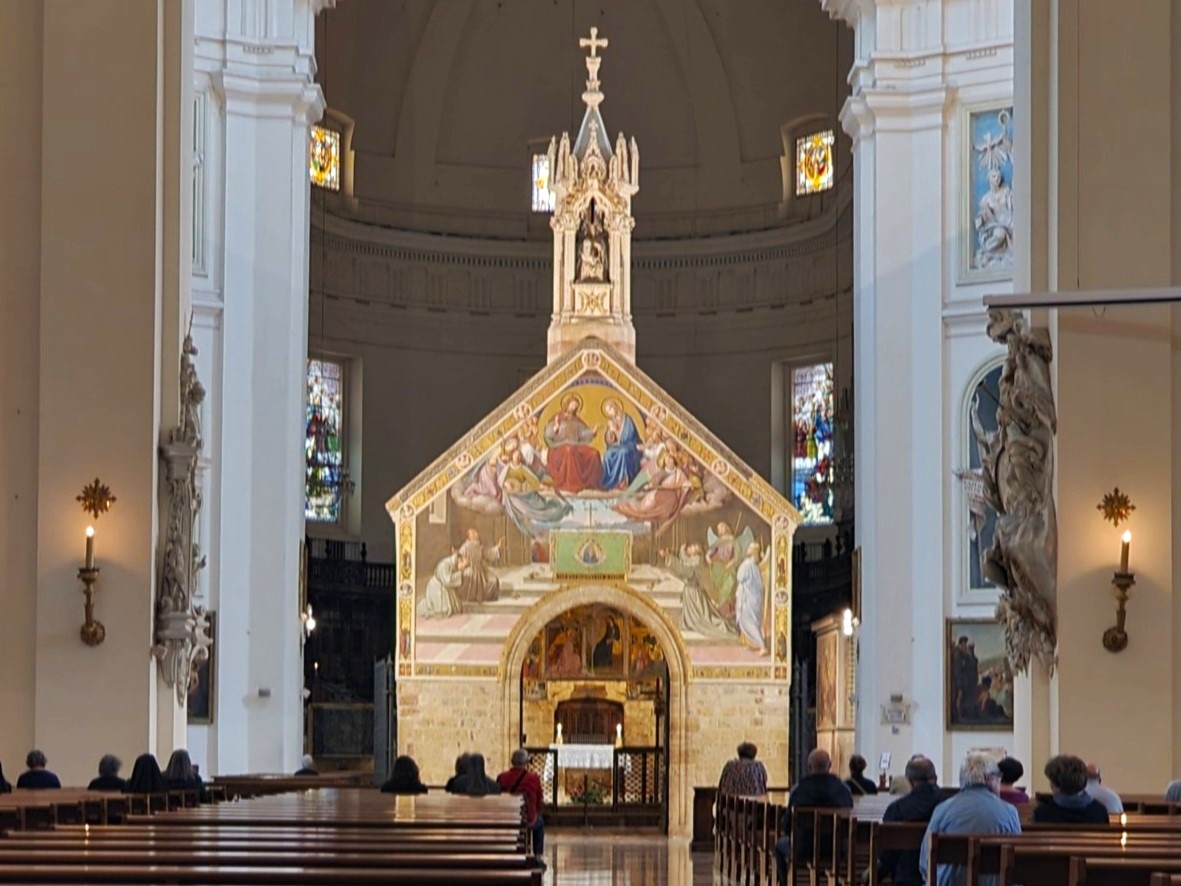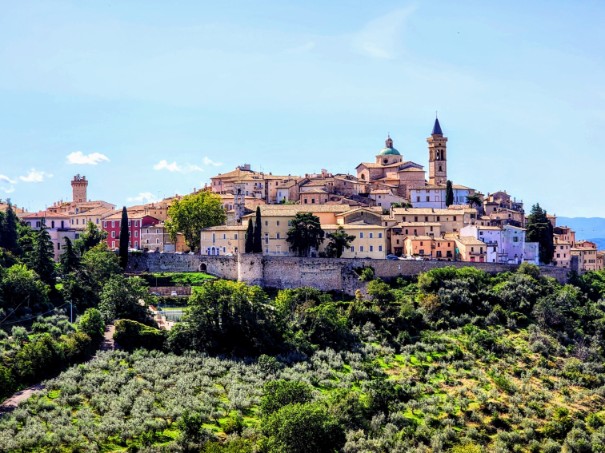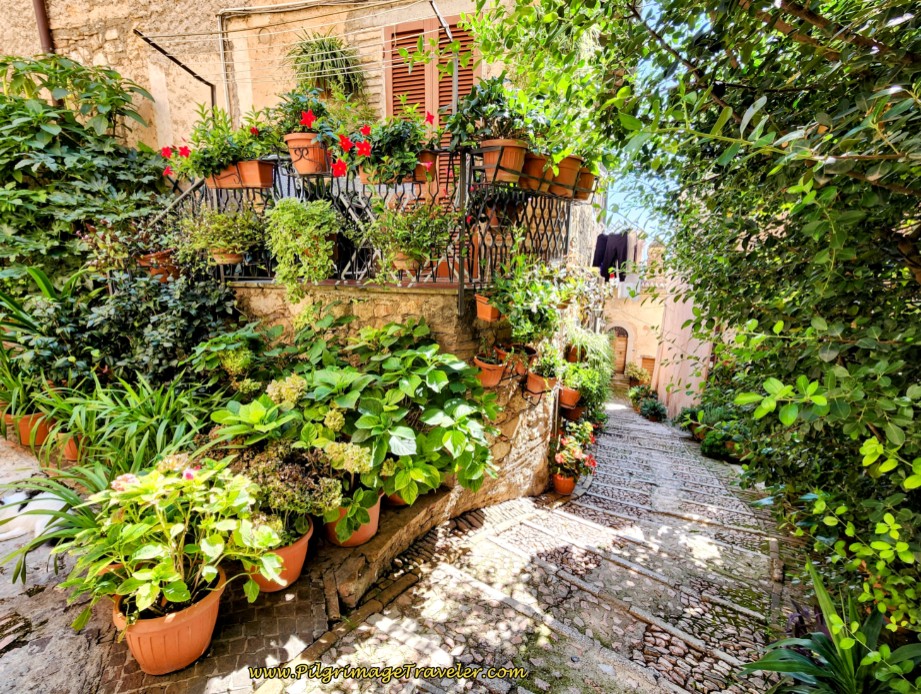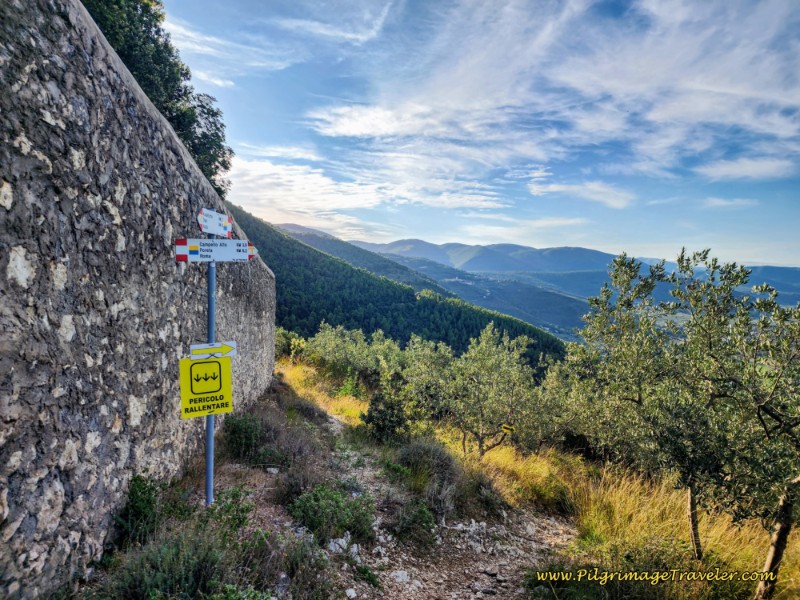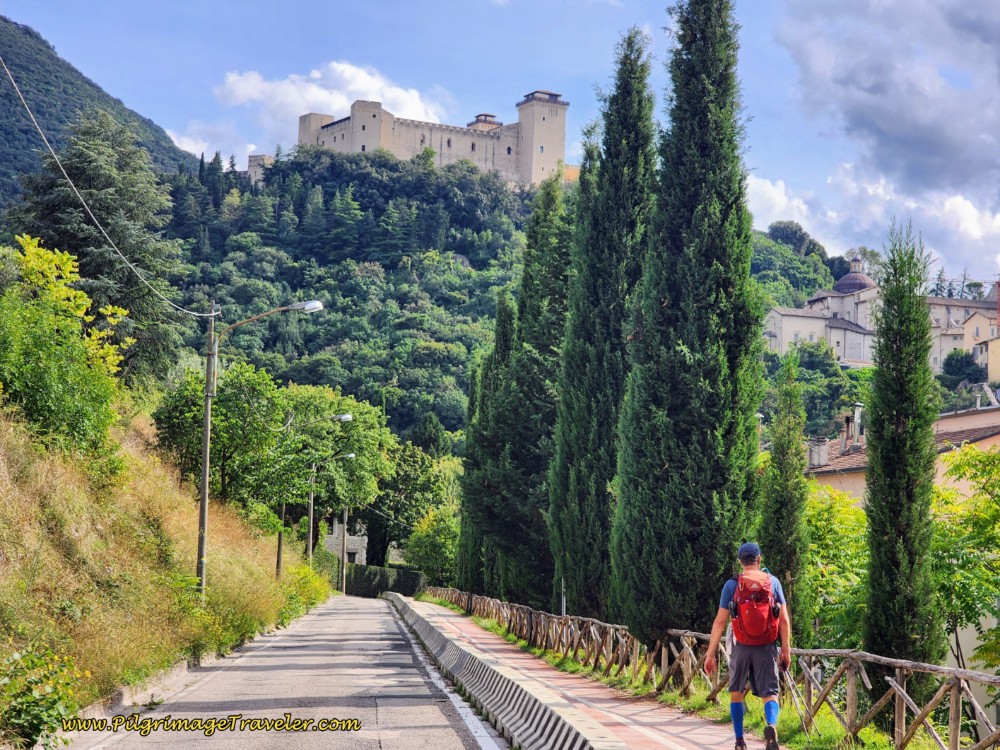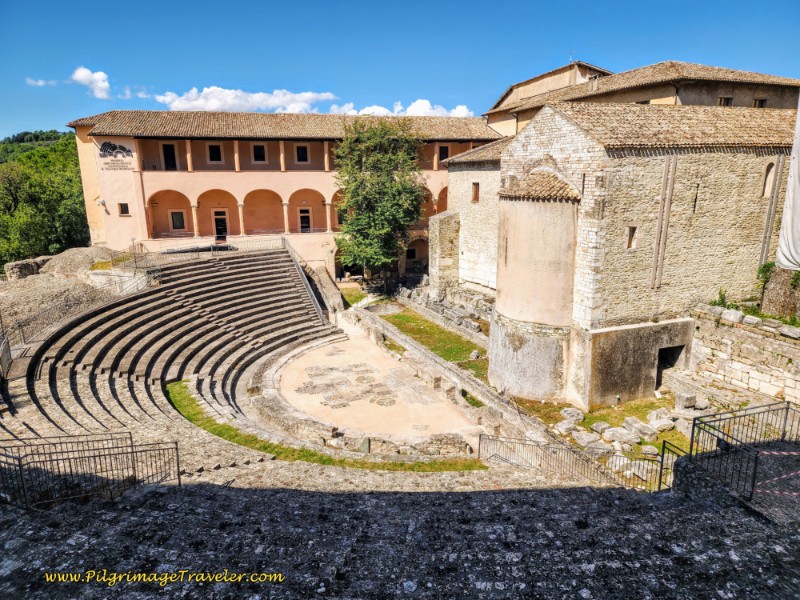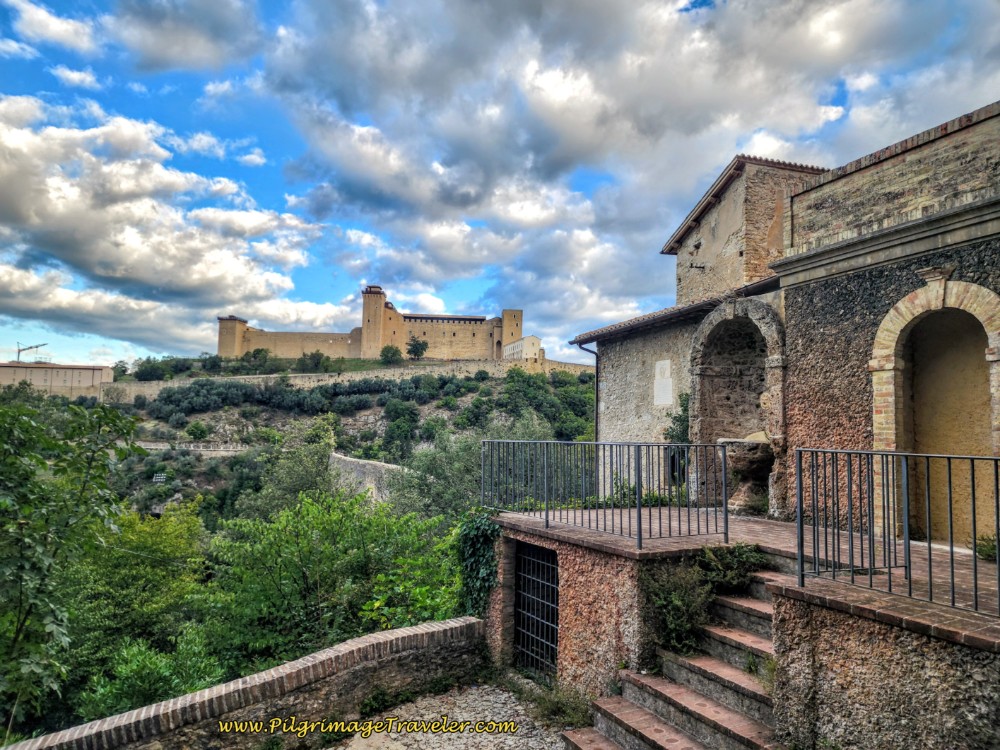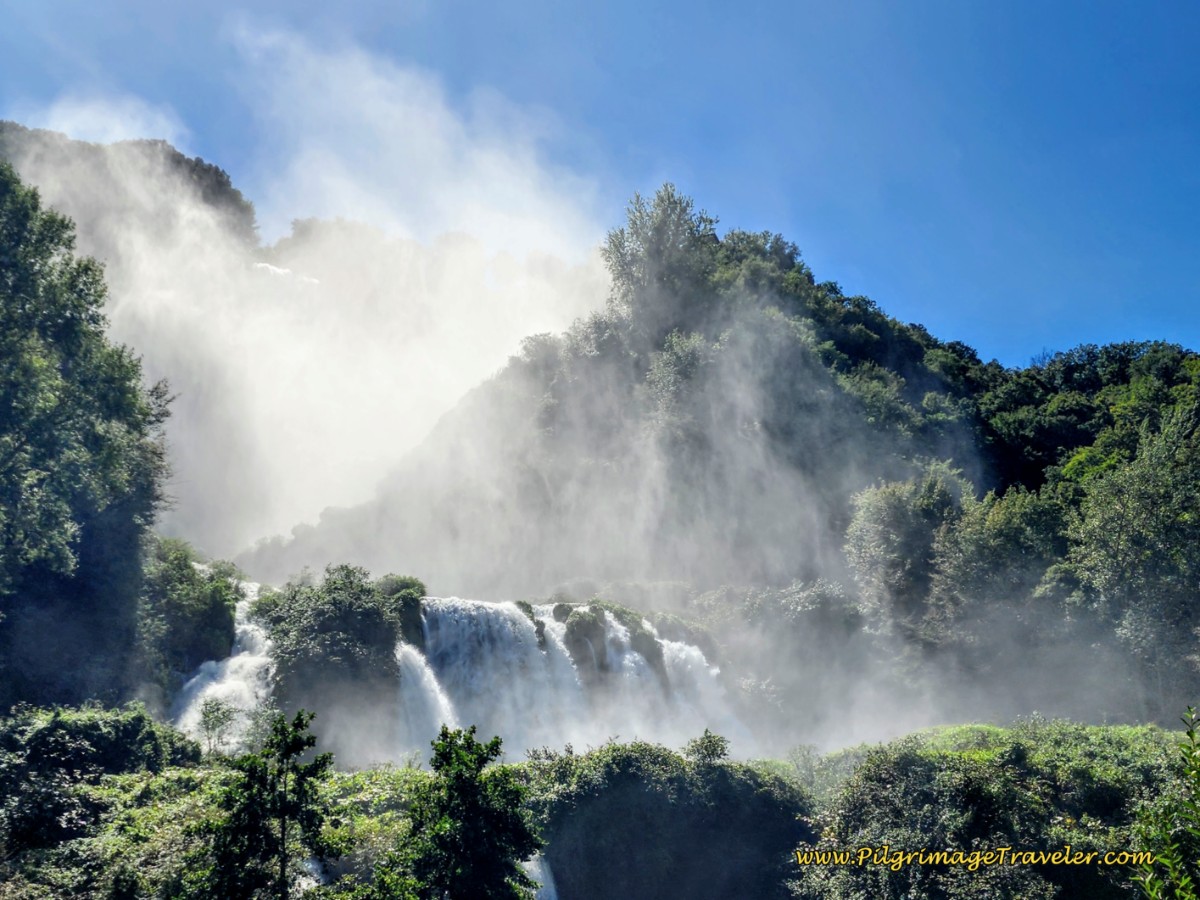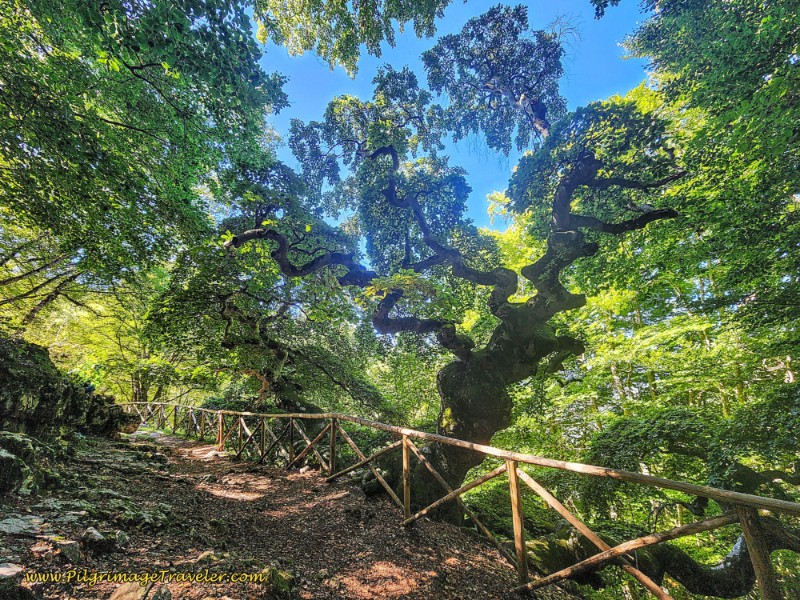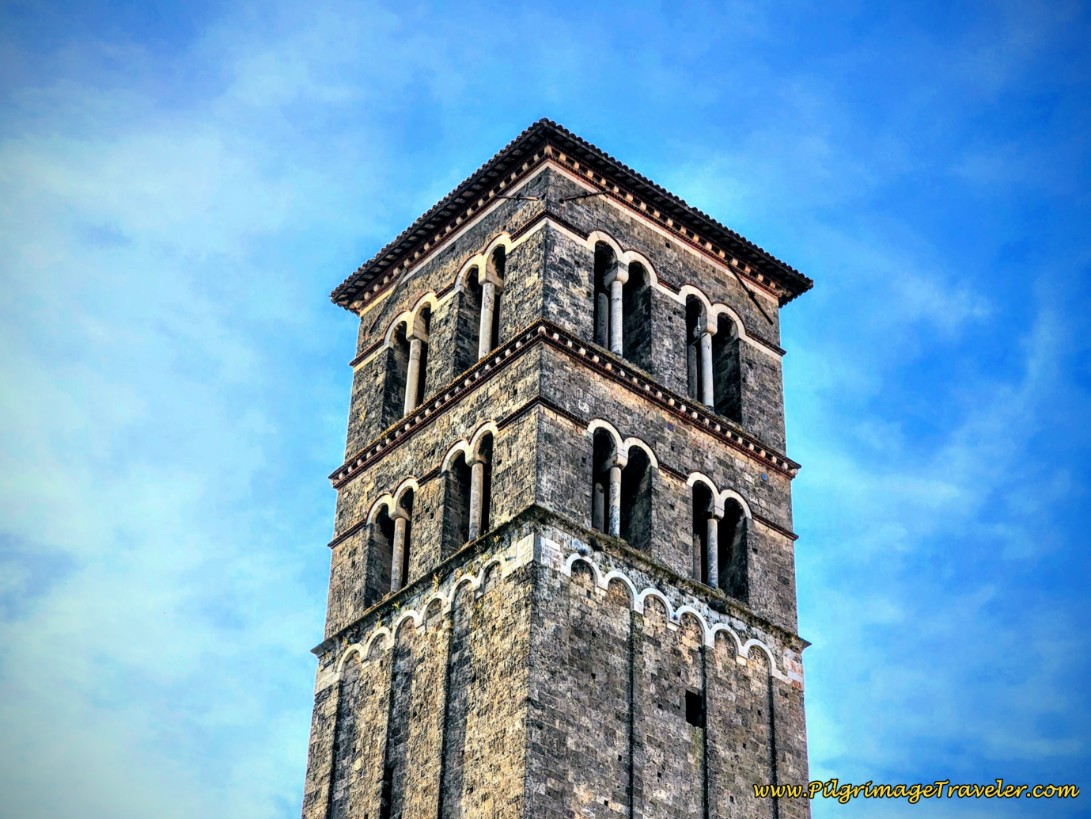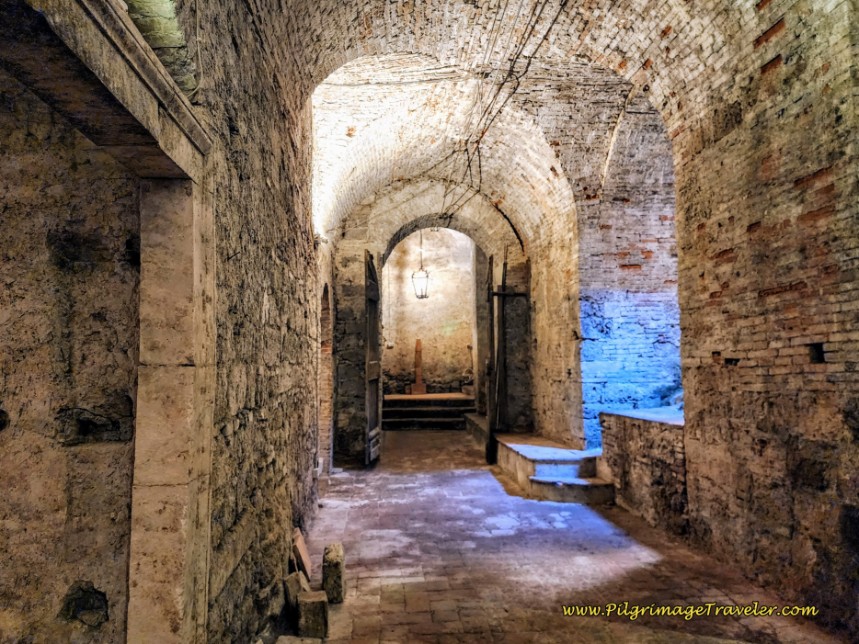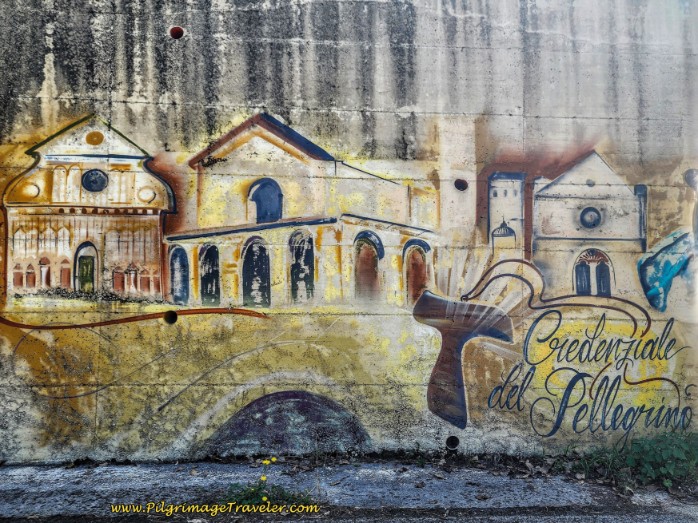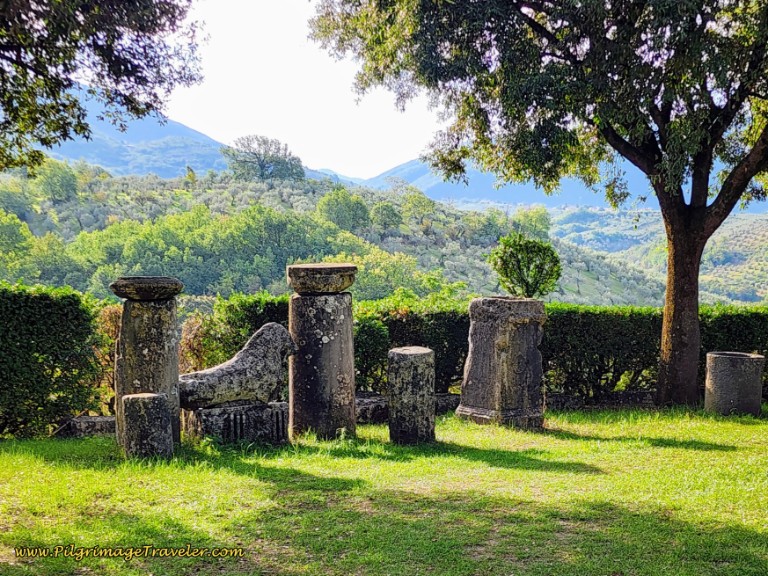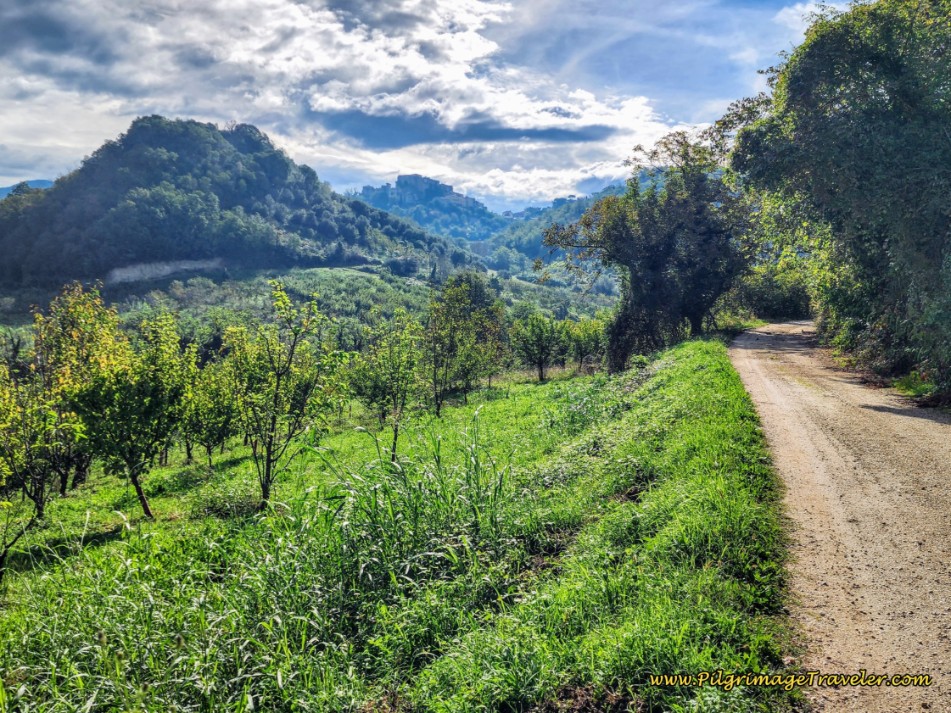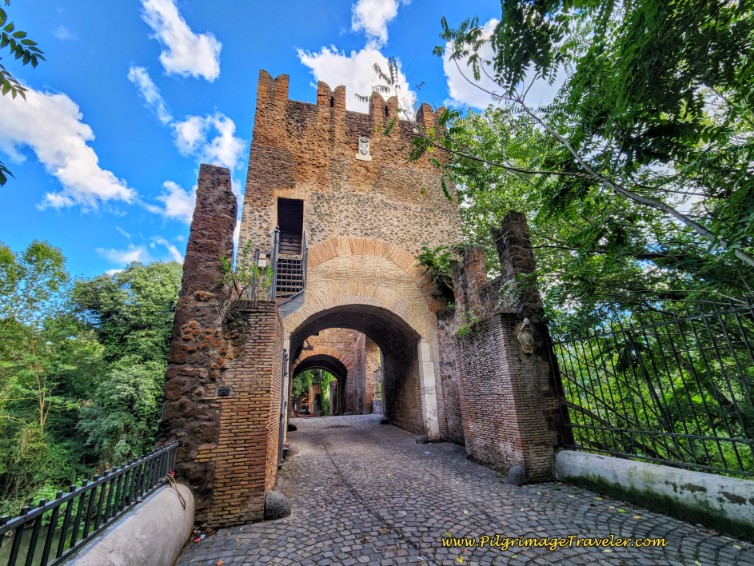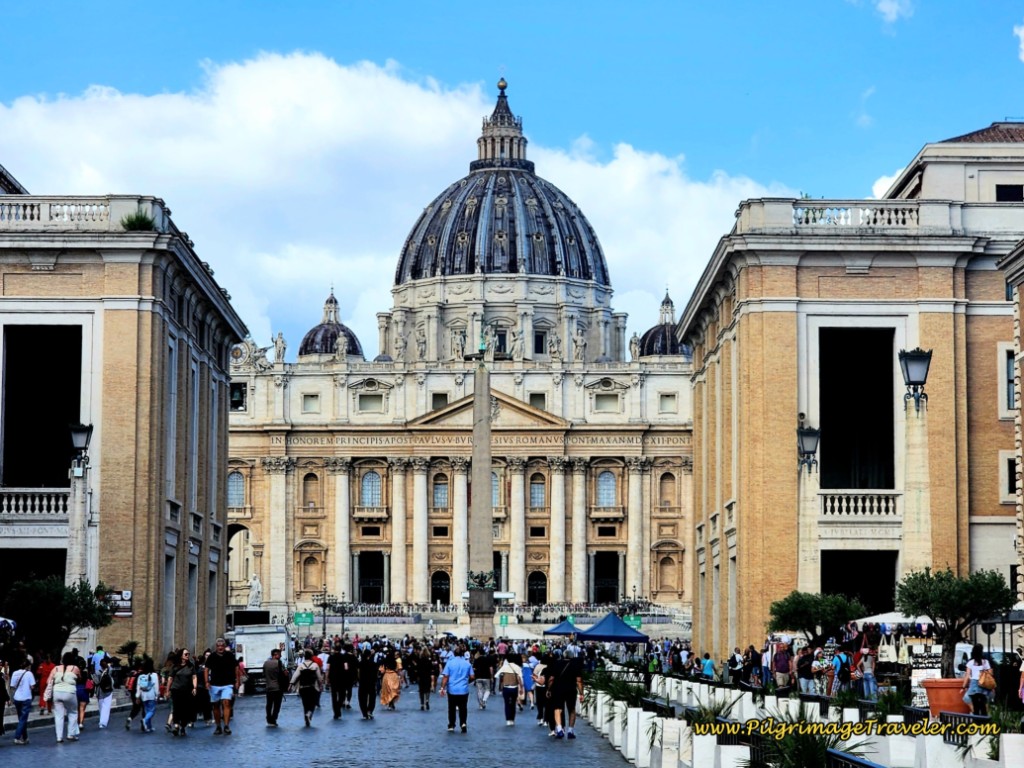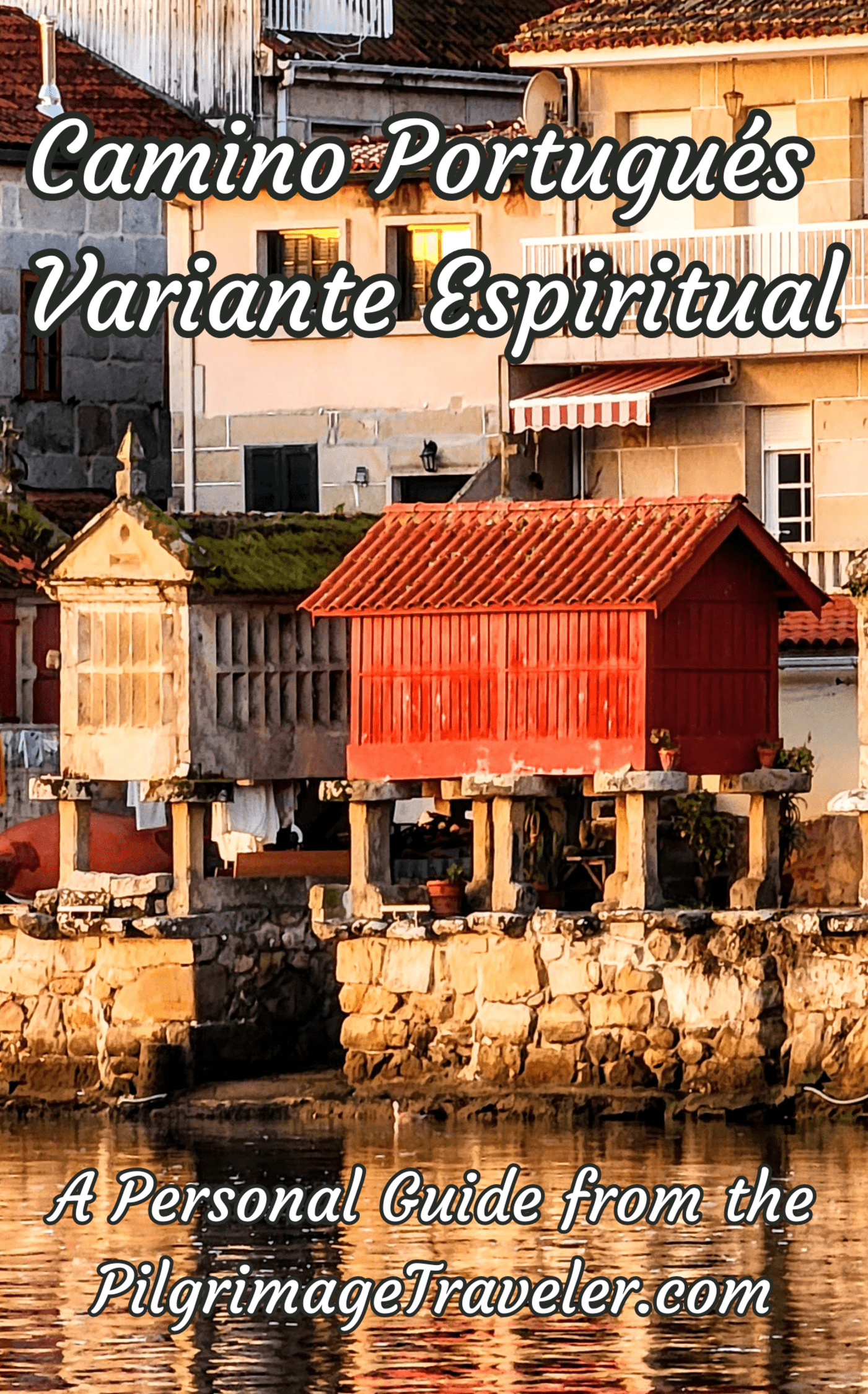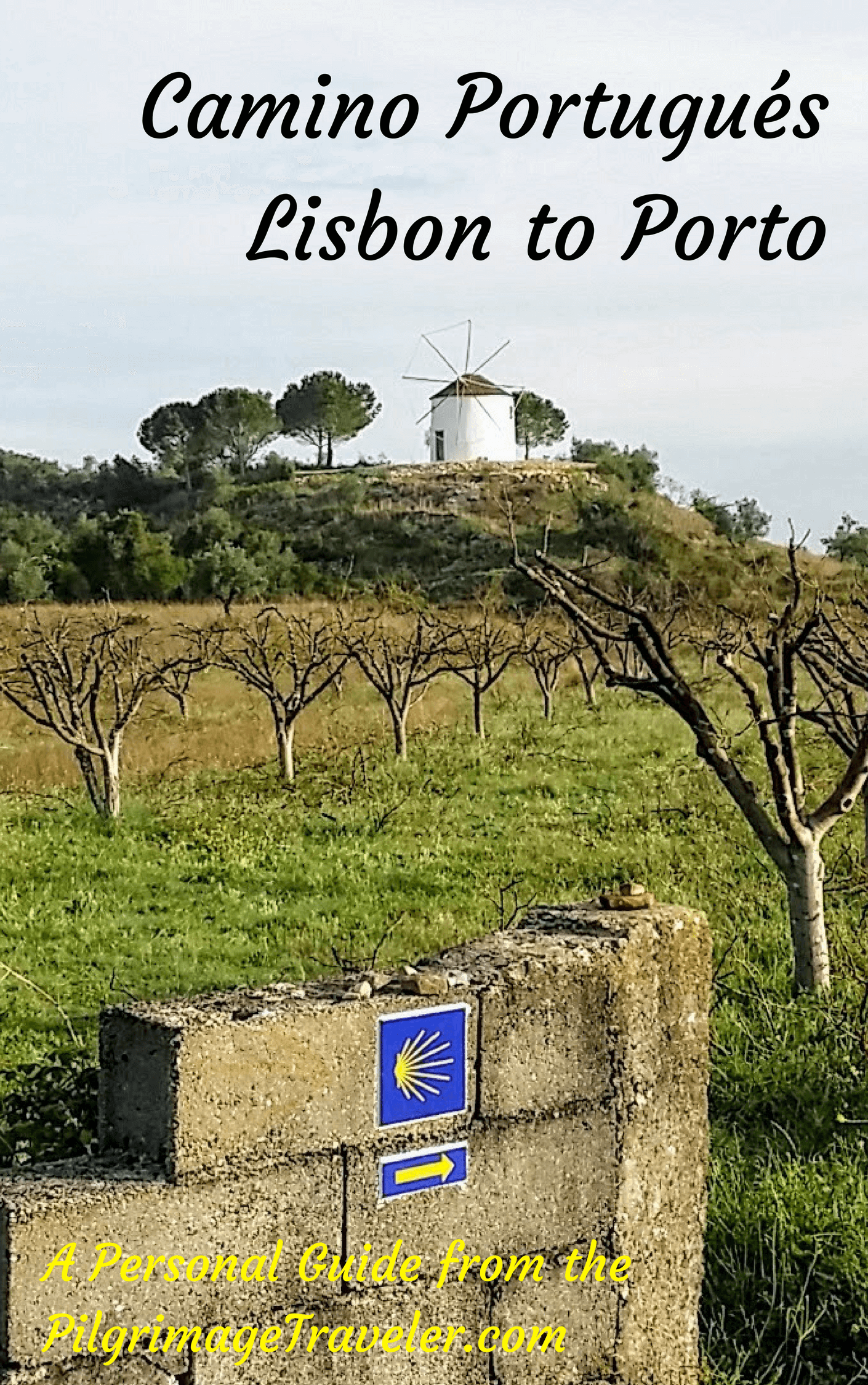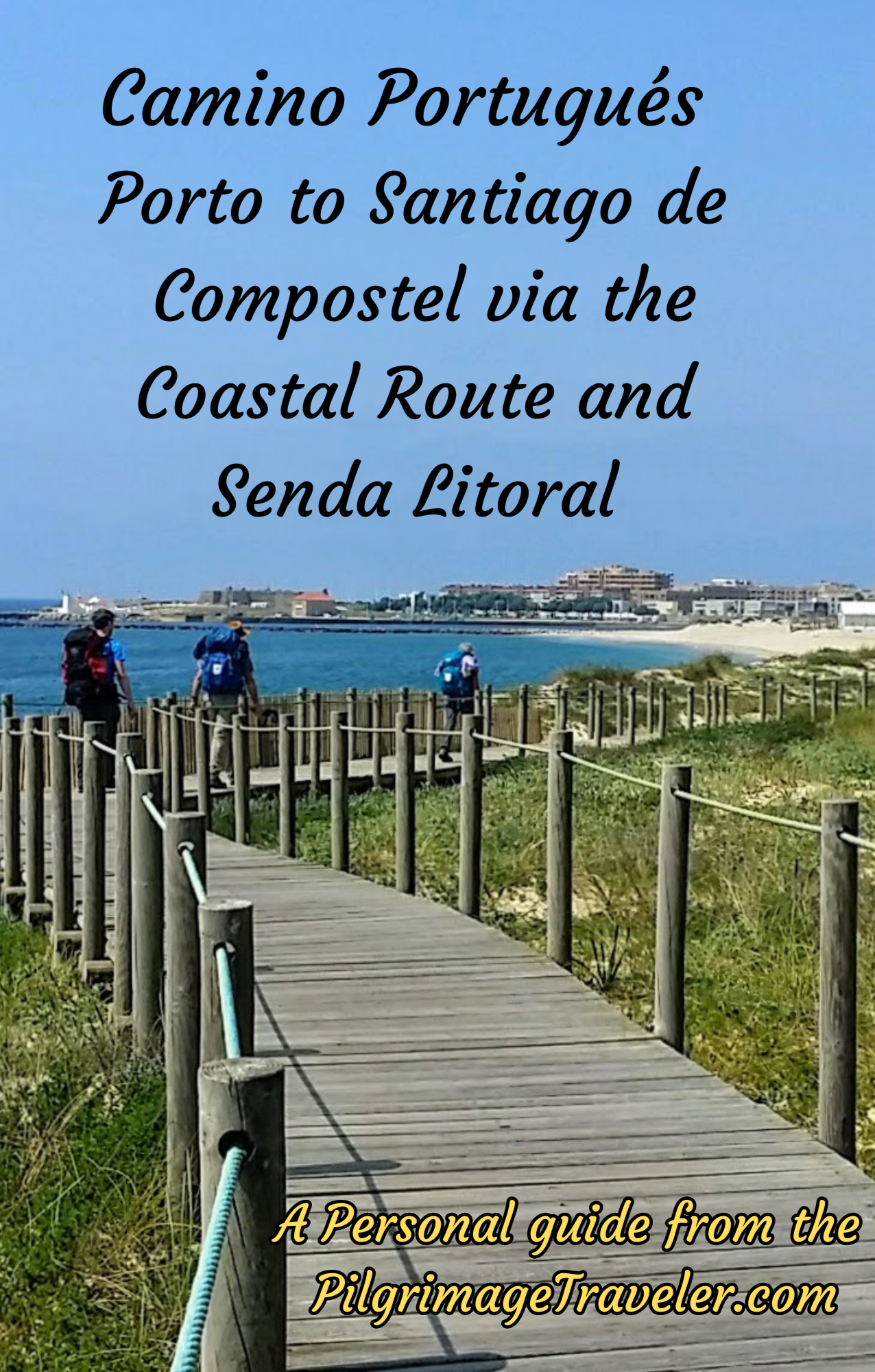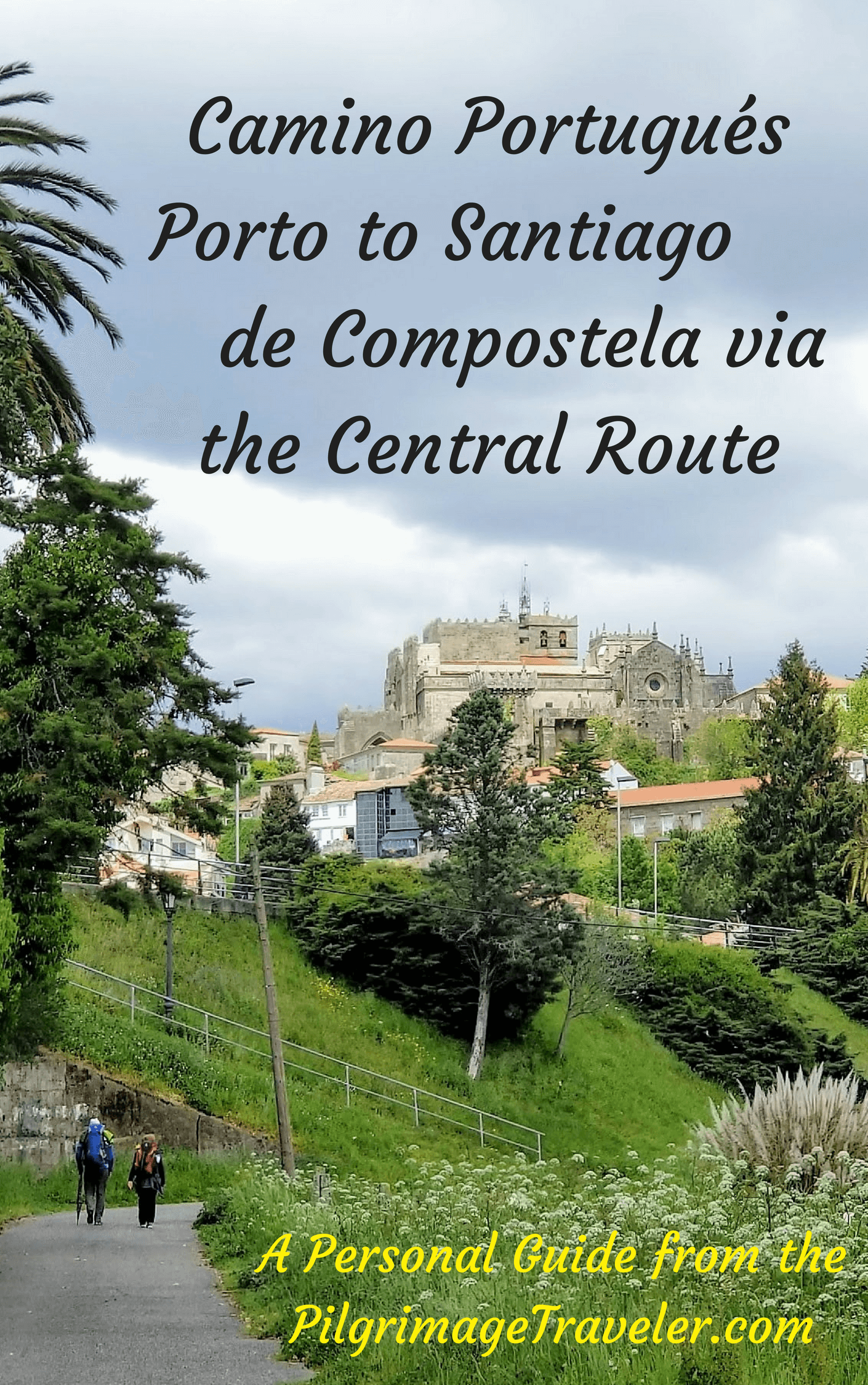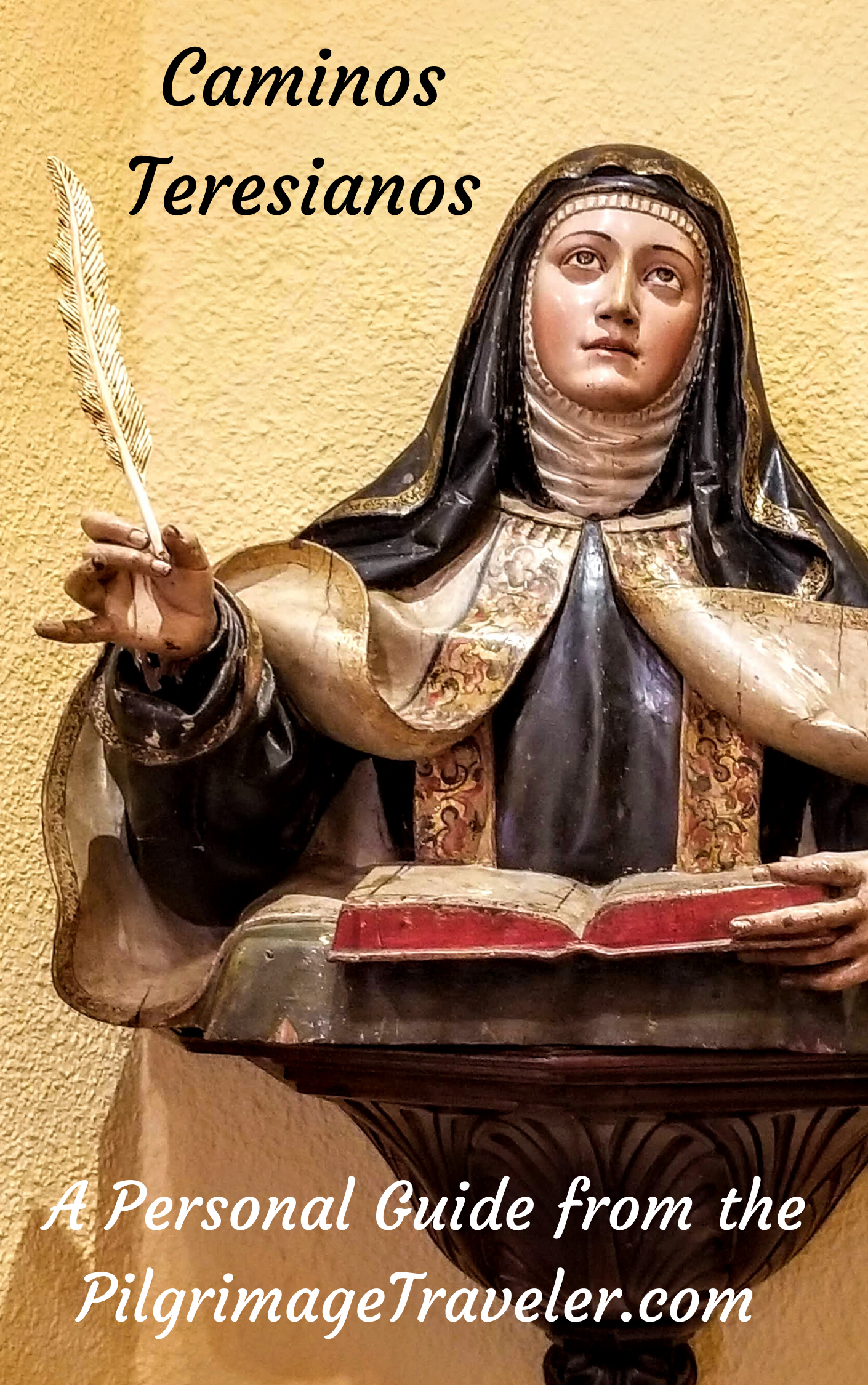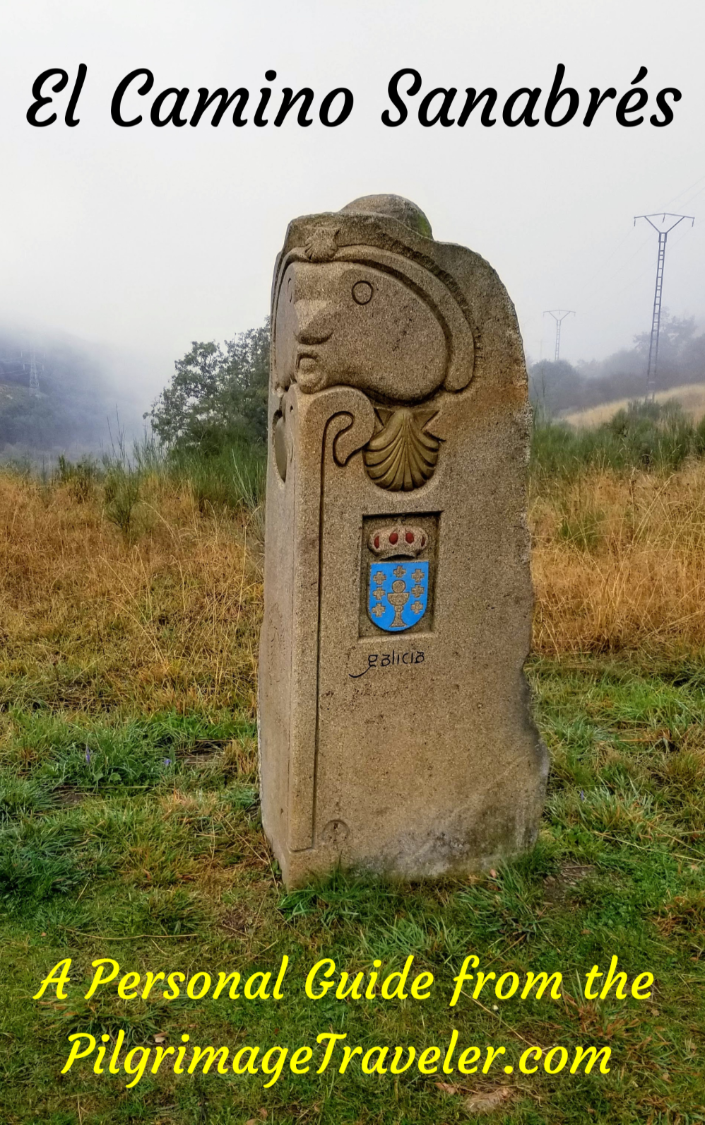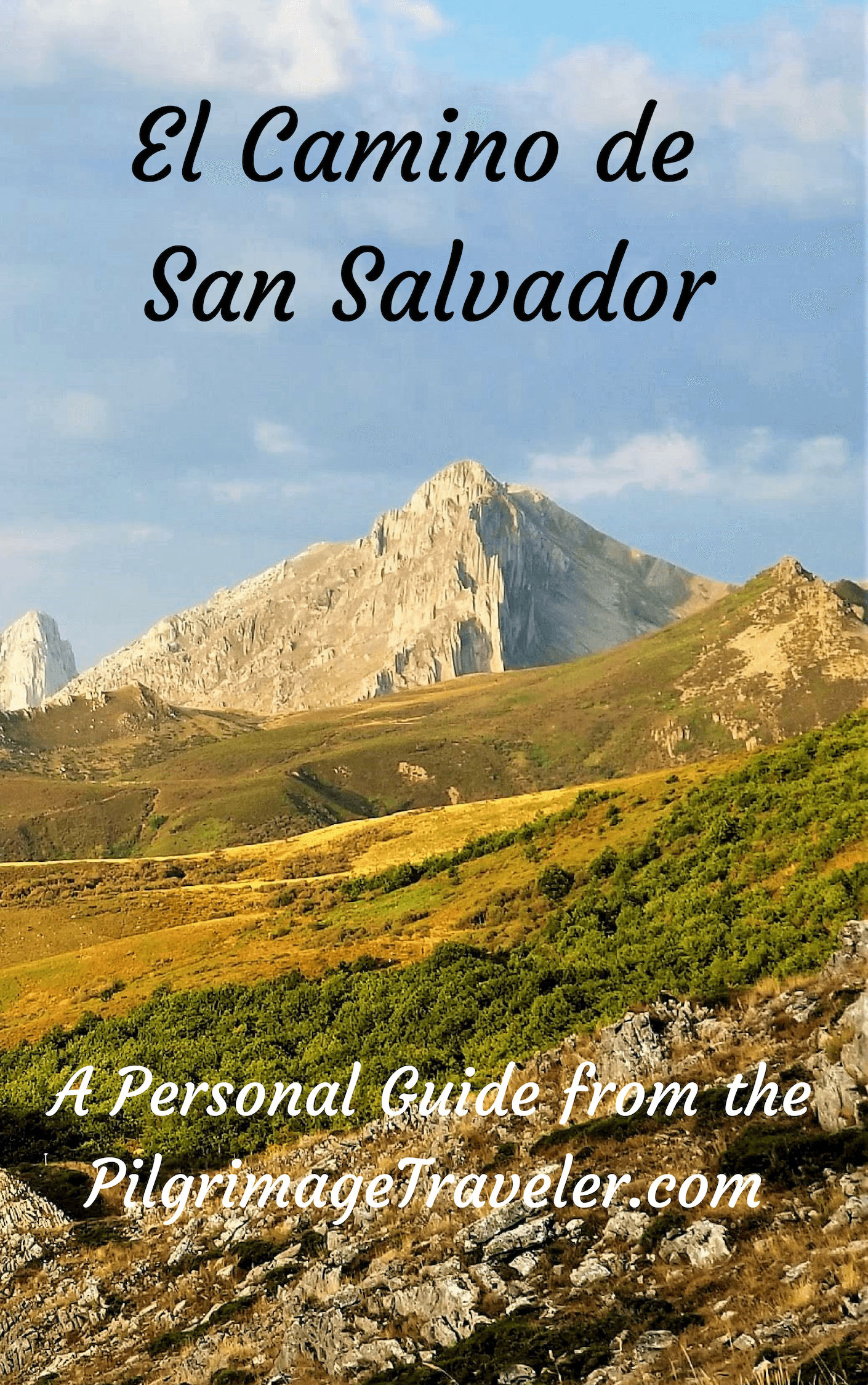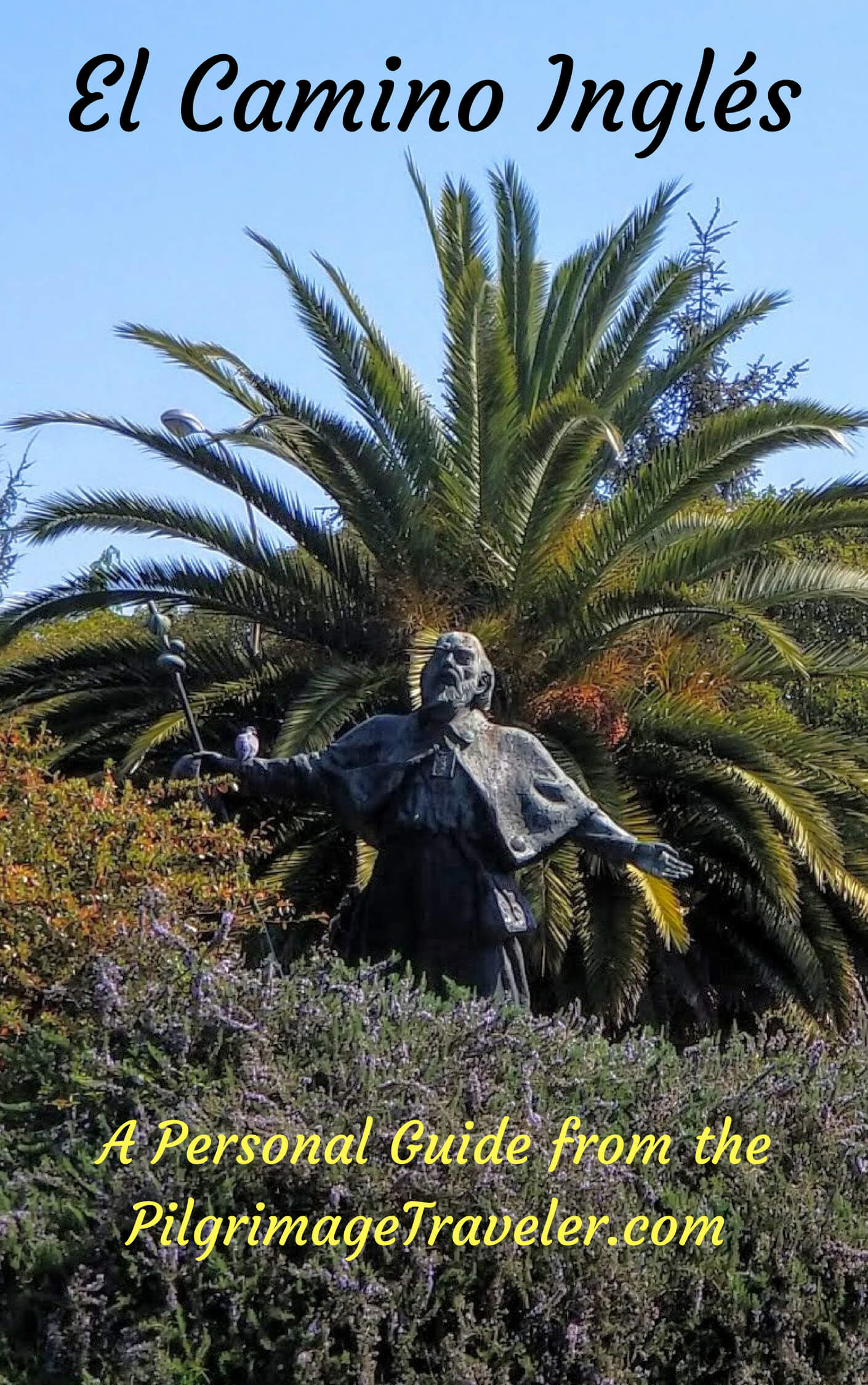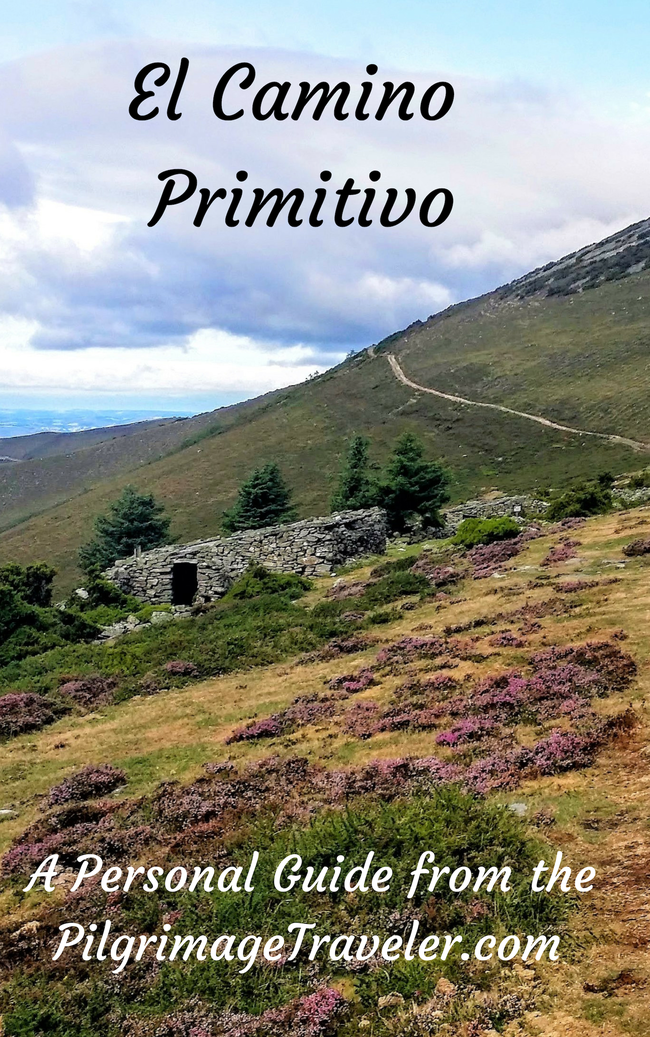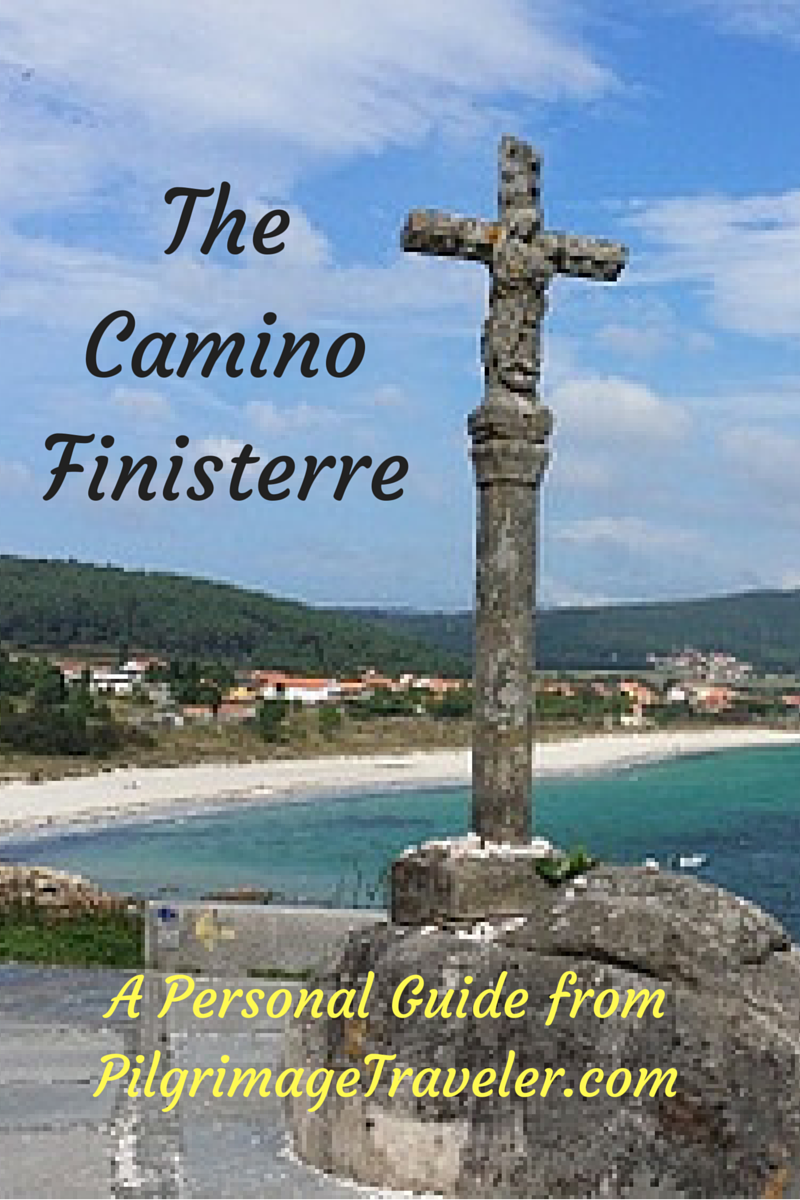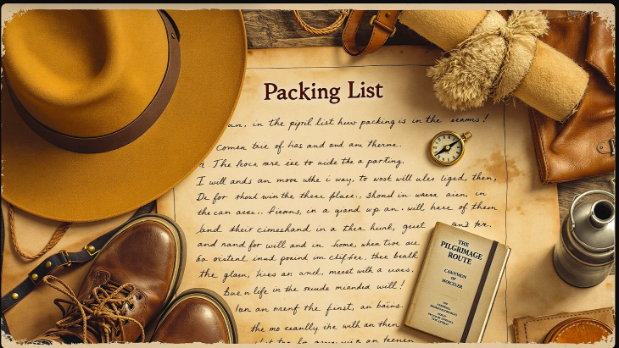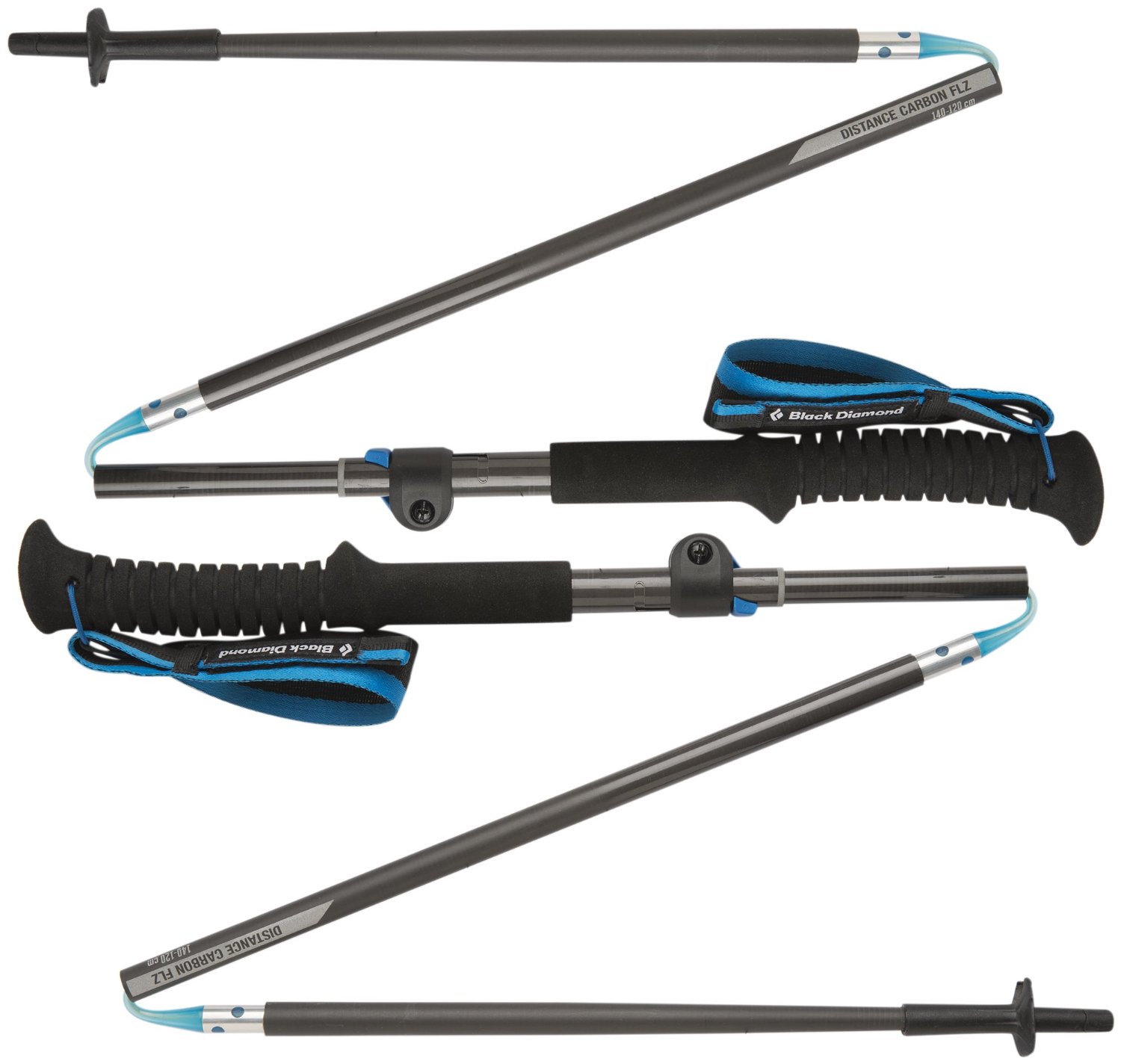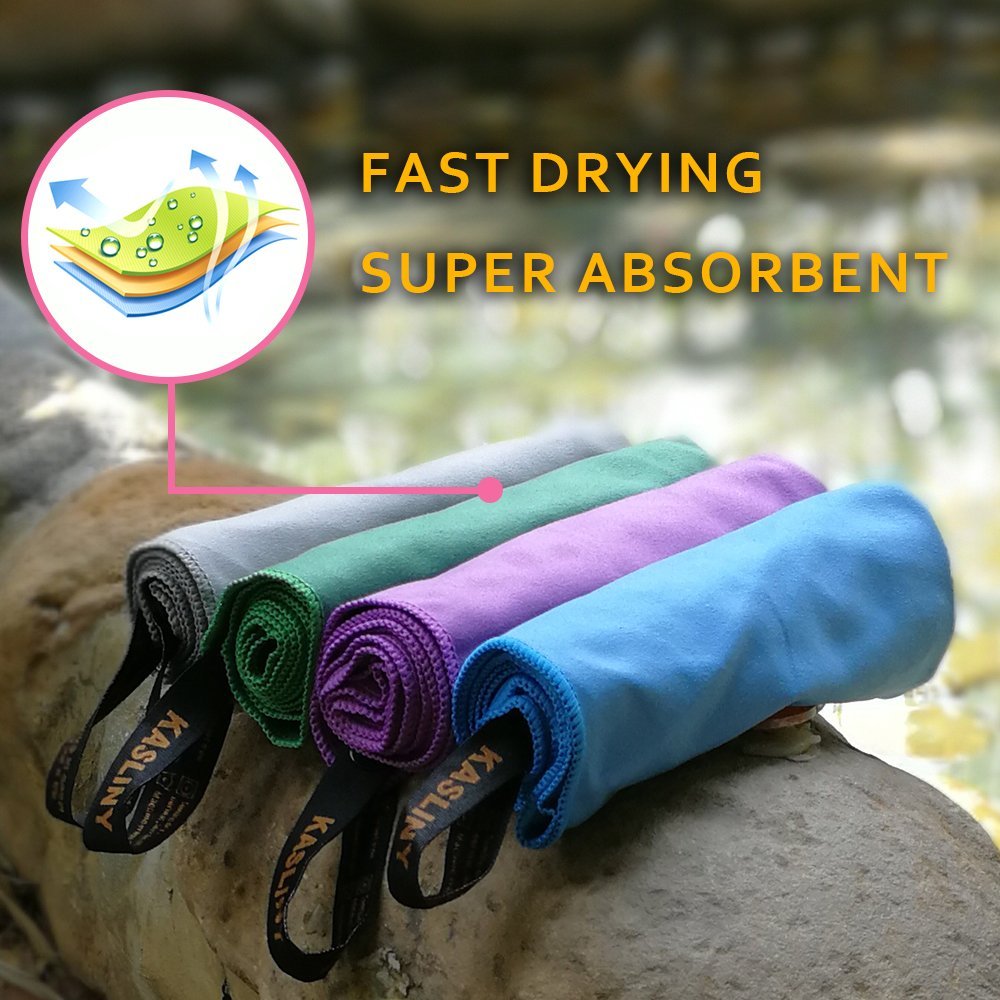- ~ Home
- The Way of St. Francis
- The Way of St. Francis, Assisi to Spello, Day Eleven
Jump to Way of St. Francis Stages
Day Eleven on the
Way of St. Francis ~ Assisi to Spello, 16.5 Kilometers (10.3 Miles)
Disclosure: the PilgrimageTraveler.com is an associate of Booking.com, Roamless, and Amazon. As associates of these merchants, we earn from qualifying purchases from our links.
Our day eleven along the Way of St. Francis, from Assisi to Spello was a strenuous climbing day, with a gain of 952 meters (3123 feet) over 6.7 kilometers.
"The only thing ever achieved in life without effort is failure." ~ St. Francis of Assisi
Keep this wisdom in your heart for this stage, and let St. Francis guide you up the mountain!
🙋♀️ Why Trust Us at the Pilgrimage Traveler?
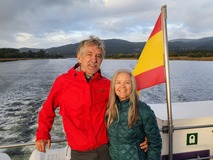
We’re not a travel agency ~ we’re fellow pilgrims! (See About Us)
We've trekked Pilgrimage Routes Across Europe since 2014!
💬 We’ve:
- Gotten lost so you don’t have to. 😉
- Followed waymarks in the glowing sunlight, the pouring rain and by moonlight. ☀️🌧️🌙
- Slept in albergues, hostels & casa rurals. Ate and drank in cafés along the way. 🛌 😴
- Created comprehensive and downloadable GPS maps and eBook Guides, full of must-have information based on real pilgrimage travels. 🧭 🗺️
- Shared our complete journeys, step by step to help YOU plan your ultimate pilgrimage and walk with your own Heart and Soul. 💙✨
Every detail is from our own experiences. Just fellow pilgrims sharing the Way. We have added a touch of spirituality, heartfelt insights and practical guidance from the road ~ offering a genuine connection to the spirit of pilgrimage. Tap into the wisdom of seasoned pilgrims!
Ultreia and Safe Pilgrimage Travels, Caminante! 💫 💚 🤍
We chose to end the stage in Spello instead of the classic end in Foligno farther along. I felt that Spello was a much more attractive place to explore at the end of the day, since it is a darling medieval village on the top of a hill. In contrast, Foligno, while still quaint, is not as alluring, in my view.
The second reason is that while the walk to Spello is only 16.5 kilometers it is quite strenuous. Much more than the stage from Foligno to Trevi.
The walk from Spello to Foligno is essentially flat and only 6.0 kilometers to the center of town. The traditional stage from Foligno to Trevi is only 12 kilometers. Adding in the six from Spello, it is still only an 18 kilometer day, a very doable day.
Consider these facts when you make your own choice of ending points.
The Eremo delle Carceri is the main attraction on this stage after 4.3 kilometers and 485 meters (1591 feet) of climbing. This translates into about two-thirds of the climb in distance, and about one-half the elevation gain up the mountain.
I highly recommend planning a stop here. The monastery grew in the 15th century in the place of a cave, where St. Francis came frequently to hide away and pray. Get here early to avoid the tour buses out of Assisi!
And of course the summit of Monte Subasio is also worth your effort for the day!
Maps and Stats, The Way of St. Francis, Assisi to Spello
Below is the day's Google map, totally interactive, for you to plan this stage on the Way of St. Francis from Assisi to Spello.
You can see that I have given a road alternative, shown in red, for those who choose to stay in the very economical Hotel e Ostello Camping Fontemaggio Assisi on the far east of town. There is no reason to double back to the official route. This is the road to the Eremo delle Carceri, and it is very quiet, with very few cars, especially if you leave in the early morning before the tourist traffic picks up. The Eremo delle Carceri opens at 0900. (0930 on Sunday).
If you are looking for accommodation in Assisi there are so many choices! Click the link where you can check the current deals, which change from day to day. Twice, we enjoyed spending time in the very economical, but small and quaint Apartments Aurora Delle Rose, so we could cook, yet still be in the middle of everything.
There is the pilgrim's hostel, the Hospitale Laudato Si (+39 331 122 4691), donation-based with only 10 beds, for walking pilgrims with a credential. It is about 1/2 kilometer from the northern city gate and is one of only two pilgrim's accommodations in all of Assisi.
The other one is the Cittadella Ospitalità, a simple, hospitality-based accommodation for pilgrims of all types. For direct-booking and pilgrim rates, click on the link. Or for immediate booking, click here on Booking.com.
I also placed more economical choices on my online interactive map as well as top historic sites. You will enjoy this medieval wonder, for sure!
Come prepared with sufficient food and water for this day, as you can see there are no services along the way. There is one small snack shop by the gate of the Eremo delle Carceri, but nothing else until Spello. There is a fountain, the Fonte Bregno, about halfway, but I would not drink from it. Its flow is not consistent according to local wisdom.
As you can see from this day's elevation profile there is a huge climb up and out of Assisi, to the Monte Subasio. The elevation gain of 952 meters (3123 feet) is quite energetic and equally substantial is the elevation loss of 1077 meters (3534 feet)!
This is a recurrent theme on the Via di Francesco, up and down, and up and down!
You can also choose to take the alternative, if you desire. It is the route in orange on the interactive map above.
You can see on the elevation profile below that this route is much easier, only 12 kilometers from the point of the route bifurcation (add another kilometer if starting near the Basilica). The cumulative elevation gain is only 329 meters (1079 feet).
Many pilgrims choose this alternative, however, there are still no amenities for the entire stage.
Accommodations in Assisi
If you are looking for accommodation in Assisi there are so many choices! Click the link where you can check the current deals, which change from day to day. We enjoyed spending time in the very economical, but small and quaint Apartments Aurora Delle Rose, so we could cook, yet still be in the middle of everything.
There is the pilgrim's hostel, the Hospitale Laudato Si (+39 331 122 4691), donation-based with only 10 beds, for walking pilgrims with a credential. It is about 1/2 kilometer from the northern city gate and is one of only two pilgrim's accommodations in all of Assisi.
The other one is the Cittadella Ospitalità, a simple, hospitality-based accommodation for pilgrims of all types. For direct-booking and pilgrim rates, click on the link.
I also placed more economical choices on my online interactive map as well as top historic sites. You will enjoy this medieval wonder, for sure!
Photo-Rich Travelogue, The Way of St. Francis, Assisi to Spello
We begin the stage, starting from the Basilica di San Francesco at the upper level. Because there are no waymarks at all for the Via di Francesco through Assisi, I will give you a detailed description of the route.
The long, straight walk down the Via di Francesco from the basilica is full of eye-catching buildings, and is extremely busy during normal, daylight hours. Most of my photos to follow are taken in the early morning, before the tourists came out in force!
Most likely you will be leaving town in the pre-dawn light!
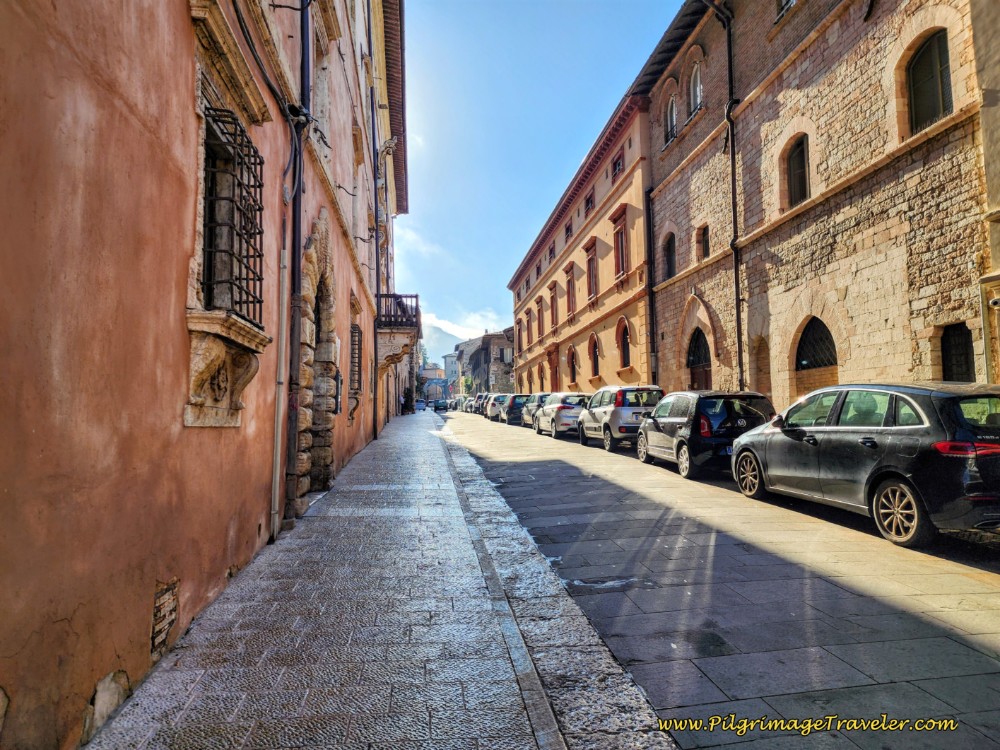 Along the Via di Francesco
Along the Via di FrancescoAfter less than one-half kilometer, walk through the historic gate, the Portico del Monte Frumentario.
Continue straight along, joining the Via Portico after about 2/3 kilometer from the basilica. You are now entering the open plaza, the Piazza del Comune and the dominating structure of the Chiesa di Santa Maria Sopra Minerva, shown next. This church was a Greek temple to Minerva, that has been extremely well-preserved because it was turned into a Christian church and has been in continual use.
The inside of the church was last remodeled in 1634, with continued improvements into the 18th century, in the Baroque style. To see photos of the interior, see my article on Assisi.
Continue walking to the far end of the Piazza del Comune and the next landmark is the Fontana dei Tre Leoni, or the Three Lions Fountain.
By the fountain, in the center of the photo below, look for the narrow second street to the left, which climbs steeply, called the Via San Rufino, which you can just see in the photo to the left of the blue arrow and brown arched doorway. Below is how the large plaza looked in the early morning when we left town.
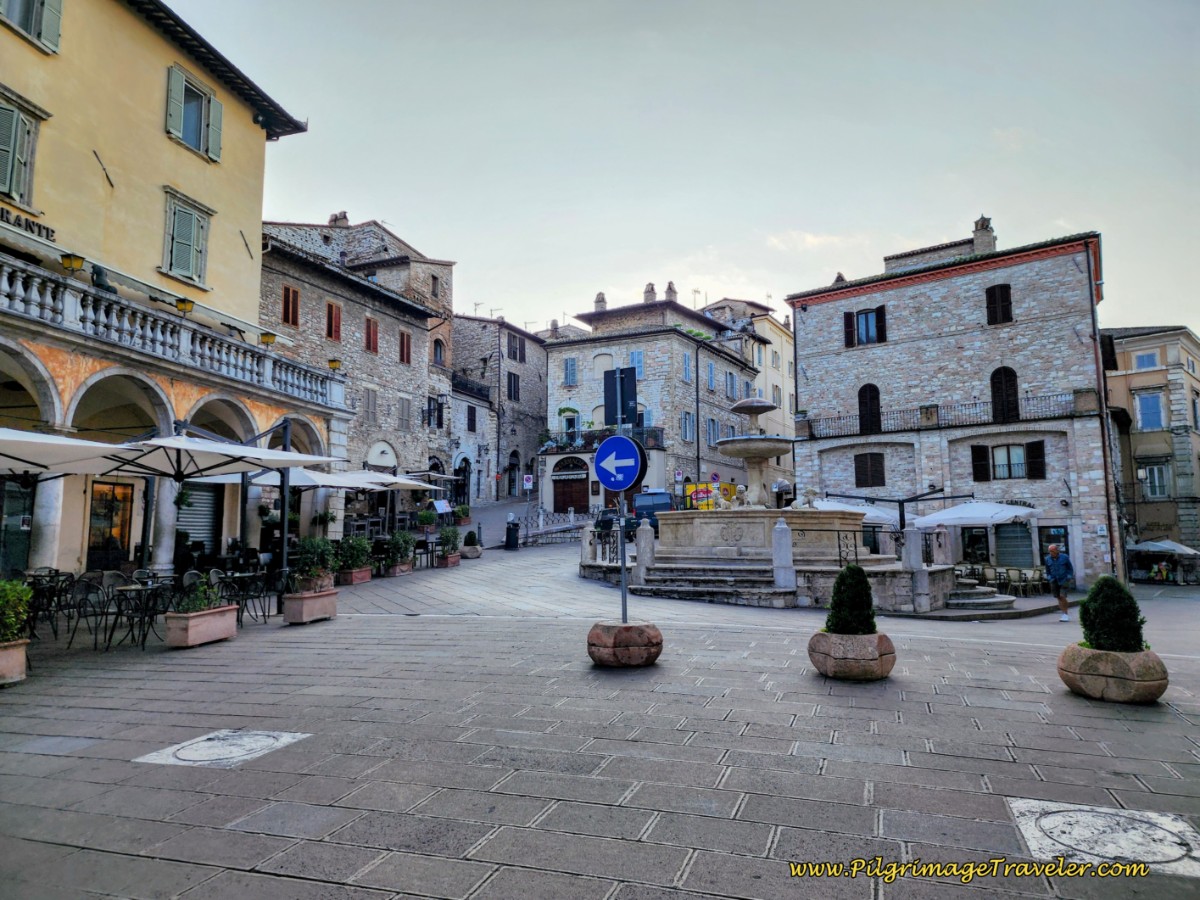 Piazza del Comune and the Fontana dei Tre Leoni
Piazza del Comune and the Fontana dei Tre LeoniClimb up the quaint, steep and narrow Via San Rufino for another 150 meters.
At the end of the street is the Piazza di San Rufino, and the church where St. Francis was baptised, the Cattedrale di San Rufino.
Walk through the plaza and to the street directly to the left of it, through the archway you can see in the photo. This is the Via del Torrione.
After walking through the archway, walk along the high-walled street for less than 200 meters until you intersect with the busy roadway of the SR444 and turn left.
Walk only one long block along the SR444, passing a parking structure and bus stop on the right at the Piazza Giacomo Matteotti.
Turn right when you arrive at the first large intersection and onto the Via Eremo delle Carceri (SP251). This is an important street as it will take you to the Eremo after about 3.3 kilometers, if you choose to take the road alternative as described above.
Almost immediately pass the huge boarding school on your right, the Convitto Nazionale Principe Di Napoli. When we arrived here, the traffic was horrific, with many cars dropping their children off, and traffic enforcement personnel everywhere. It was so congested that we had a difficult time walking through the narrow street!
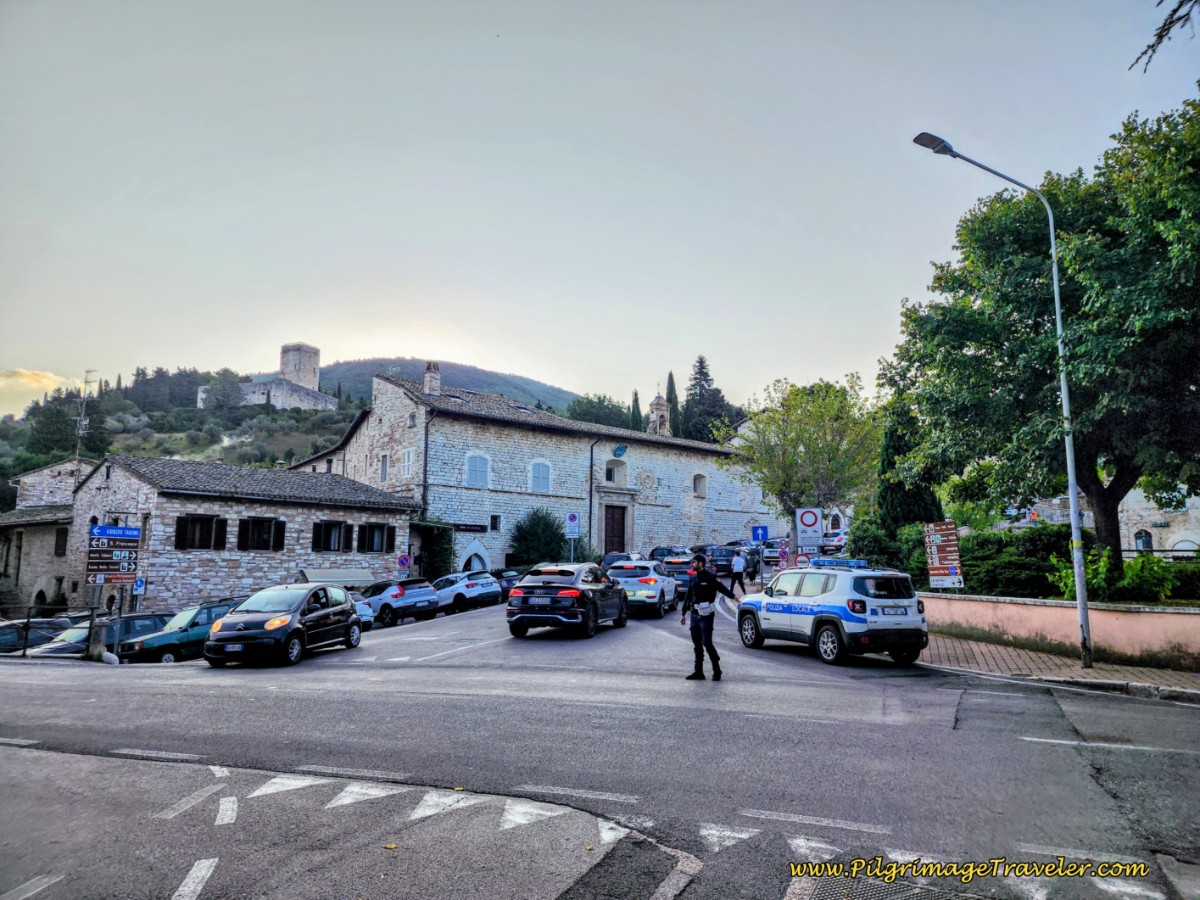 Turn Right at Intersection with the Via Eremo delle Carceri
Turn Right at Intersection with the Via Eremo delle CarceriYou can see the small side castle, the Rocca Minore, in the photo at the top of the hillside. This is your next destination.
But first, after walking by the school, walk through the gate of the city wall, the Porta dei Cappuccini. Pay attention to this name because it will be on the waymarks when they begin again.
You can also see in the photo, the traffic congestion that we had to walk around!
Pay attention after you walk through the gate. You will be turning left almost immediately, to follow the path of the medieval wall. The waymarks are very difficult to see and very easily missed!
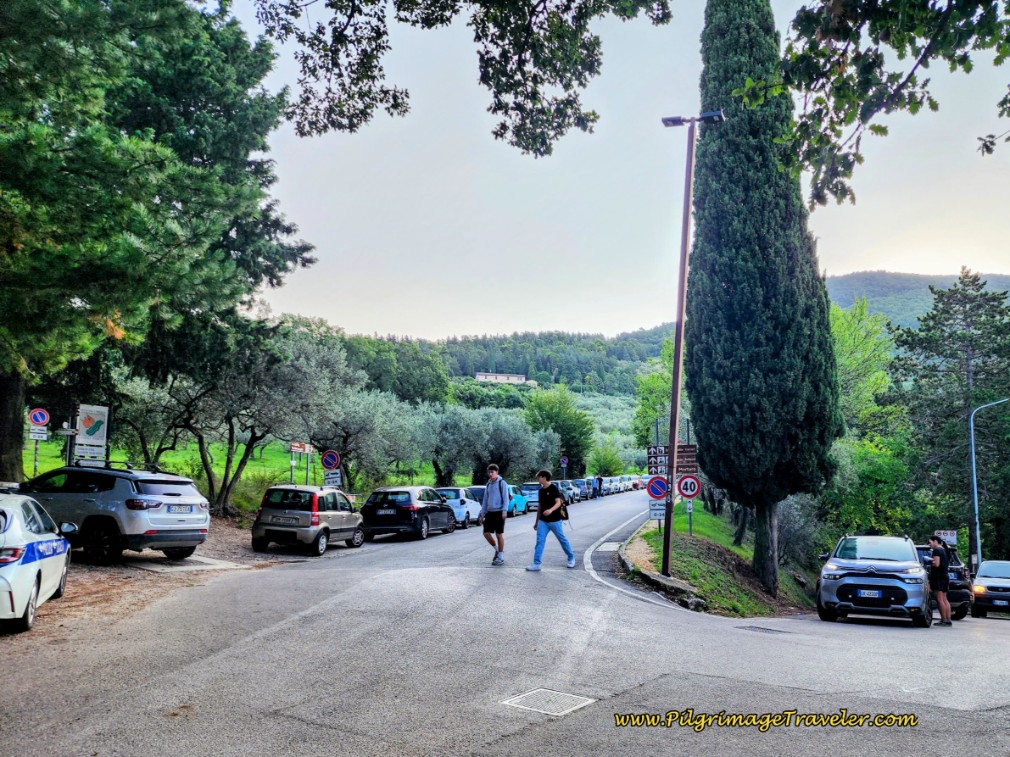 Turn Left at this Intersection, after the Porta dei Cappuccini
Turn Left at this Intersection, after the Porta dei CappucciniIf you look closely in the photo above, on the left side you will see a large Umbria park (Parchi) sign.
 Close-Up of First Way of St. Francis Signage on Day Eleven
Close-Up of First Way of St. Francis Signage on Day ElevenThe same sign is pictured close-up next. This sign is very prominent and you will see it before you see the Way of St. Francis signs right beside it!
Keep alert, so you don't miss the turn. However, it is not all that unpleasant to walk the roadway to the Eremo, if you do miss it, or for pilgrims staying at the Camping Fontemaggio farther down the road.
Ahead is a very pleasant walk along the medieval wall, below, with split rail fences and picnic areas to rest. And from here on out, the waymarks will now be plentiful to reassure you! As the sign announces, the Eremo is 2.8 kilometers away.
 Wide Gravel Road to Rocca Minore
Wide Gravel Road to Rocca Minore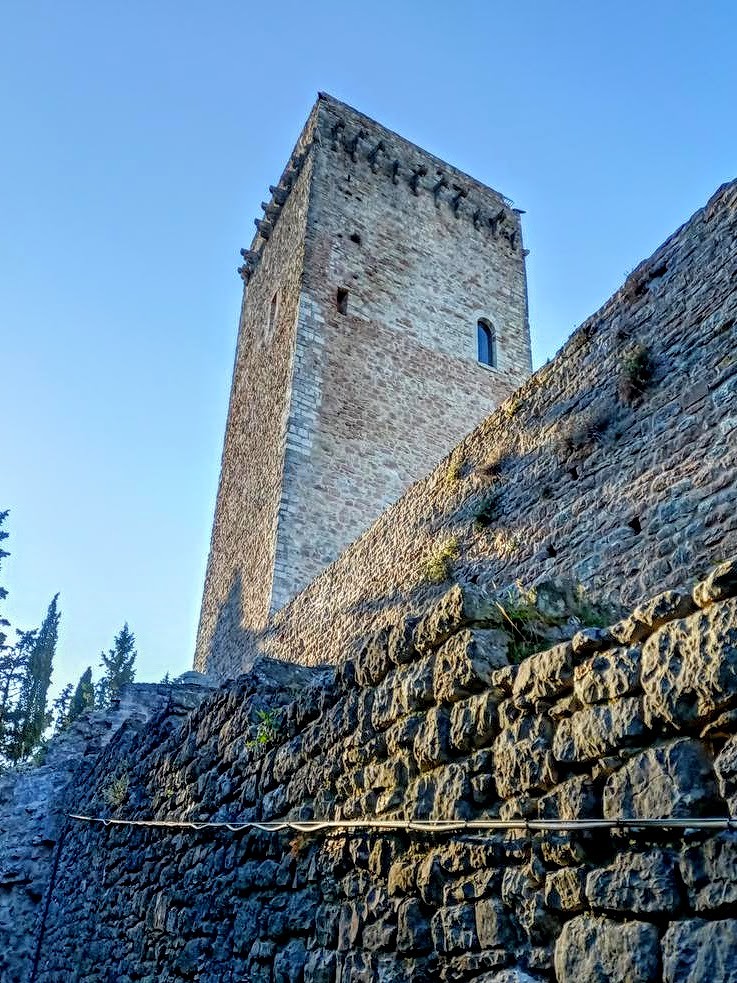 Rocca Minore
Rocca MinoreWithin a few minutes you arrive at the small castle, the 14th century Rocca Minore, shown next, part of the medieval defense system for the city.
And if you walk off-route a bit and climb the walls of the Rocca Minore on the other side, you can see the Rocca Maggiore in the distance. The photo of it below is from Peakery.com. For more information on the castle, go to my article on Assisi.
 Rocca Maggiore from the Rocca Minore
Rocca Maggiore from the Rocca MinoreAfter the Rocca Minore, keep to the right as the road bends to the right, and becomes steeper and rockier. After about 2.3 kilometers total from the Basilica in Assisi, arrive at a Y-intersection. Stay to the right as indicated. The signage states you are 2.1 kilometers from the Eremo.
Continue climbing steeply on the rocky road, and after crossing a rocky ledge, you will arrive at the next intersection, after about 3.1 kilometers total, shown below. Stay straight ahead. The sign at the intersection states you are 1.4 kilometer away from the Eremo. Also here, the climbing eases off!
 Keep Straight at Intersection
Keep Straight at IntersectionContinue along the gravel road for about another 3/4 kilometer, when you come to a T-intersection with a paved road, shown next. Turn right onto the Strada Monte Subasio, at the information sign. It is now a 1/2 kilometer descending cruise along this road to the hermitage.
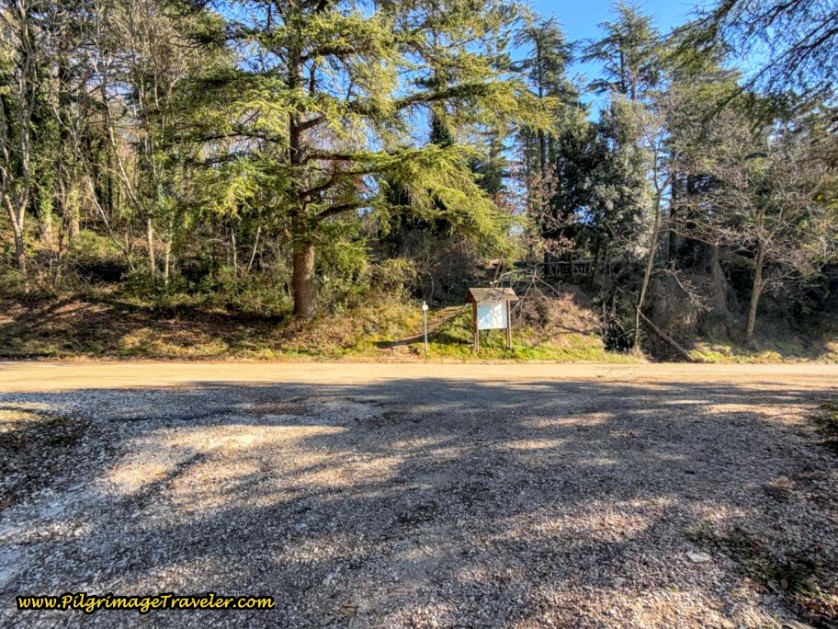 Join the Strada Monte Subasio
Join the Strada Monte SubasioAs you near the Eremo, you will see parking spaces on your right and perhaps a vendor or two.
After 4.3 kilometers total, arrive at the intersection with the Via Eremo delle Carceri, the road from Assisi. At this intersection, the signs shown below will now direct you to the next destination, the Fonte de Bregno, 5.1 km away.
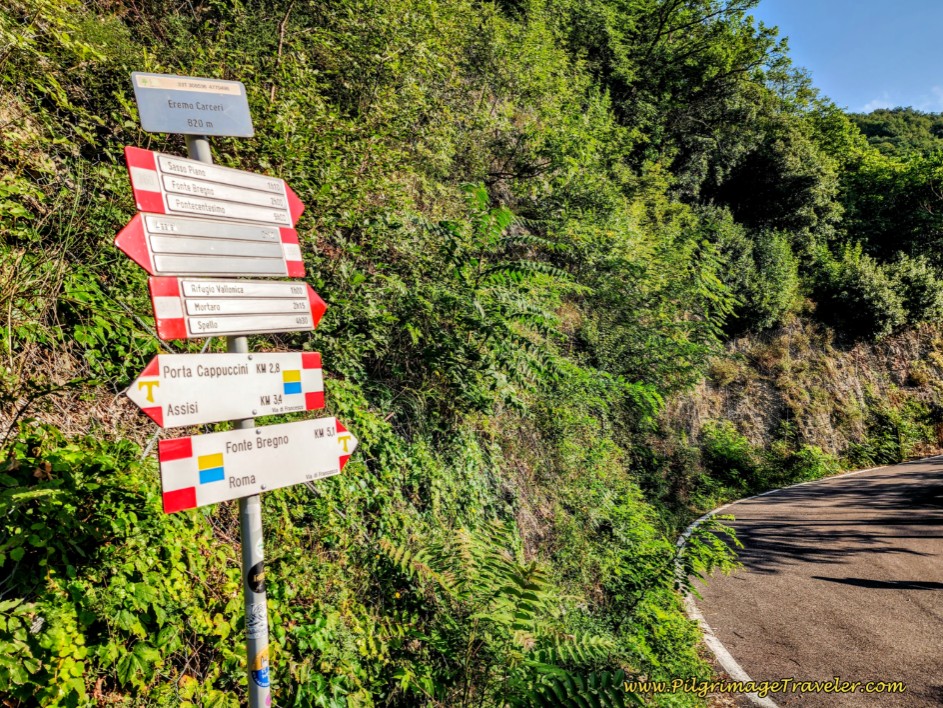 The Signs at the Intersection of the Strada Monte Subasio and the Via Eremo delle Carceri
The Signs at the Intersection of the Strada Monte Subasio and the Via Eremo delle CarceriThe entrance gate to the Eremo delle Carceri is straight ahead, right after a more permanent snack shop on your left.
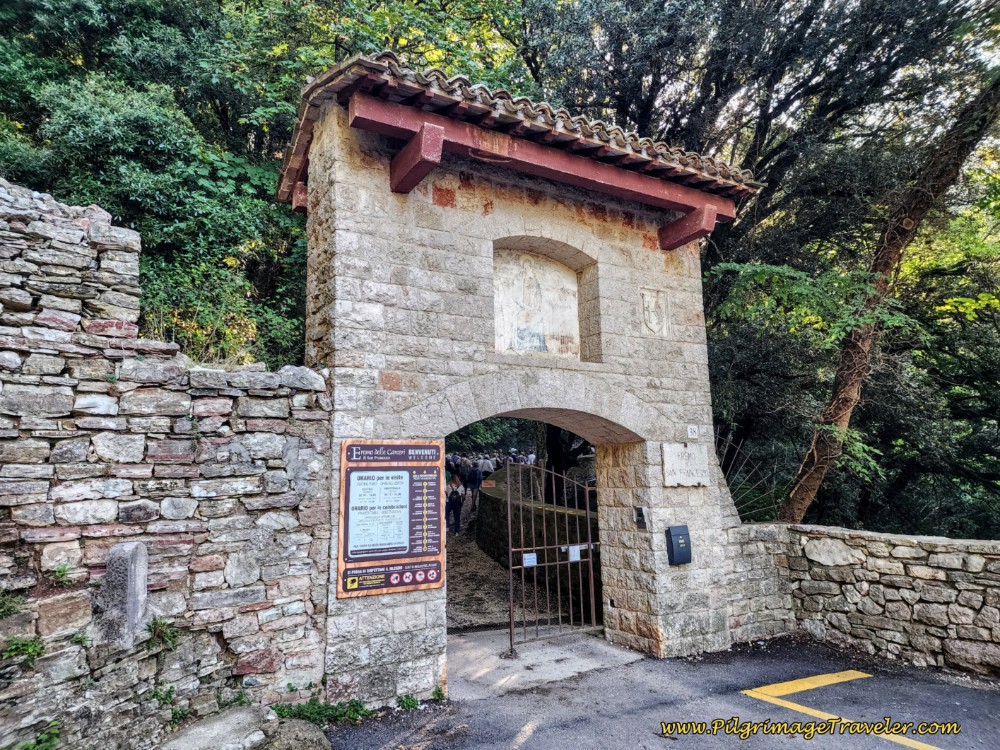 Entrance Gate, Eremo delle Carceri
Entrance Gate, Eremo delle CarceriThe hermitage is a very special place, built on the site of a cave where St. Francis would come to meditate and pray with his companions. Unfortunately, we arrived at the same time as several large tour groups. It took away the serenity of the place, which saddened me.
Everything in the hermitage is well-labeled, in three languages to help you understand what you are seeing. For more detailed information regarding the site, see their official website.
From the main cloister area, a place that caught my attention for its intimacy is the tiny oratory, the Oratorio di Santa Maria, where the Saint and his companions gathered for communal prayer. Here is the altar, pictured below.
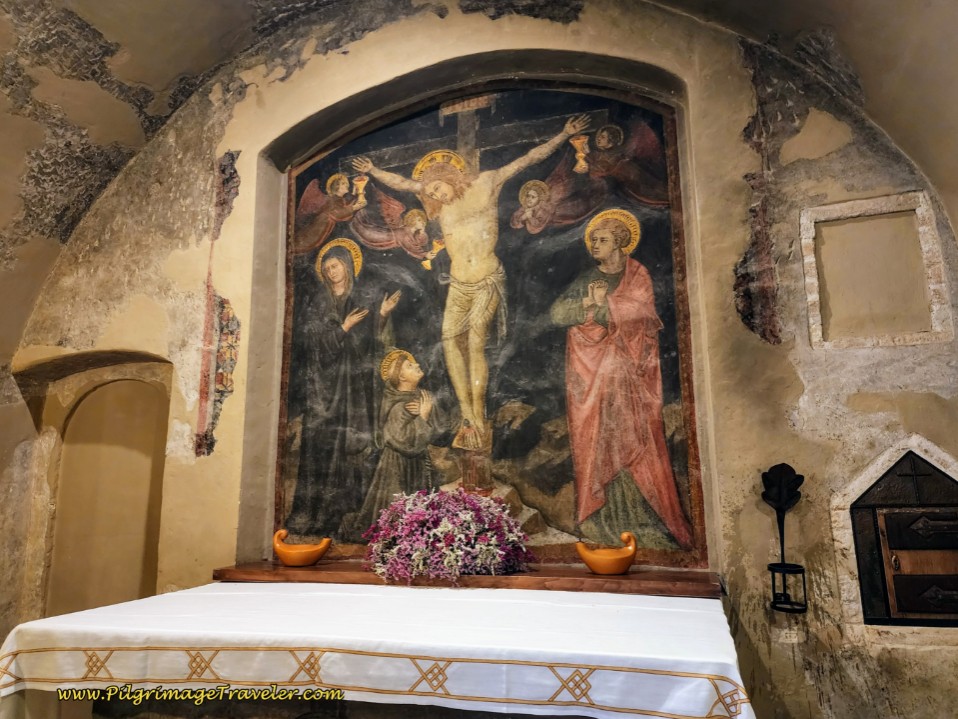 Altar, Oratorio di Santa Maria, Eremo delle Carceri
Altar, Oratorio di Santa Maria, Eremo delle CarceriAs you follow the tour route, you descend a stairway, where the corridor is quite narrow. It leads you to the entrance of the Cave of St. Francis, shown below. I have no picture of the cave itself as the corridor leading to it is dark and narrow. You must navigate through this corridor with your backpack - a bit of a tricky proposition.
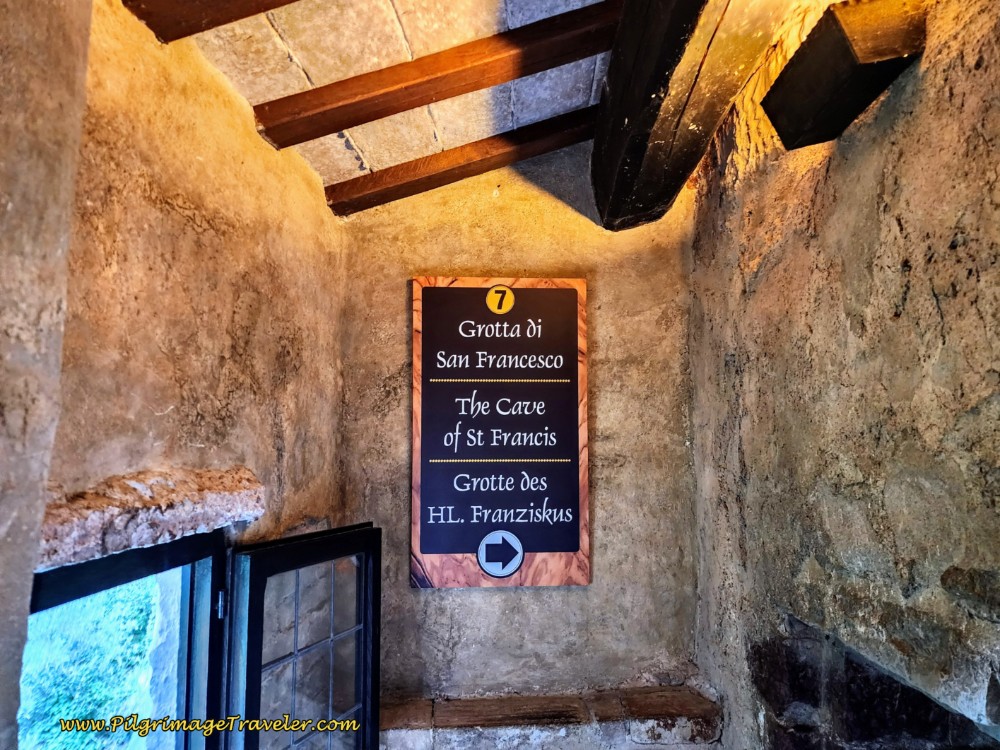 Cave Entrance, where St. Francis Meditated
Cave Entrance, where St. Francis MeditatedWhen you complete your inside tour, take a few moments to also look at the grounds. Here is a view of the entire sanctuary from the outside. It is incredibly striking, built into the hillside.
As you follow the exit signs there are convenient toilets and a water fountain. But if you have some more time, the gardens and the sacred woods to the east of the buildings are wonderful and are much more serene! I would have loved to linger longer.
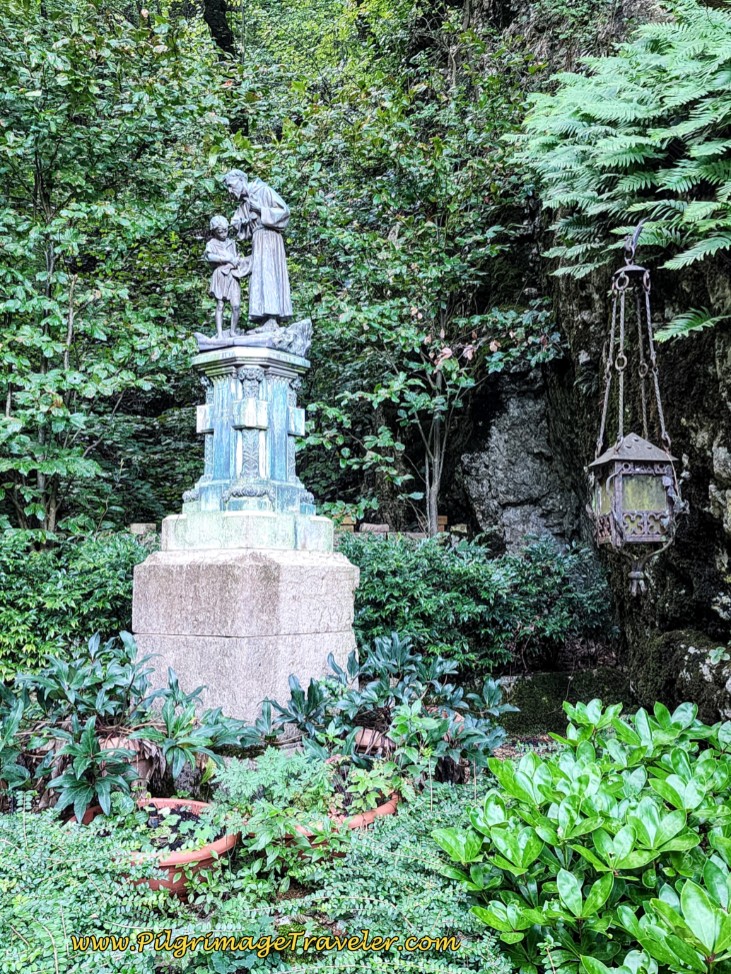 Gardens, Eremo delle Carceri
Gardens, Eremo delle CarceriAfter visiting the hermitage, continue along the Via Eremo delle Carceri, following the low-walled road as it gently climbs.
Follow it around a large bend for a southward direction, shown below. There are frequent picnic tables along the road.
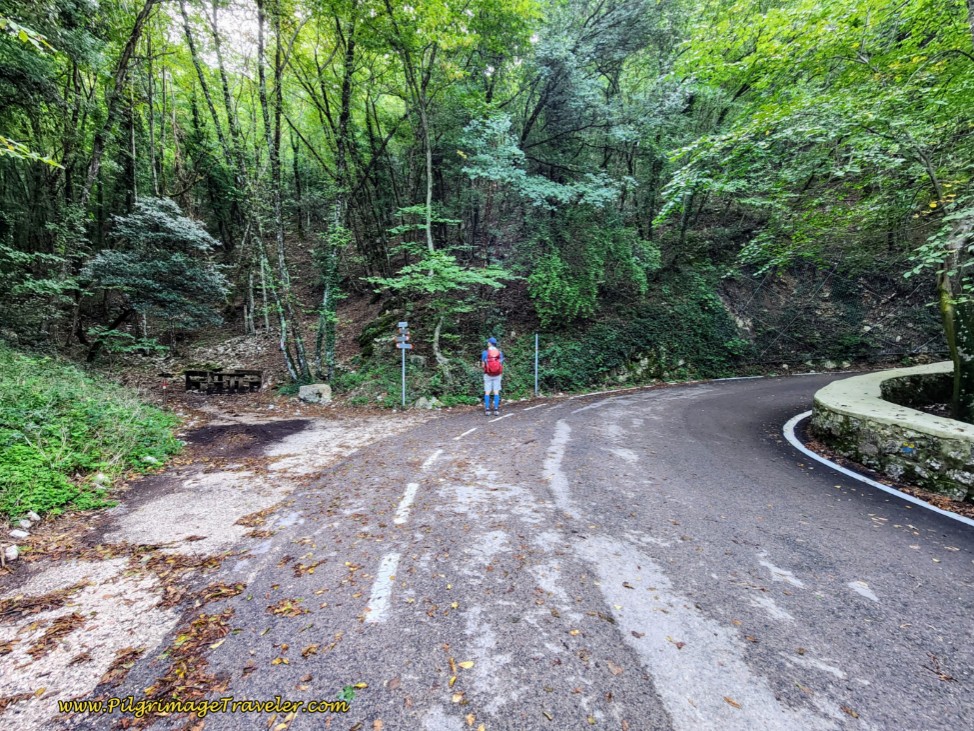 Along the Via Eremo delle Carceri
Along the Via Eremo delle CarceriContinue until you come to this prominent trailhead, shown below, after about 5.5 kilometers total into day eleven. The Via di Francesco turns left here to go up Monte Subasio.
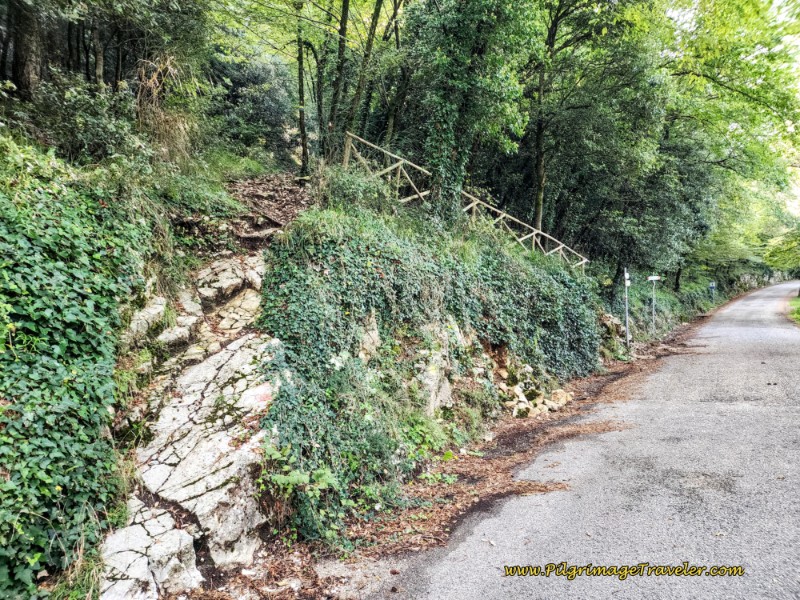 Leave the Roadway of the Via Eremo delle Carceri Here
Leave the Roadway of the Via Eremo delle Carceri HereThe rocky trail now climbs steeply again, through the forest. As you reach the treeline, the views open up everywhere!
When you are above the treeline, look up ahead to see a rocky ridge above you. This is the top of the Sasso Piano, the "Flat Rock" at the top with a cross. The top of this ridge is your next destination.
Below is a photo of a look-back, almost at the top of the climb, to the ridgetop to the right, and the trail walking under it as it switchbacks up. The view is of Assisi and the plain below.
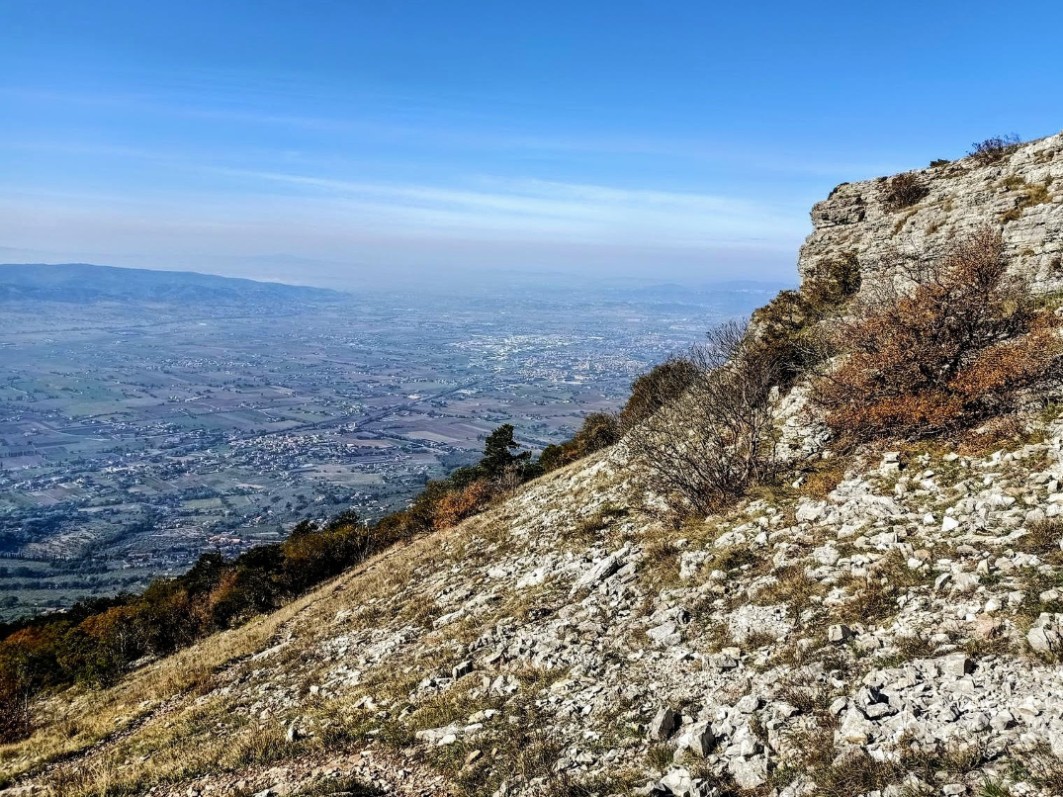 A Look Back at the Trail Under the Ridgetop
A Look Back at the Trail Under the RidgetopAs you continue the climb, a signed waymark appears above you and a rough-looking cross to the right. This is the top of the "official" climb along the Way after 6.5 kilometers total, shown below. The sign says it is 2.8 kilometers to your next destination, the Fonte Bregno.
When you arrive here at the top of the climb by the sign in the photo below, you have a choice. The route continues to the right to pass the rough, wooden cross and onward.
Or you can turn left for the short walk of less than 200 meters and a small climb to the Sasso Piano, where you can see another cross in the distance. This cross is just visible along the skyline in the photo below.
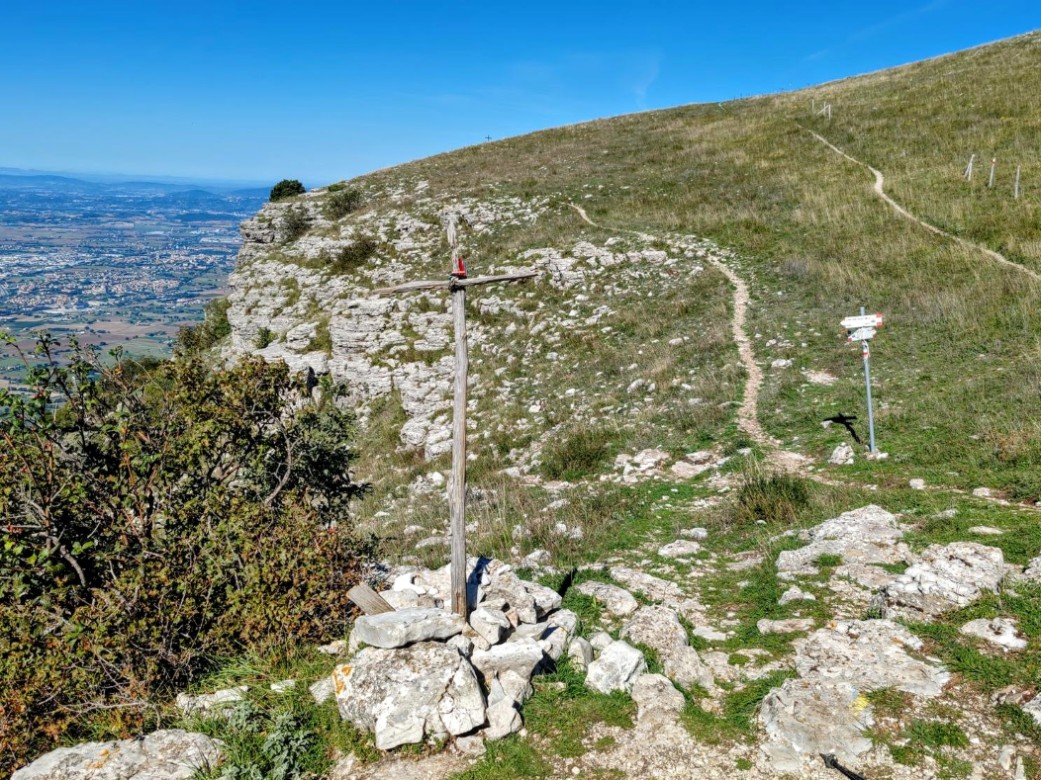 Look Toward the Sasso Piano
Look Toward the Sasso PianoBelow is the Cross at the Sasso Piano and the wide-open views below. The climbing for the day is now over!
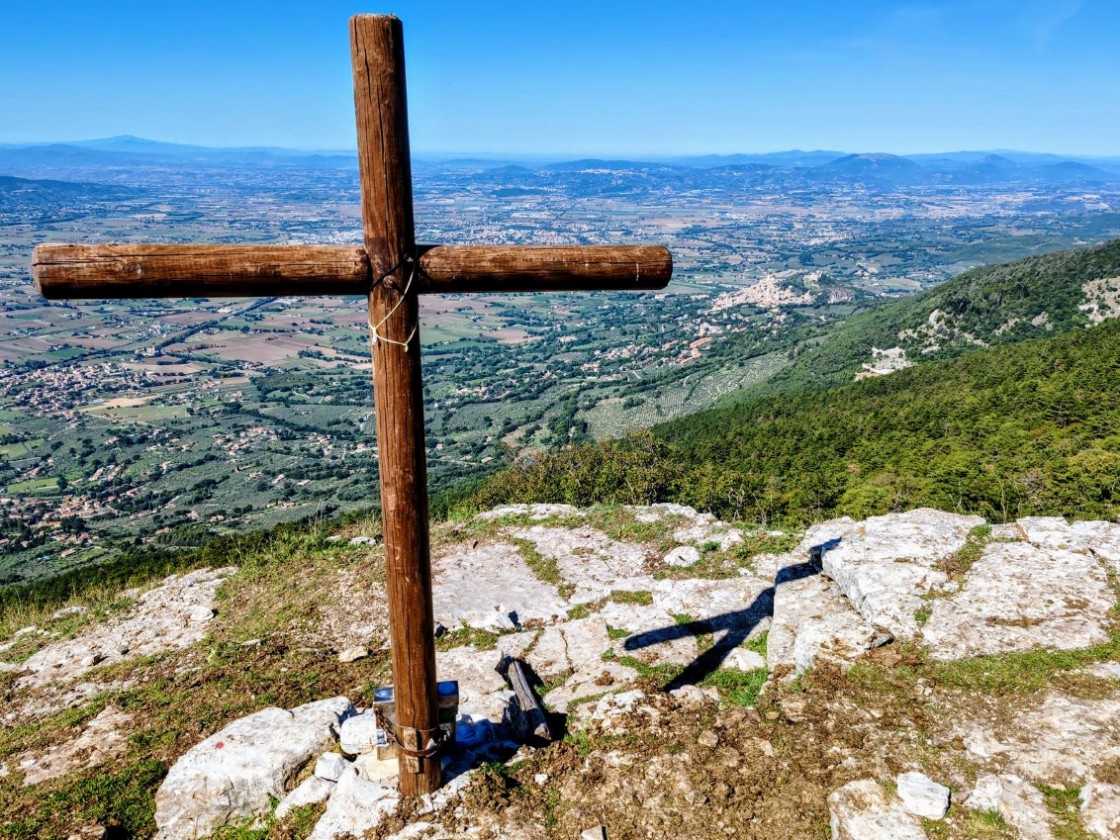 Cross at the Sasso Piano
Cross at the Sasso PianoIf you stay a bit higher on the upper route to the Sasso Piano, you will see the best views, from just above the cross, like below. While this is not the tippy-top of Monte Subasio, the views are sufficient to be satisfied here!
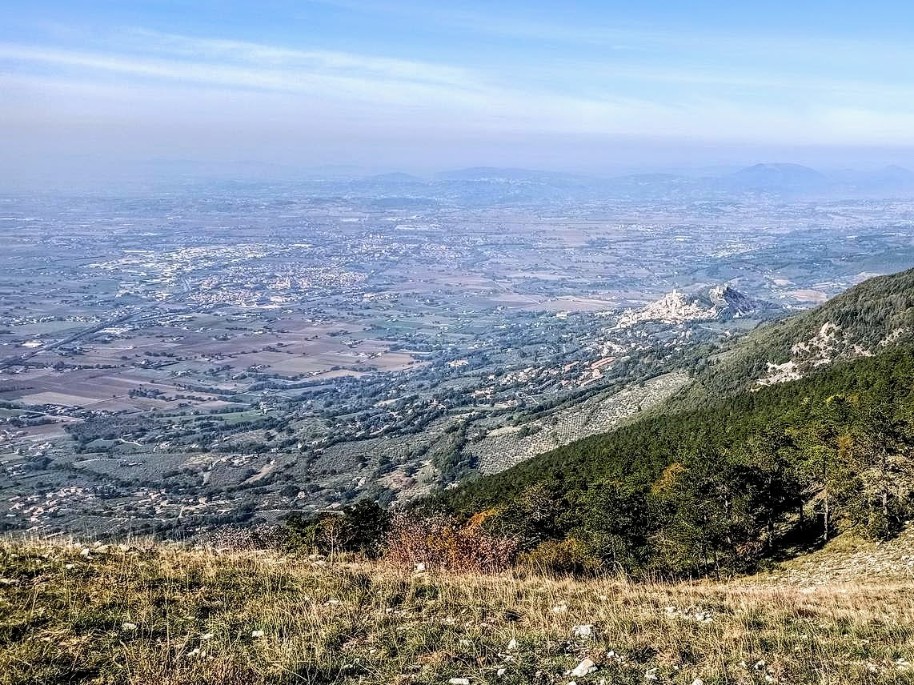 Sasso Piano Viewpoint at the High Point of the Way of St. Francis from Assisi to Spello
Sasso Piano Viewpoint at the High Point of the Way of St. Francis from Assisi to SpelloAfter you return from the Sasso Piano viewpoint, continue along the trail, following the signs, on a descending traverse across the mountain, skirting along the treeline for the next 2.5 kilometers. It is an easier, alpine walk.
For the final 1/4 kilometer towards the Fonte Bregno, turn right at a Y-intersection and drop more steeply again, into the forest on the trail. Come to an intersection with a wider road and turn left.
Arrive first at the Rifugio Fonte Bregno after approximately 9.6 kilometers into the day. From the looks of this small building, that was locked up tight, it is a rifugio in name only.
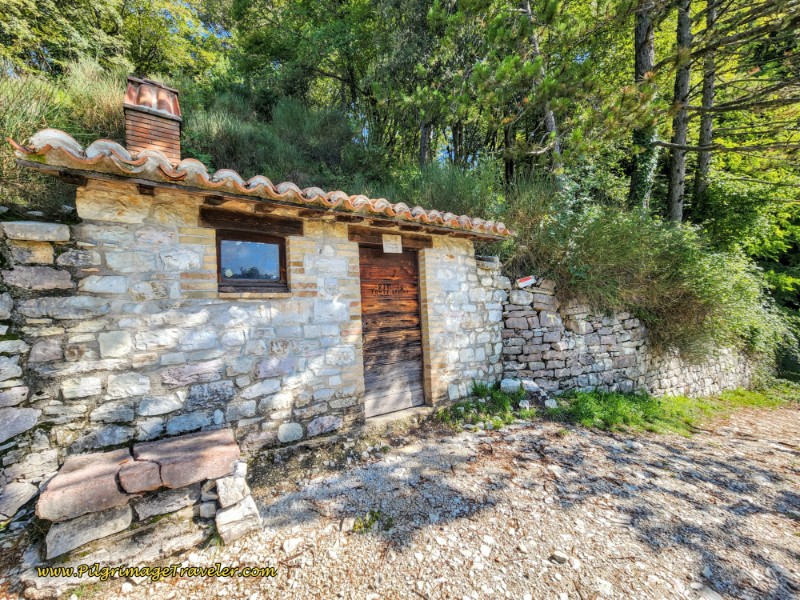 Rifugio Fonte Bregno
Rifugio Fonte BregnoA few meters beyond the Rifugio is the Fonte Bregno itself. This historic fountain is in rather poor shape and not only is the flow of water limited, I would definitely not trust its potability.
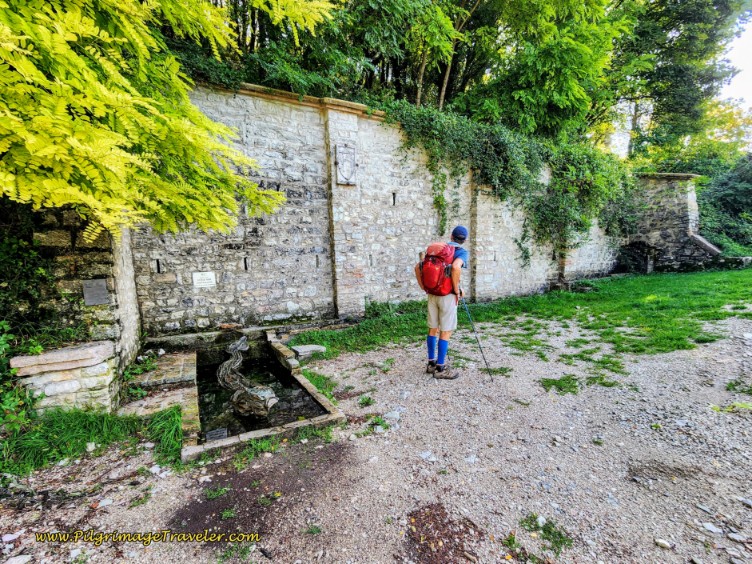 Rich at the Fonte Bregno
Rich at the Fonte BregnoImmediately after the fountain, look for the signs leading to the right onto a narrow, somewhat overgrown path that leaves the gravel road. Spello is only 5.7 kilometers from here.
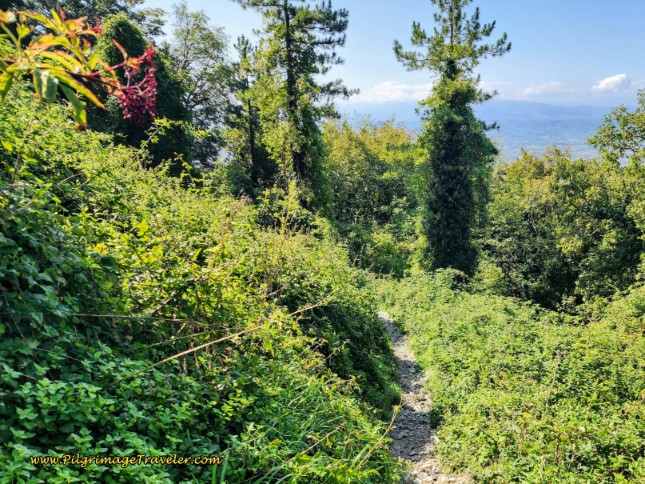 Narrow Path Back Into the Forest
Narrow Path Back Into the ForestThe trail forward is quite steep and can be slick if it is wet.
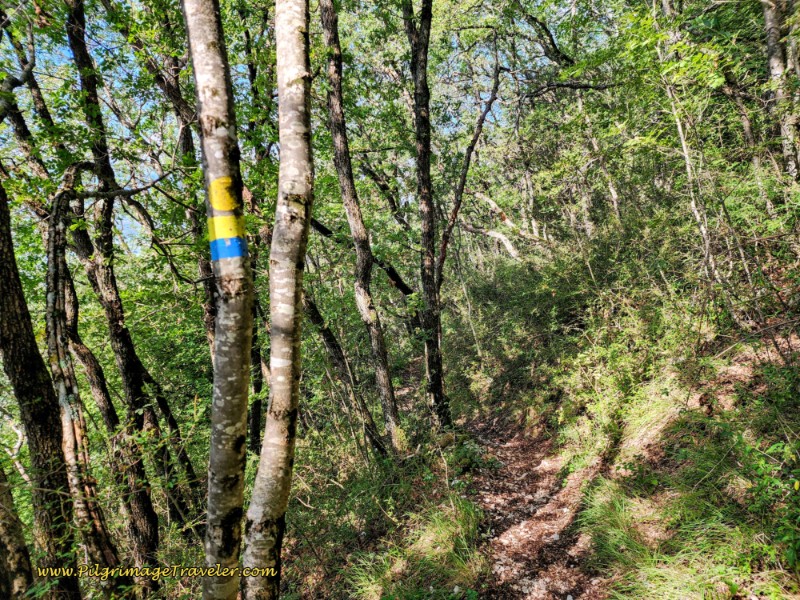 Forest Path Down the Mountain
Forest Path Down the MountainAfter about 1.3 kilometers of descent from the fountain, you will come to an intersection with a sign for the 356 trail. Do not take it but you need to stay straight as the sign below indicates. Spello is 4.4 kilometers away.
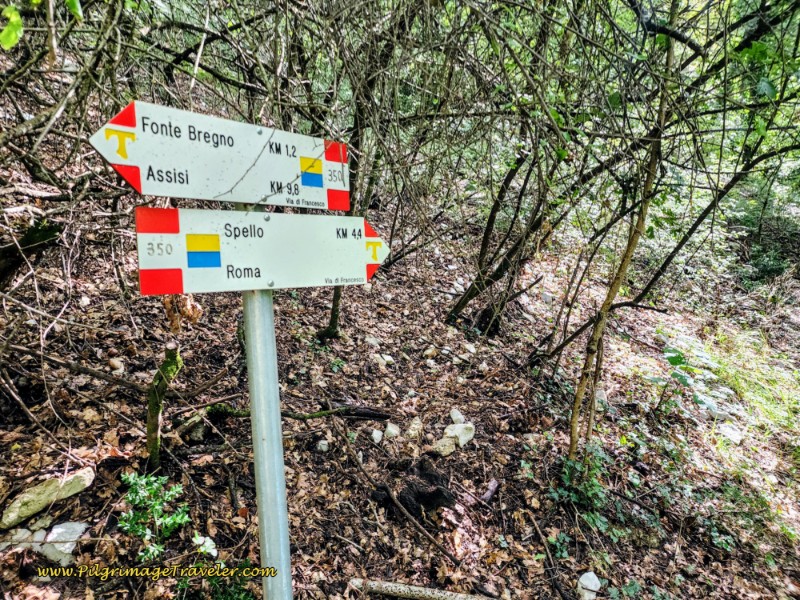 Signpost: Spello 4.4 Kilometers Away
Signpost: Spello 4.4 Kilometers AwayA few steps later pass by another familiar Parco del Monte Subasio sign at a large bend to the right. Cross a drainage. Climb up a bit out of the drainage, continuing to follow the blue and yellow painted waymarks.
Soon after the bend the 356 splits to the left at a fenceline, but stay straight again. Follow the Tau waymarks.
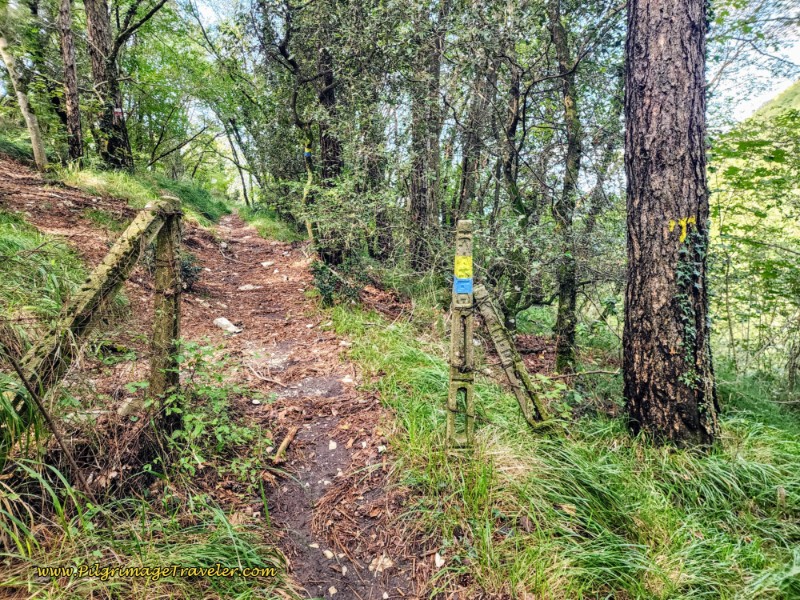 Keep Straight, Through Fenceline
Keep Straight, Through FencelineAfter another large bend in the trail to the right, that crosses a second drainage, you will climb up to a T-intersection with a nice, wider gravel road. This intersection is after about 11.8 kilometers into day eleven.
Turn to the right and continue along this wider, easier road for the entire remainder of the stage into Spello.
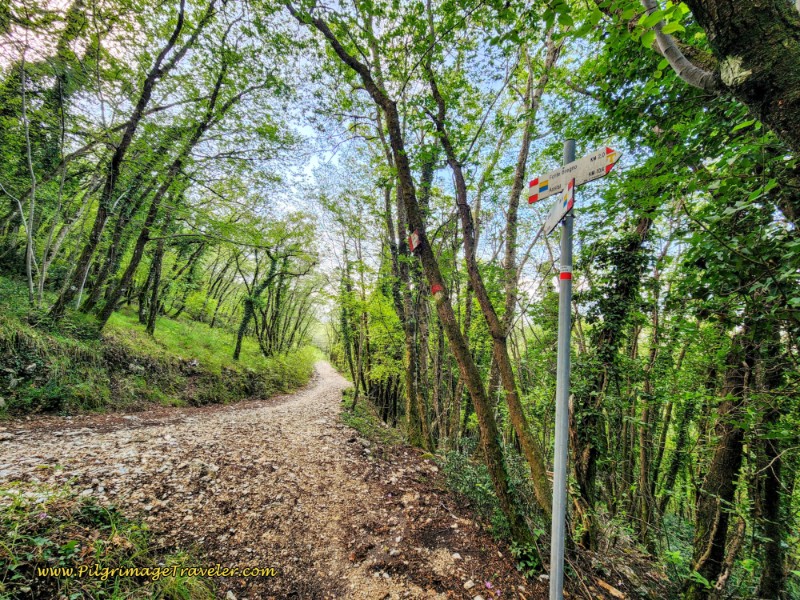 Join Gravel Road at T-Intersection
Join Gravel Road at T-IntersectionThe wildflowers were still lovely along this section, including these wonderful Cyclomen. I never knew this flower grew wild!
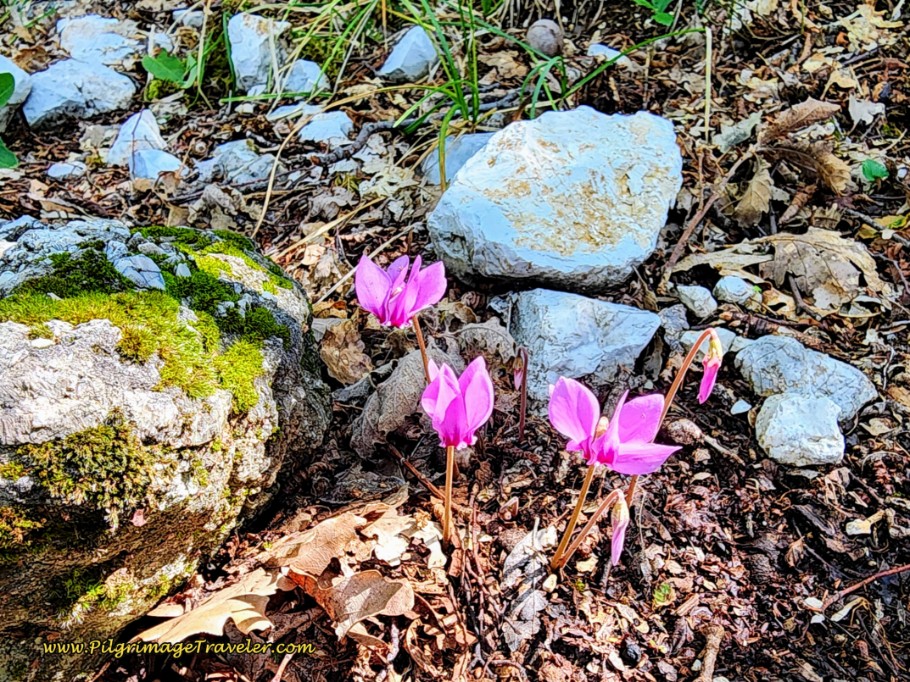 Wild Cyclamen
Wild CyclamenAfter approximately 12.6 kilometers total, come to an open area and a crossroads. Stay straight. There are information boards about the reforestation in the area. The signs say there are 2.8 kilometers left to Spello.
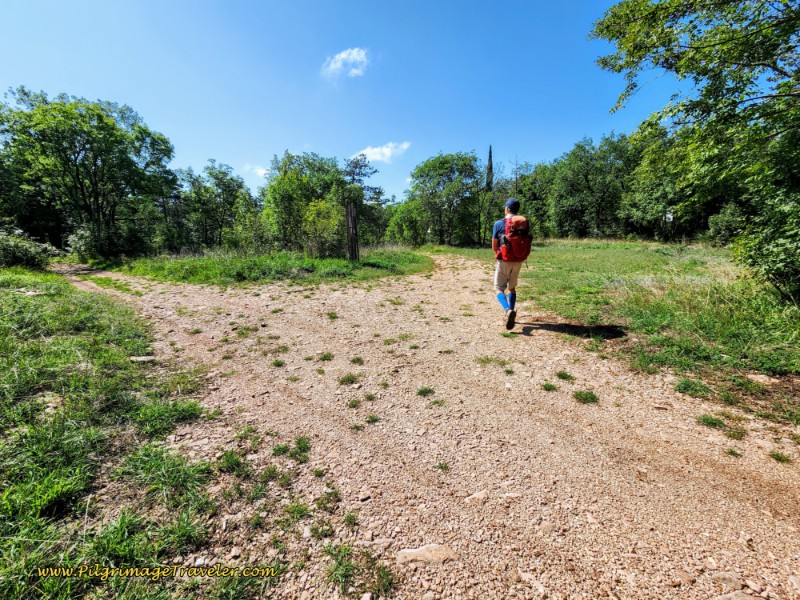 Stay Straight at Open Crossroads
Stay Straight at Open CrossroadsEven though you are on a wider lane, the very steep descent continues! As you descend, the forest becomes less dense, and you sense the views of the plains that are to come.
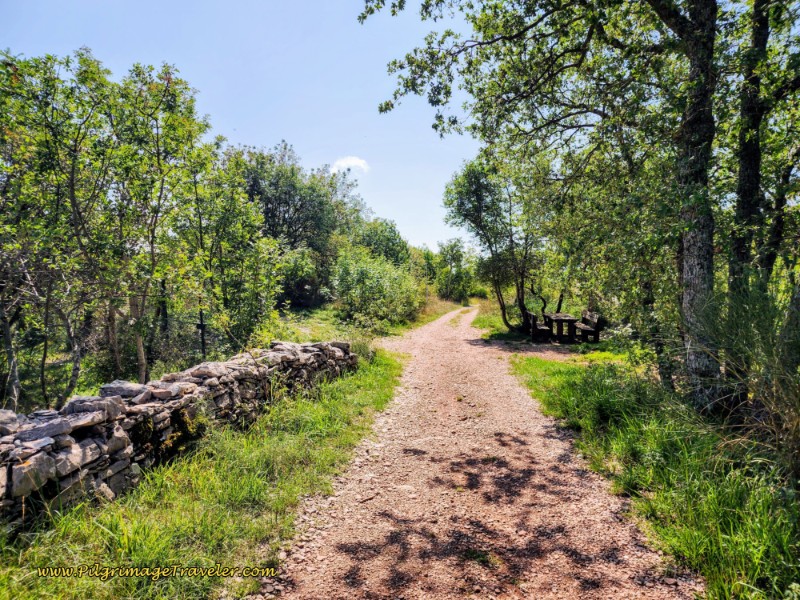 Forest Opens, along the Way of St. Francis from Assisi to Spello
Forest Opens, along the Way of St. Francis from Assisi to SpelloLess than two kilometers from Spello the views of it appear before you in the plains below! It was a wonderful sight!
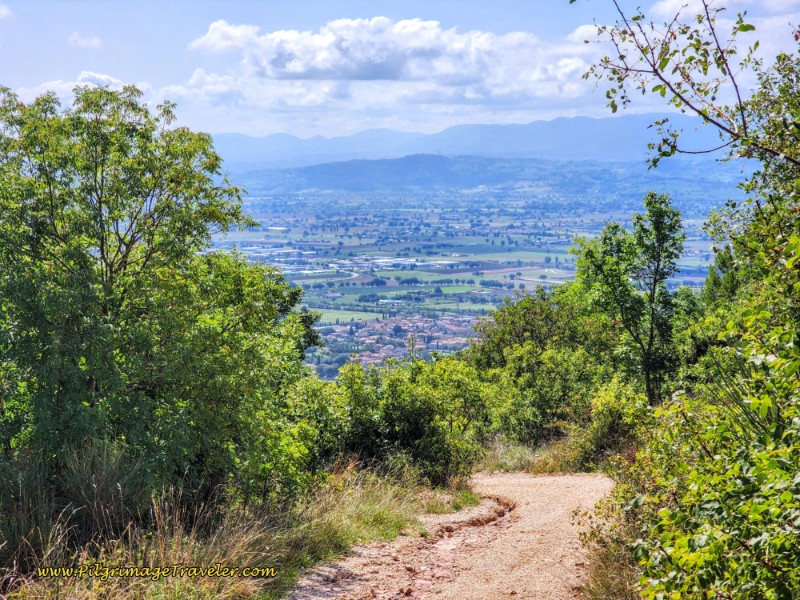 Ahead is Spello, Coming into Focus in the Distance
Ahead is Spello, Coming into Focus in the DistanceAfter 13.7 kilometers total, come to yet another crossroads with more information boards and go straight again. The signs announce that Spello is 1.7 kilometers away.
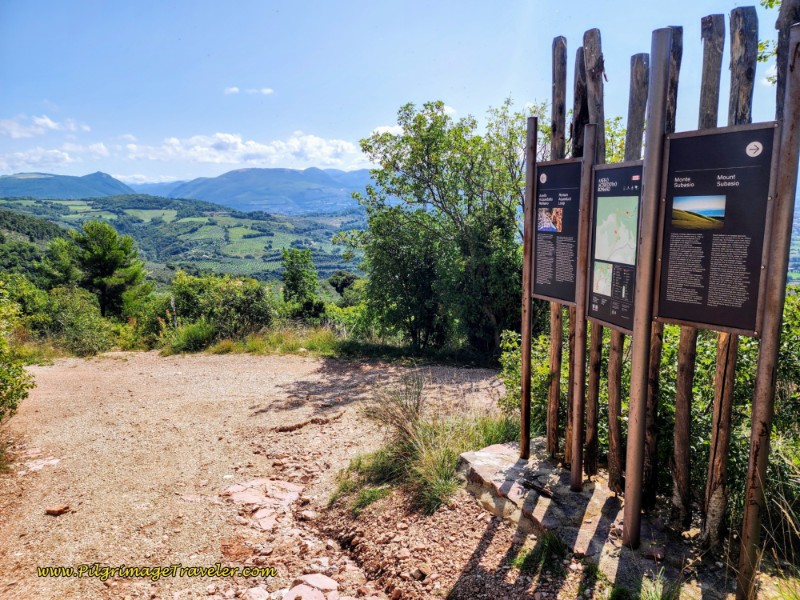 Straight Onwards at More Information Boards
Straight Onwards at More Information BoardsContinue steeply down this gravel road, walking through many groves of olive trees as Spello appears ever closer ahead.
The closer you get to Spello, the nicer the gravel road becomes until it lends itself to the pavement, just before you join the SP249.
A few meters after the right turn onto the SP249, arrive at a T-intersection with the Via Poeta. This is where the alternative route joins the Monte Subasio route.
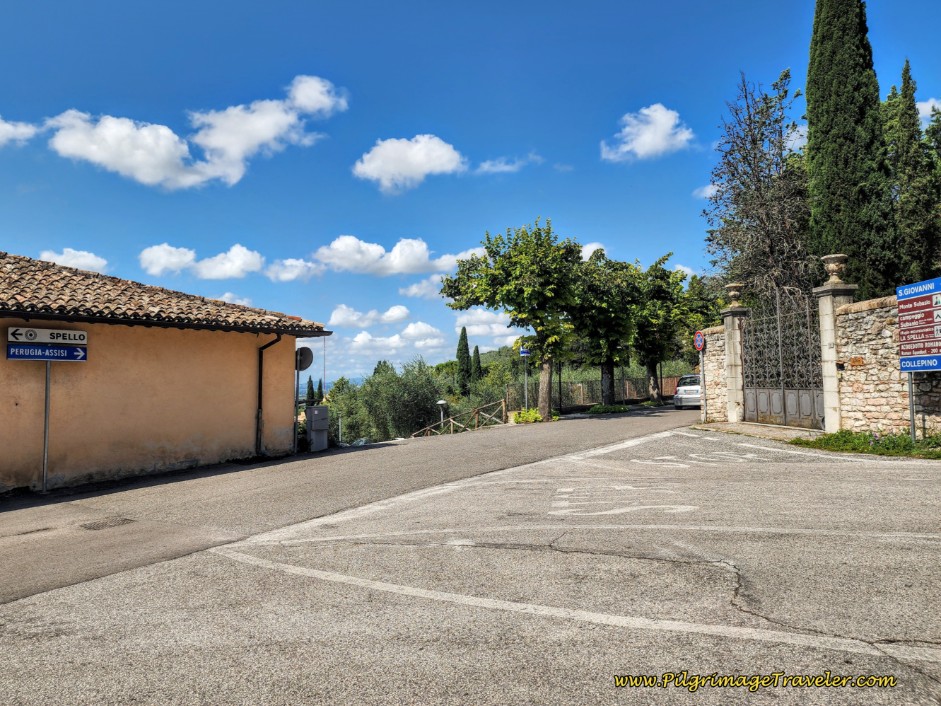 Lower Alternative Route Joins the Monte Subasio Route Here at This Intersection
Lower Alternative Route Joins the Monte Subasio Route Here at This IntersectionTurn left onto the Via Poeta and a few steps later, walk through the Roman gate to the city, the Porta Montanara.
After entering the city gate, pass a wonderful park on your left, continuing to an open plaza, called the Piazza Vallegloria. Turn left in the plaza, walking through an archway and bending around to walk on the Via Giulia. There is a yellow and blue waymark painted on a pole just before the archway that is difficult to see! After that, we saw no more guiding waymarks through Spello.
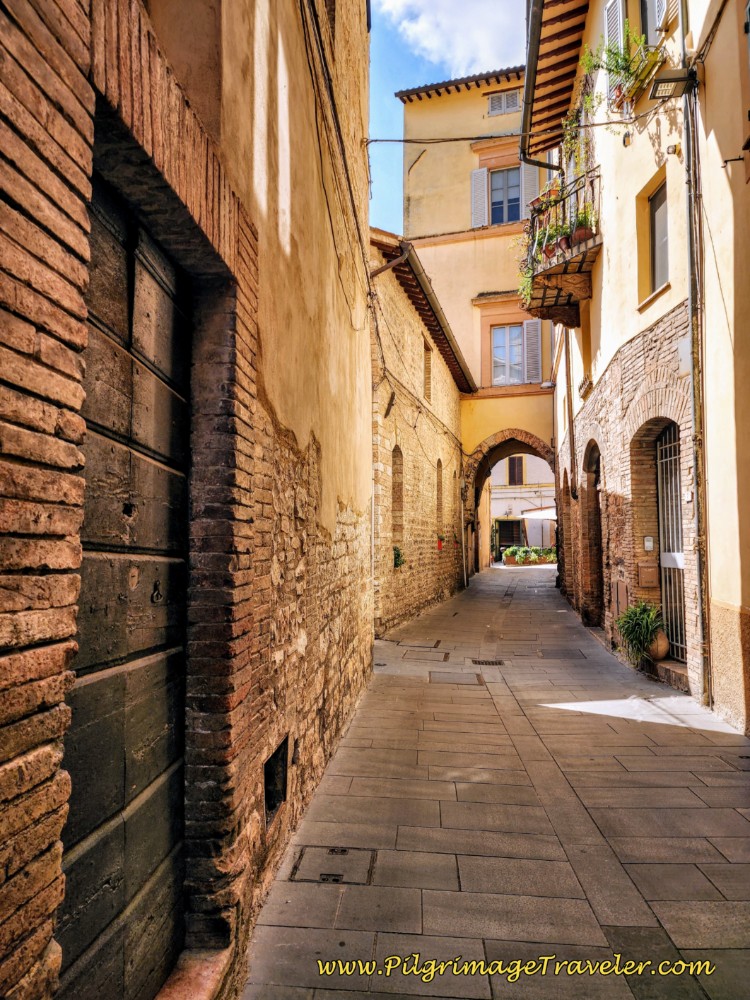 Archway Along the Via Giulia
Archway Along the Via GiuliaRemain walking on the Via Giulia for about one-third kilometer, until you come to a T-intersection. Turn left, onto the main street, the Via Giuseppe Garibaldi.
After turning left onto the Via Giuseppe Garibaldi, the first historic site immediately on your left is the 12th century Collegiata di San Lorenzo, not pictured. We stepped inside for a look.
The 17th century altar is reminiscent of St. Peter's in Rome. If you've been to St. Peter's you will recognize the style. There are also some 15th - 17th century frescoes that have survived.
Continuing along the main street, you will soon come to the main square of Spello, the Piazza della Repubblica. It is a bustling place over the lunch hour.
The next church of interest is the 12th century Chiesa di Sant'Andrea, shown in the next photos, which according to tradition was given to St. Andrew by St. Francis himself. There are several notable frescoes, including a 14th century crucifix panel on the high altar, created by an unknown artist.
 Chiesa di Sant'Andrea
Chiesa di Sant'Andrea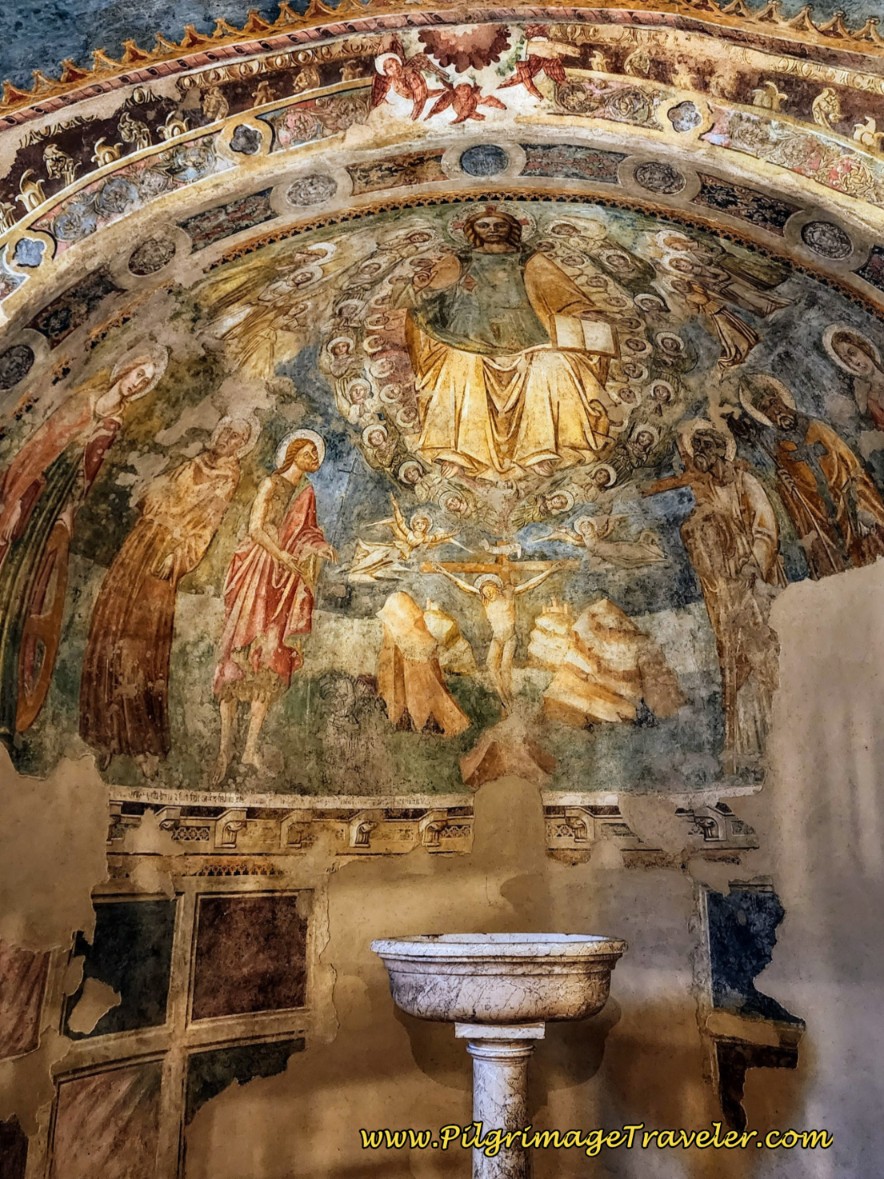 Chiesa di Sant'Andrea Crucifix Panel
Chiesa di Sant'Andrea Crucifix PanelThe icing on the cake of Spello is the Chiesa di Santa Maria Maggiore and its chapel, the Cappella Baglioni. The 16th century chapel is widely renowned for its vibrant frescoes by Pinturicchio, a master painter of the time. These Baglioni frescoes are considered to be Pinturicchio's finest works. To tour the chapel you may need a reservation for the interpretative audio tour. It costs only a few Euros.
For more information, click the links. Alas, I have no photos because the entire complex was closed when we arrived on a Saturday! The town was setting up the Naval Military Band to play in the plaza in front of the church that night! I was so utterly disappointed. But I suppose listening to the military band was not a horrible trade-off.
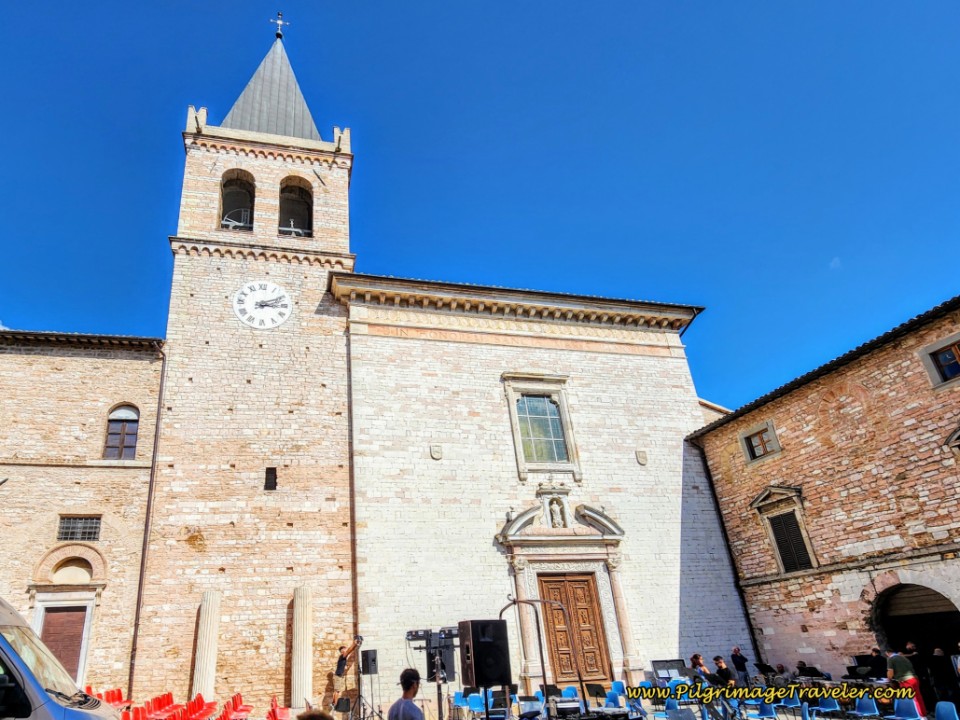 Chiesa di Santa Maria Maggiore
Chiesa di Santa Maria MaggioreTo conclude day eleven of the Way of St. Francis from Assisi to Spello, I will continue describing the walk past the Santa Maria Maggiore church and plaza and onward where the street is named the Via Consolare. It is a quaint walk, along the gray brick road! You can see the tourist shops and cafés that line the street.
Our pilgrimage day ends on the south side of the old town at the Roman gate called the Porta Consolare. Here is a photo of how it looks when you walk through it from the center of town.
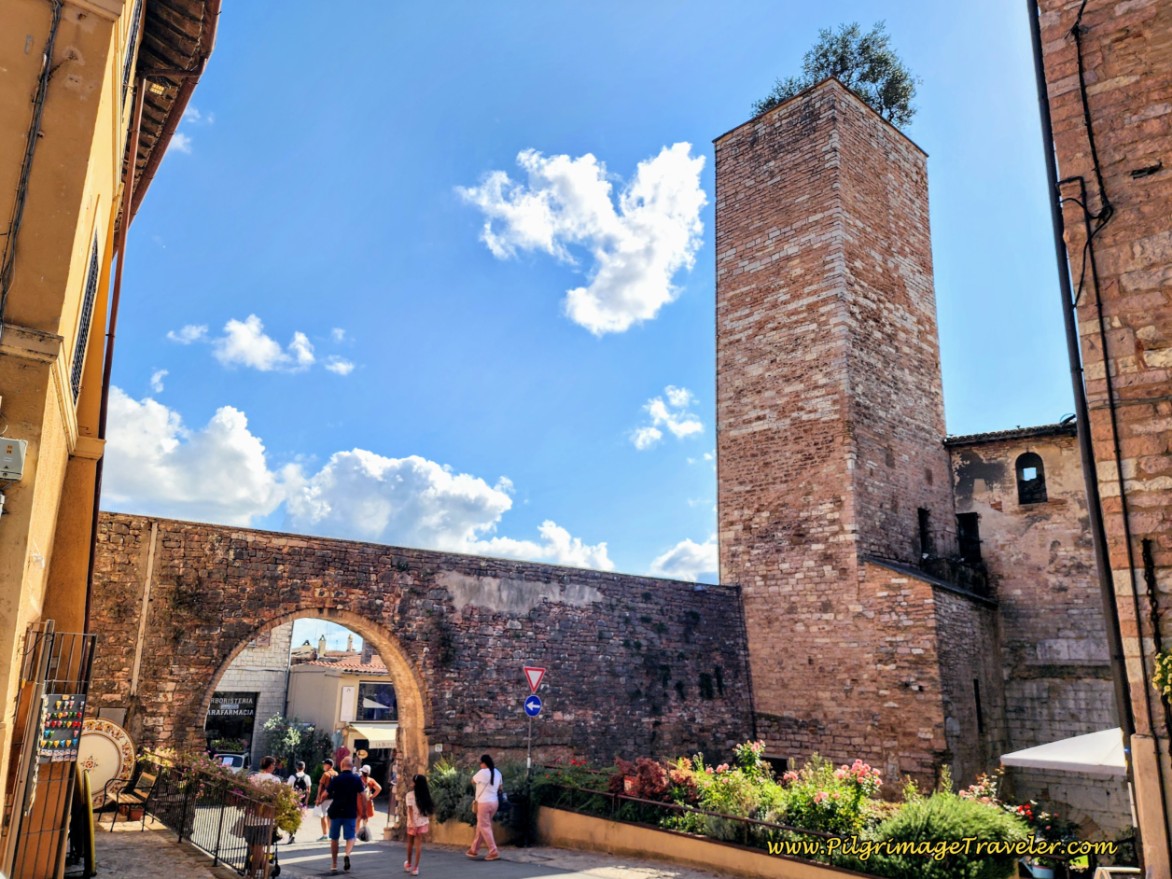 Porta Consolare, 1st Century Roman Gate
Porta Consolare, 1st Century Roman GateHere is how the impressive Porta Consolare looks from the other side, the southern side. In this plaza just outside the gate, the Piazza Kennedy, is another popular hang-out with bars and shops.
Of special note: on the northwest of town is the Roman gate, the Porta di Venere, or Venus' Gate, a short walk from the center. There was so much construction going on in the area that I got distracted and forgot to see it. I do not have a photo of it. Click on the link to see it, it looks extraordinary. Another thing that left me very disappointed.
And finally, I leave you with another wonderful site, the very interesting Roman villa, the Villa dei Mosaici di Spello. This 4th century Roman villa was recently discovered during a road construction project and has beautifully preserved mosaic floors, all in situ. Below is one of the best mosaics that is displayed in the museum.
The entrance fee is a bit pricey, but worth it if you love antiquities.
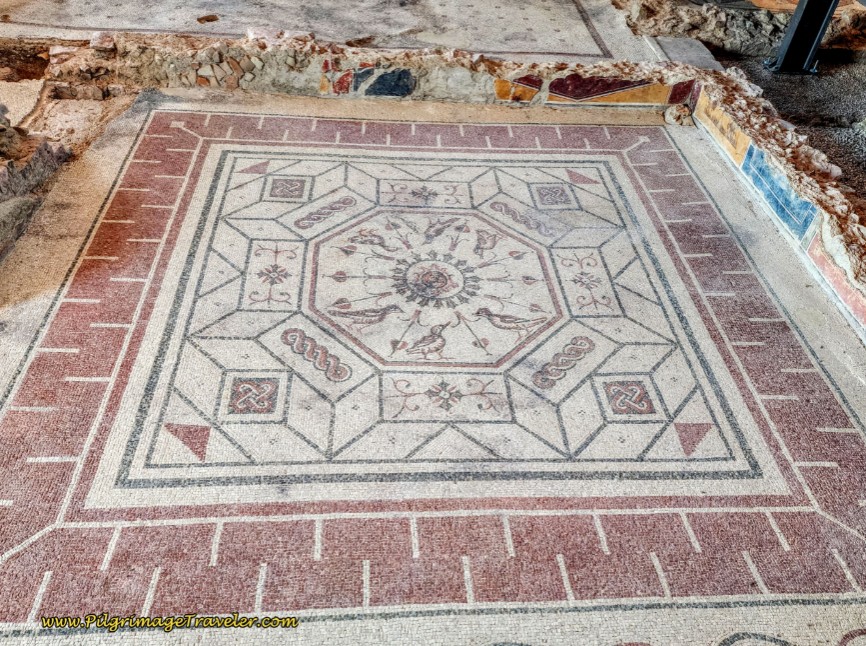 Villa dei Mosaici di Spello
Villa dei Mosaici di SpelloAccommodations in Spello
There are two pilgrim accommodations in Spello, the first is in the dead center of town, across from the Santa Maria Maggiore church. It is in the monastery, the Monastero Delle Agostiniane S. Maria Maddalena, +39 0742 302259.
The second pilgrim accommodation is the Suore Francescane Missionarie del Cuore Immacolato di Maria (+39 0742 651182). This convent is about two-thirds kilometer off-route to the northwest of town.
There are several other accommodations scattered across town that are more economical than most. The first you will walk by is the Fratello Sole B&B on the north side of town.
The rest are closer to the center, check the interactive map for their exact location. Or use this Spello Booking.com link to find the current deals of the day. These deals are always changing.
I can highly recommend the accommodation where we stayed, near the center of town near the Venus Gate, with self check-in, the Residenza Frenguelli. They have perhaps the most comfortable beds I have ever slept in.
Reflections, The Way of St. Francis, Assisi to Spello
All-in-all for me, the climbing on this day was not as bad as I feared. Because it is a short stage in kilometers, we could take our time at the Eremo di Carceri, take lots of breaks, contemplate the views and generally just slow down and enjoy the walk.
I tried to stay focused on St. Francis, but on this day, I was unable to quiet my mind as much as I would have liked. The soaring views, however, really helped me personally find some Peace if only for a few moments.
But the Eremo was just too crowded with people for any type of meaningful reflection there. I felt like just another tourist. And so it was.
The tour of Spello in the late afternoon, to end the day, was incredible, and I was very happy to have made the choice I did to stay here for the night!
Salutation
May your own Way of St. Francis from Assisi to Spello on day eleven be full of perseverence, to bring success to all your effort! And may you ride on the wings of St. Francis the whole journey! Ultreia!
Way of St. Francis EBook Guides
Walk smarter with our ad-free, beautifully formatted Way of St. Francis eBook Guides, in PDF format ~ perfect for offline use in mountainous and remote areas along this Way. Includes daily stage details, alternative routes and stunning photos. Our eBook Guide is unique because we also immerse you with our story.
Don't carry a heavy paper book, but use our digital eBooks on your mobile device instead! You can walk with clarity and confidence, deeply connect to nature, following in the footsteps of St. Francis, through the Italian countryside!
📲 Instant download. 💸 Money-back guarantee. 🔄 Free updates for 1 year.
👉 Click here for more information! OR BUY NOW ~ Northern Route: La Verna to Assisi, OR BUY NOW ~ Southern Route: Assisi to Rome. OR BUY BOTH HERE
Way of St. Francis Stages
Northern Route, Via del Nord ~ La Verna to Assisi
Southern Route, Via del Sud ~ Assisi to Rome
Please Consider Showing Your Support
Many readers contact me, Elle, to thank me for all the time and care that I have spent creating this informative website. If you have been truly blessed by my efforts, have not purchased an eBook, yet wish to contribute, I am exeedingly grateful. Thank you!
Search This Website:
🙋♀️ Why Trust Us at the Pilgrimage Traveler?

We’re not a travel agency ~ we’re fellow pilgrims! (See About Us)
We've trekked Pilgrimage Routes Across Europe since 2014!
💬 We’ve:
- Gotten lost so you don’t have to. 😉
- Followed waymarks in the glowing sunlight, the pouring rain and by moonlight. ☀️🌧️🌙
- Slept in albergues, hostels & casa rurals. Ate and drank in cafés along the way. 🛌 😴
- Created comprehensive and downloadable GPS maps and eBook Guides, full of must-have information based on real pilgrimage travels. 🧭 🗺️
- Shared our complete journeys, step by step to help YOU plan your ultimate pilgrimage and walk with your own Heart and Soul. 💙✨
Every detail is from our own experiences. Just fellow pilgrims sharing the Way. We have added a touch of spirituality, heartfelt insights and practical guidance from the road ~ offering a genuine connection to the spirit of pilgrimage. Tap into the wisdom of seasoned pilgrims!
Ultreia and Safe Pilgrimage Travels, Caminante! 💫 💚 🤍
Follow Me on Pinterest:
Find the Pilgrimage Traveler on Facebook:
Shroud Yourself in Mystery, along the Via de Francesco!
Walk in the Footsteps of St. Francis, and Connect Deeply with the Saint and to Nature in the Marvelous Italian Countryside!
Need suggestions on what to pack for your next pilgrimage? Click Here or on the photo below!
Find the Best Hotel Deals Using This Tool!
Carbon Trekking Poles ~ My Favorites!
Carbon fiber construction (not aluminum) in a trekking pole makes them ultra lightweight. We like the Z-Pole style from Black Diamond so we can hide our poles in our pack from potential thieves before getting to our albergue! There are many to choose from! (See more of our gear recommendations! )
Gregory BackPack ~ My Favorite Brand
Do not forget your quick-dry microfiber towel!


